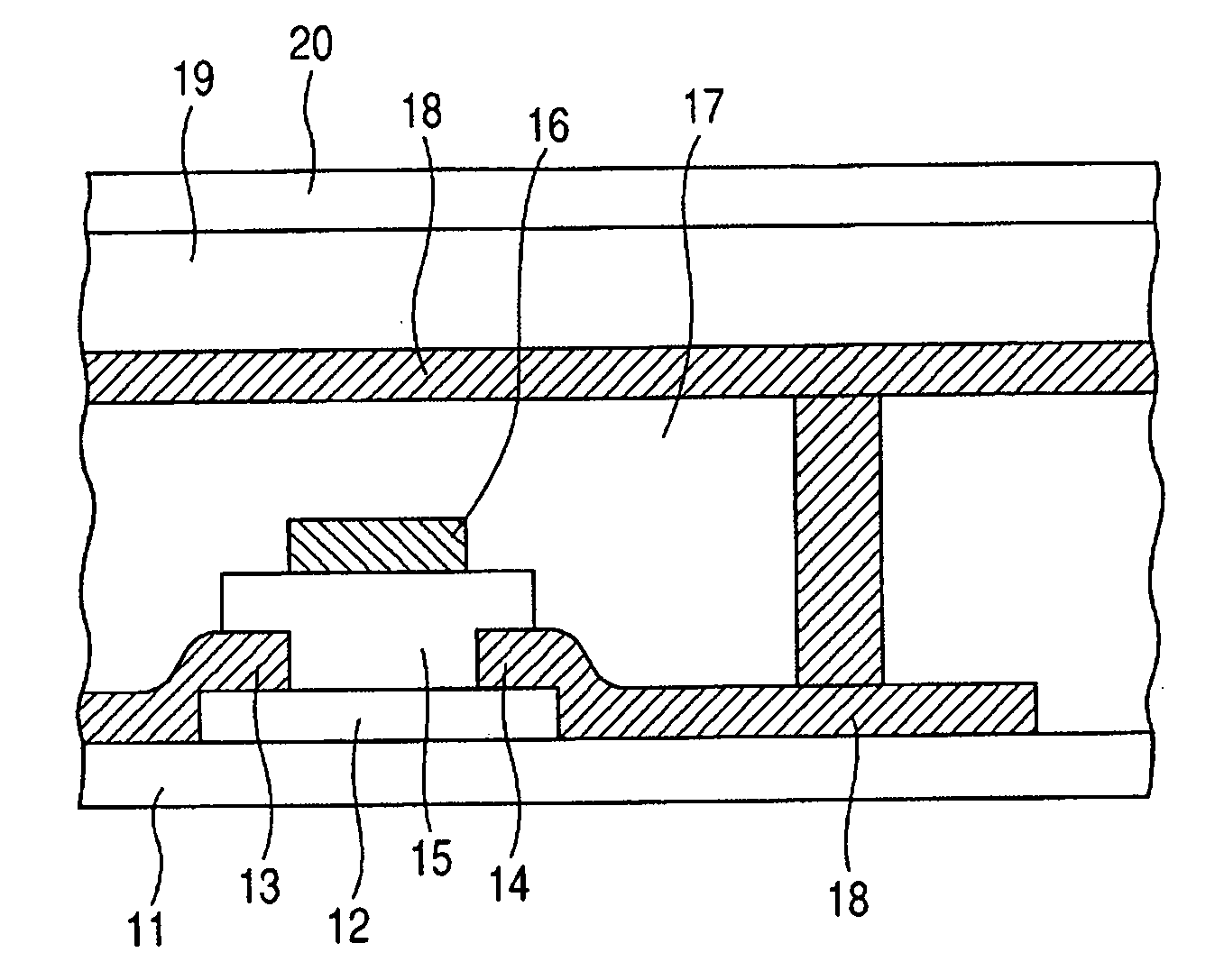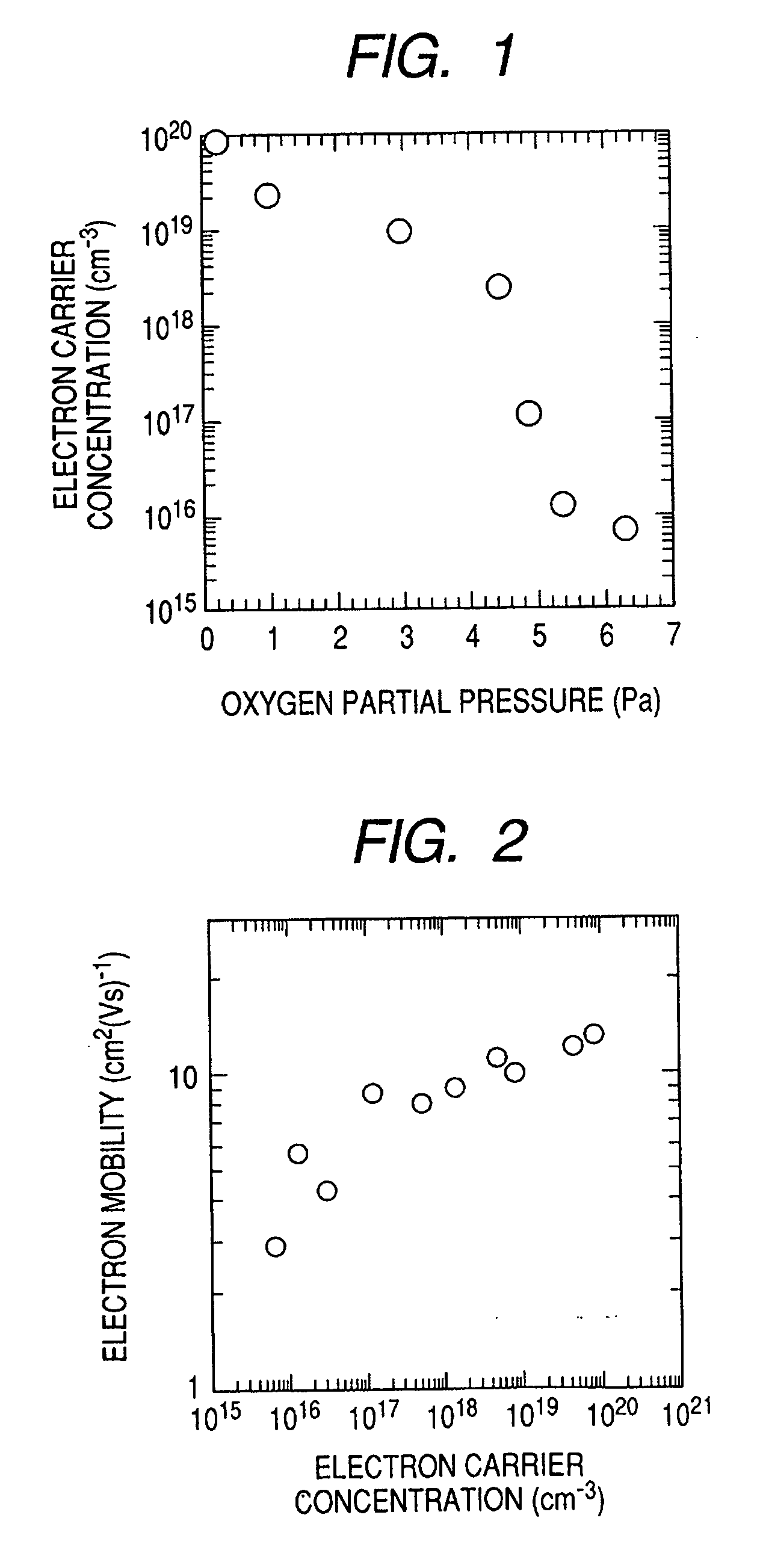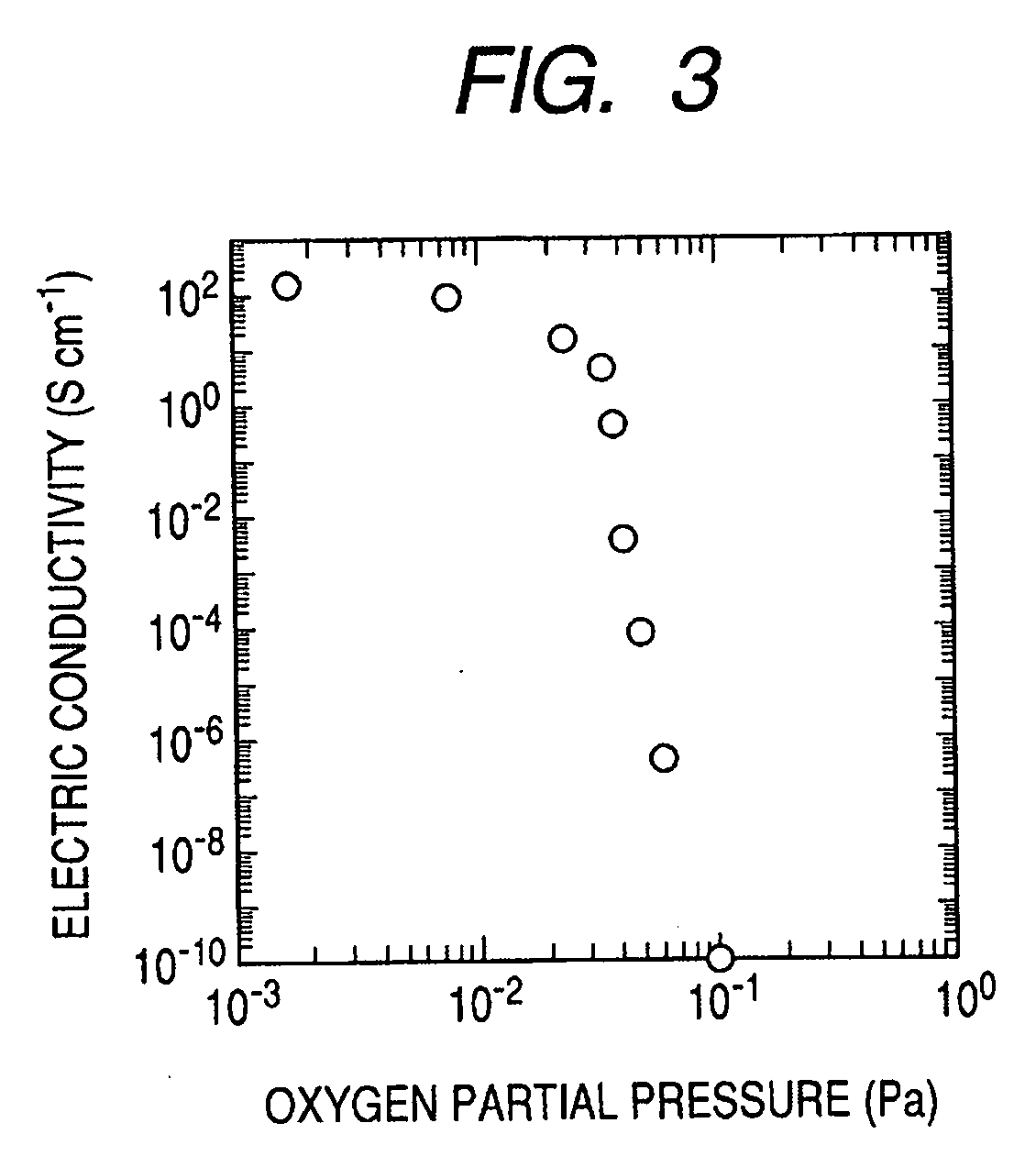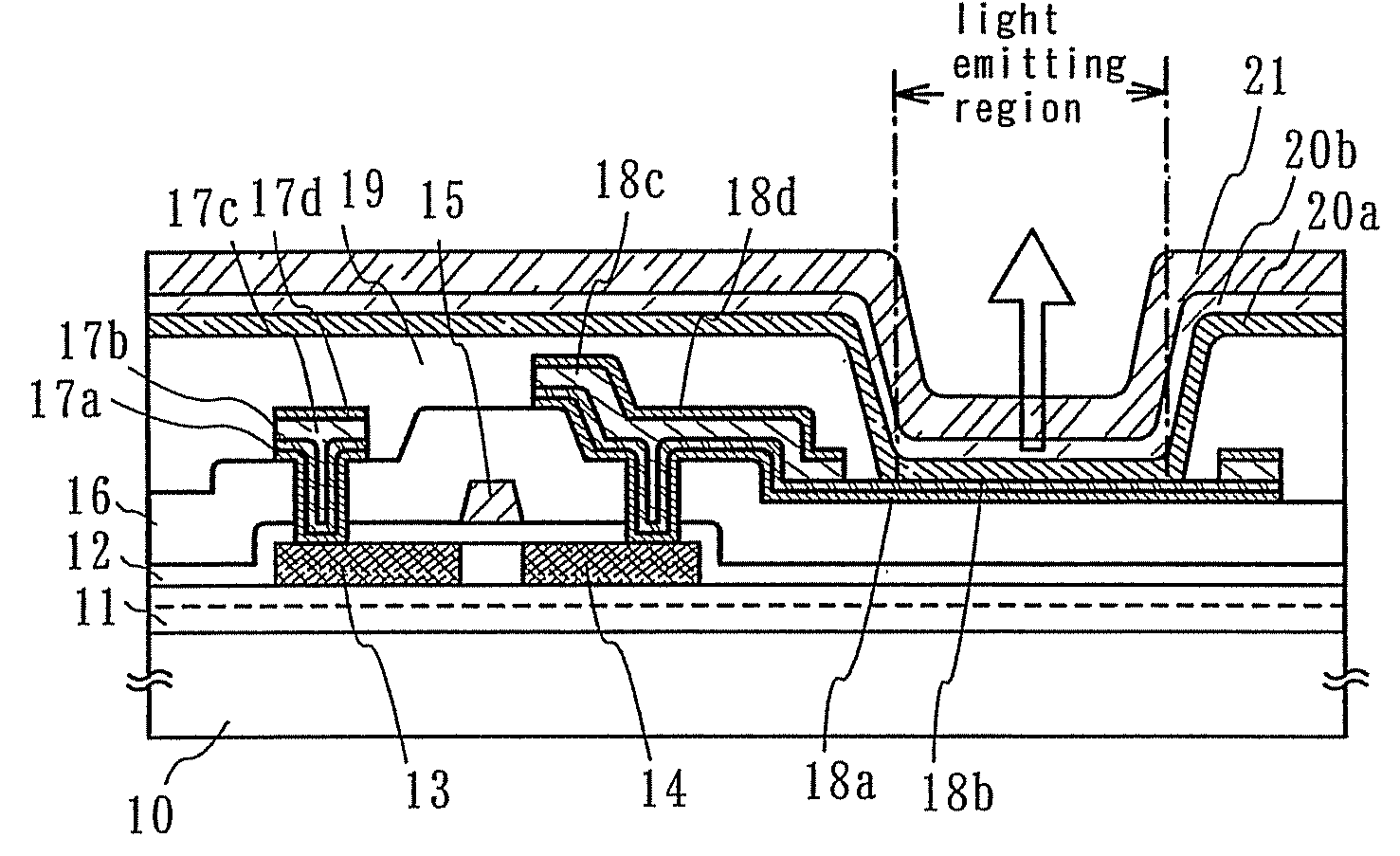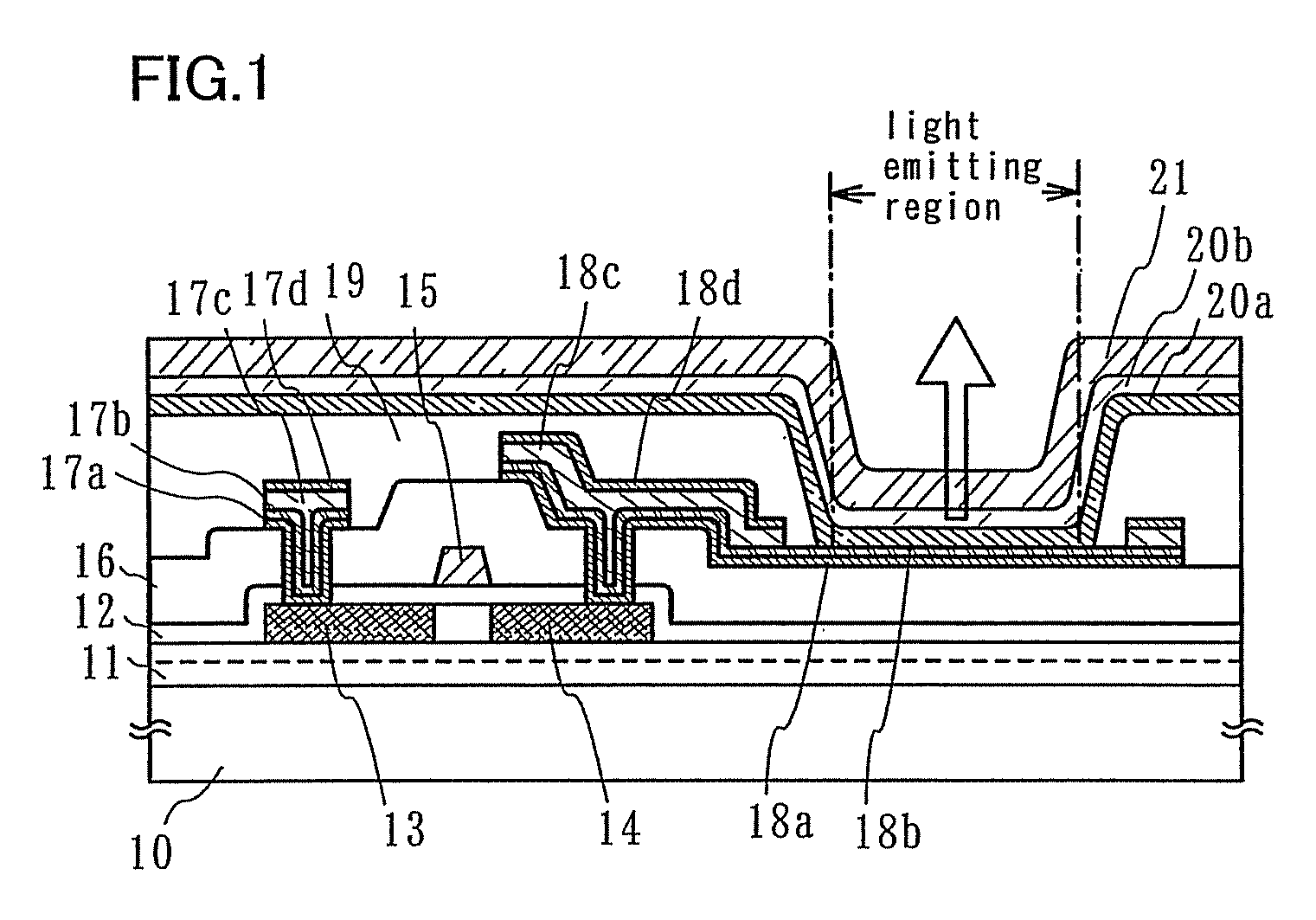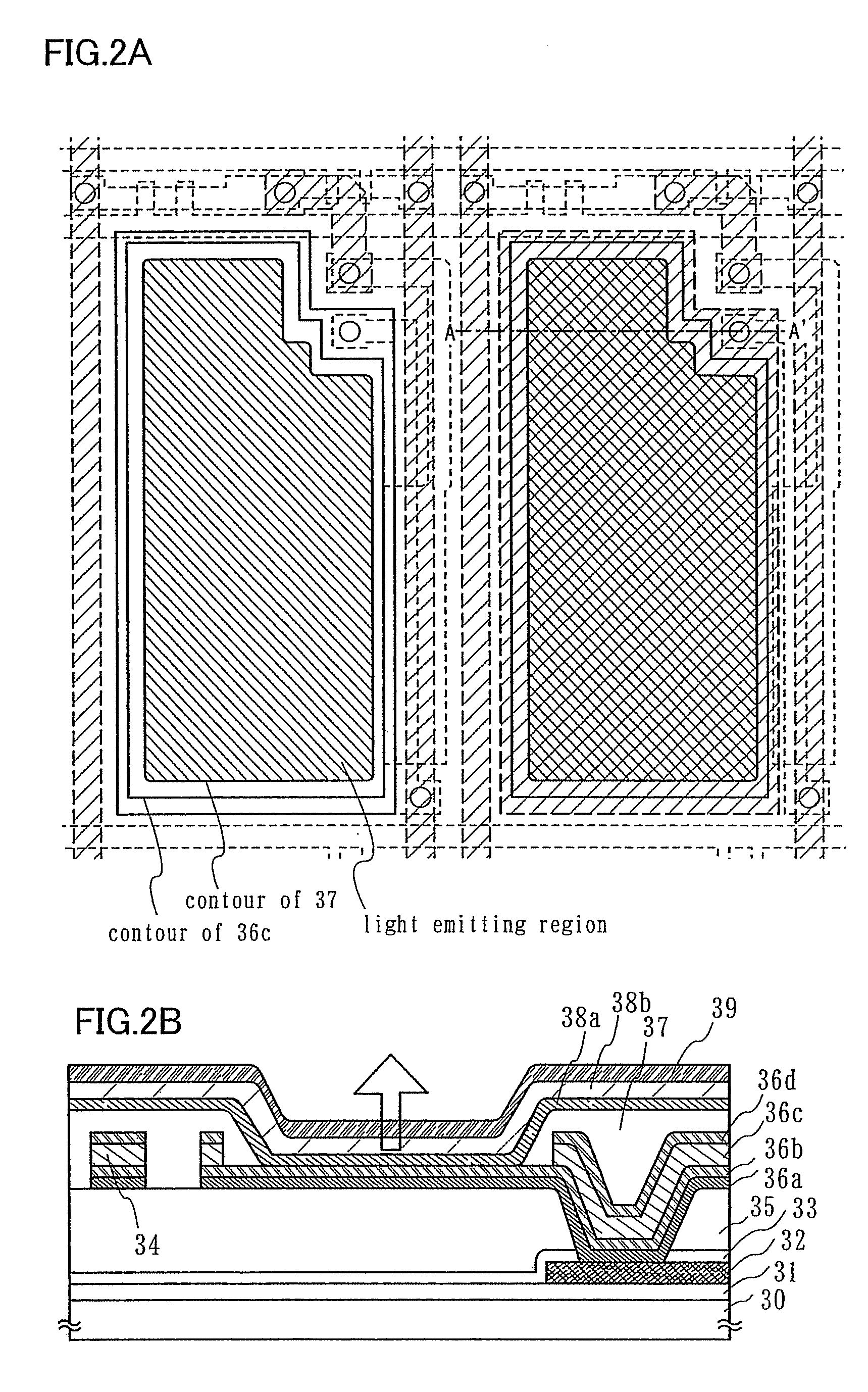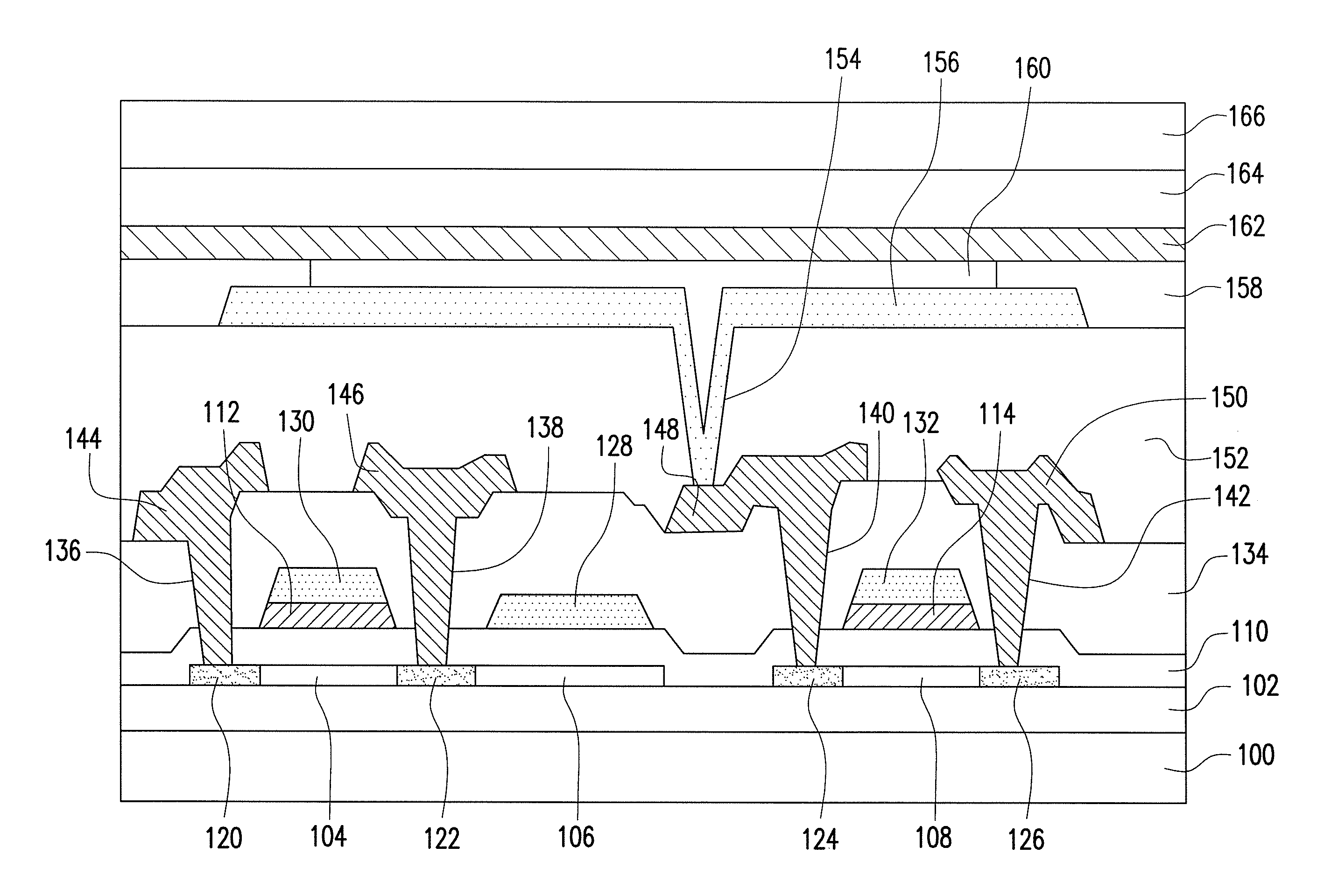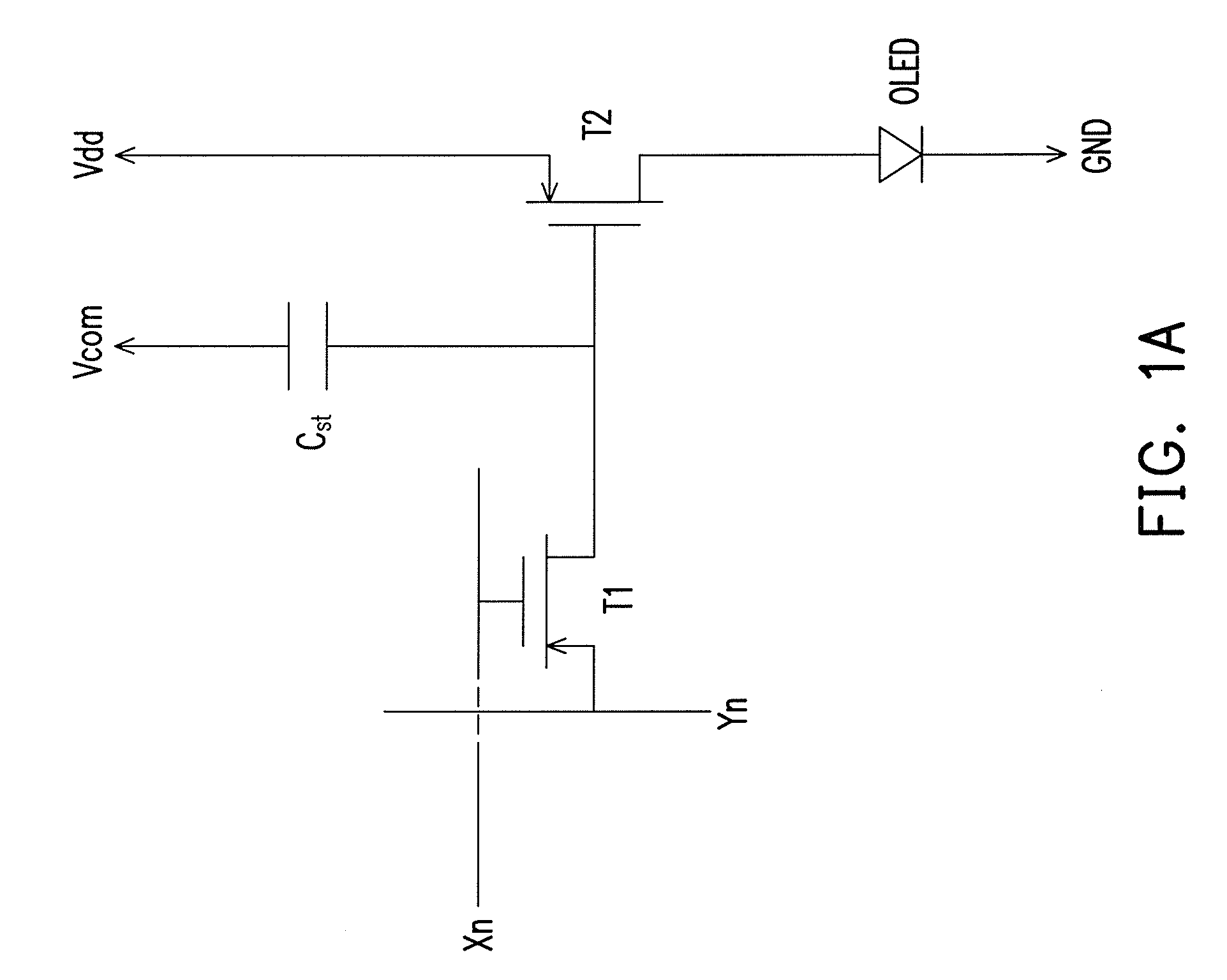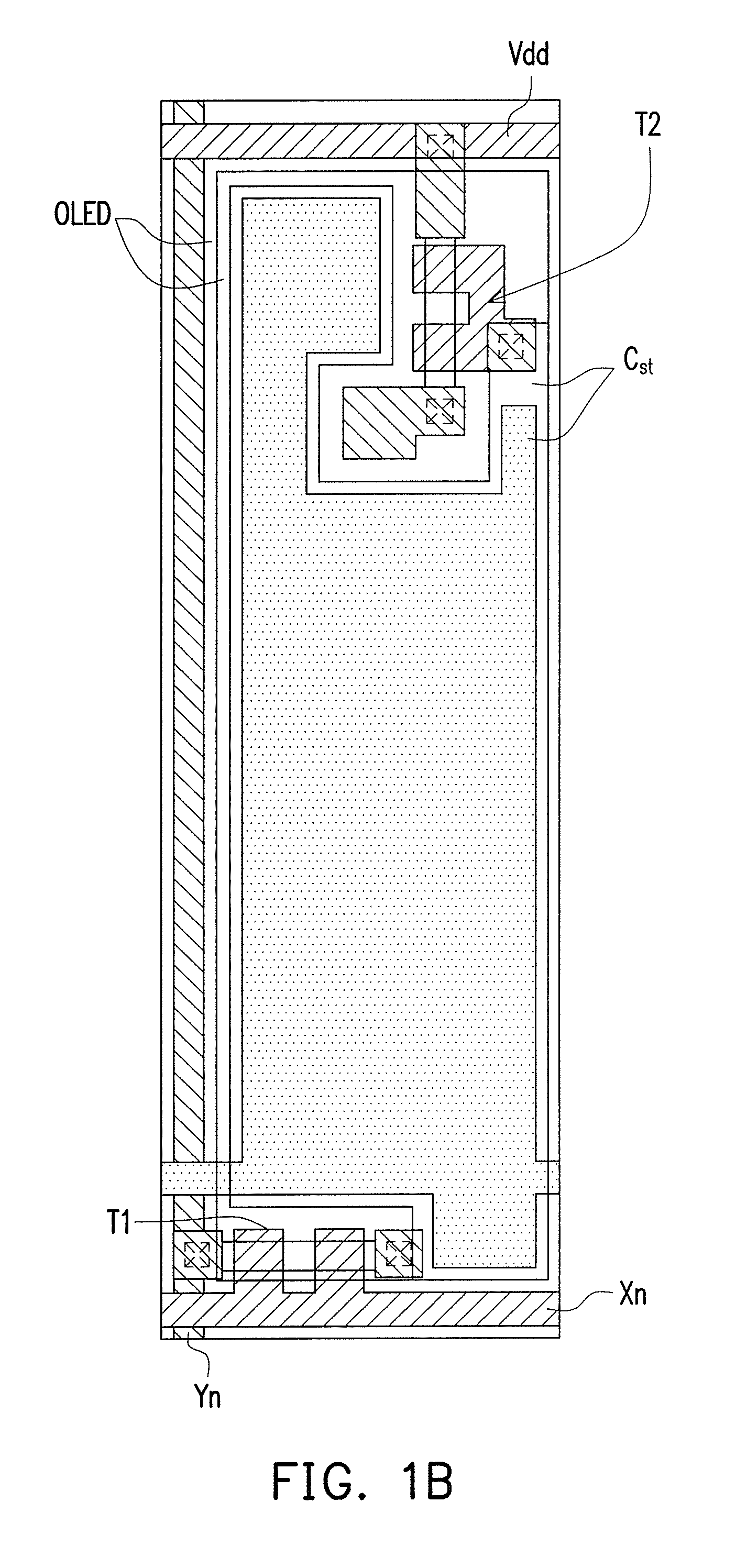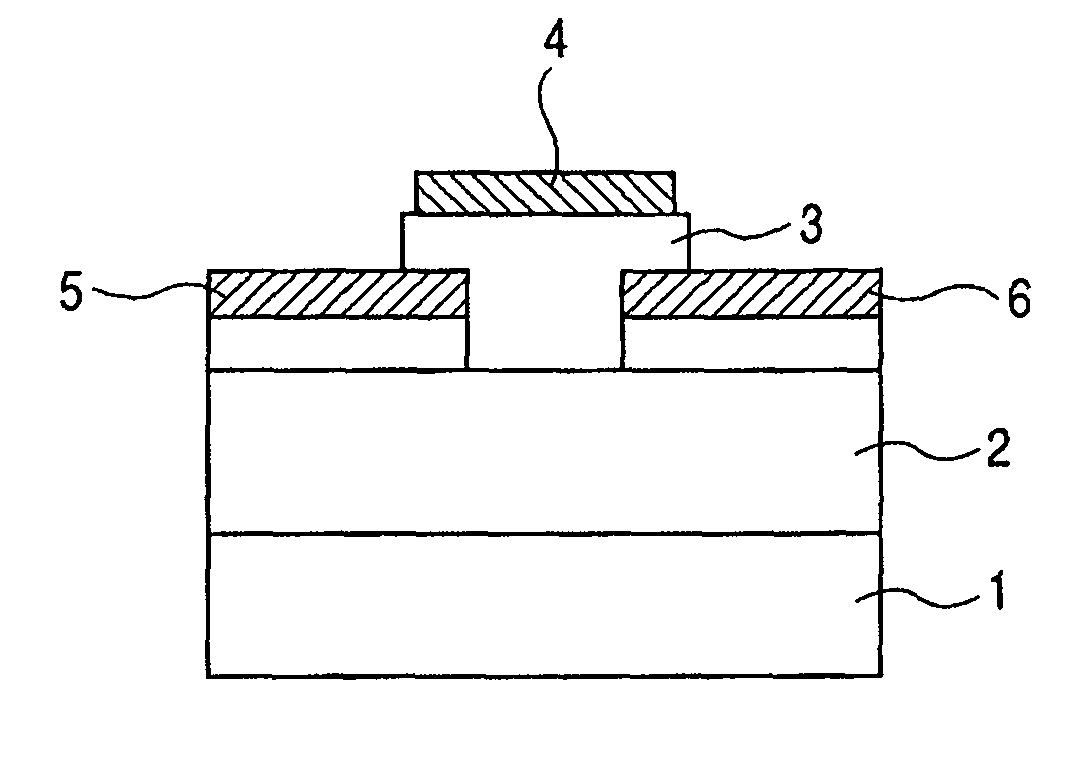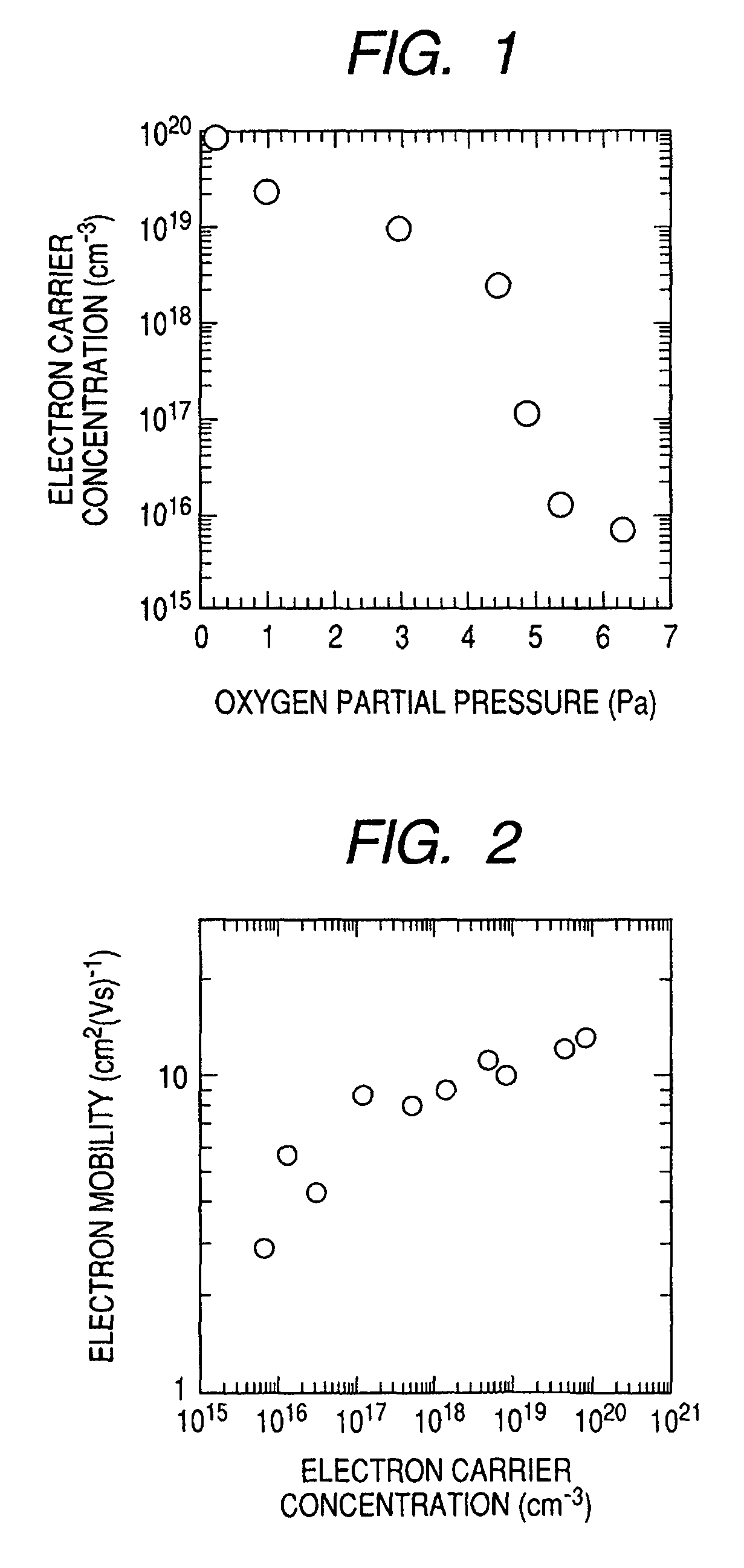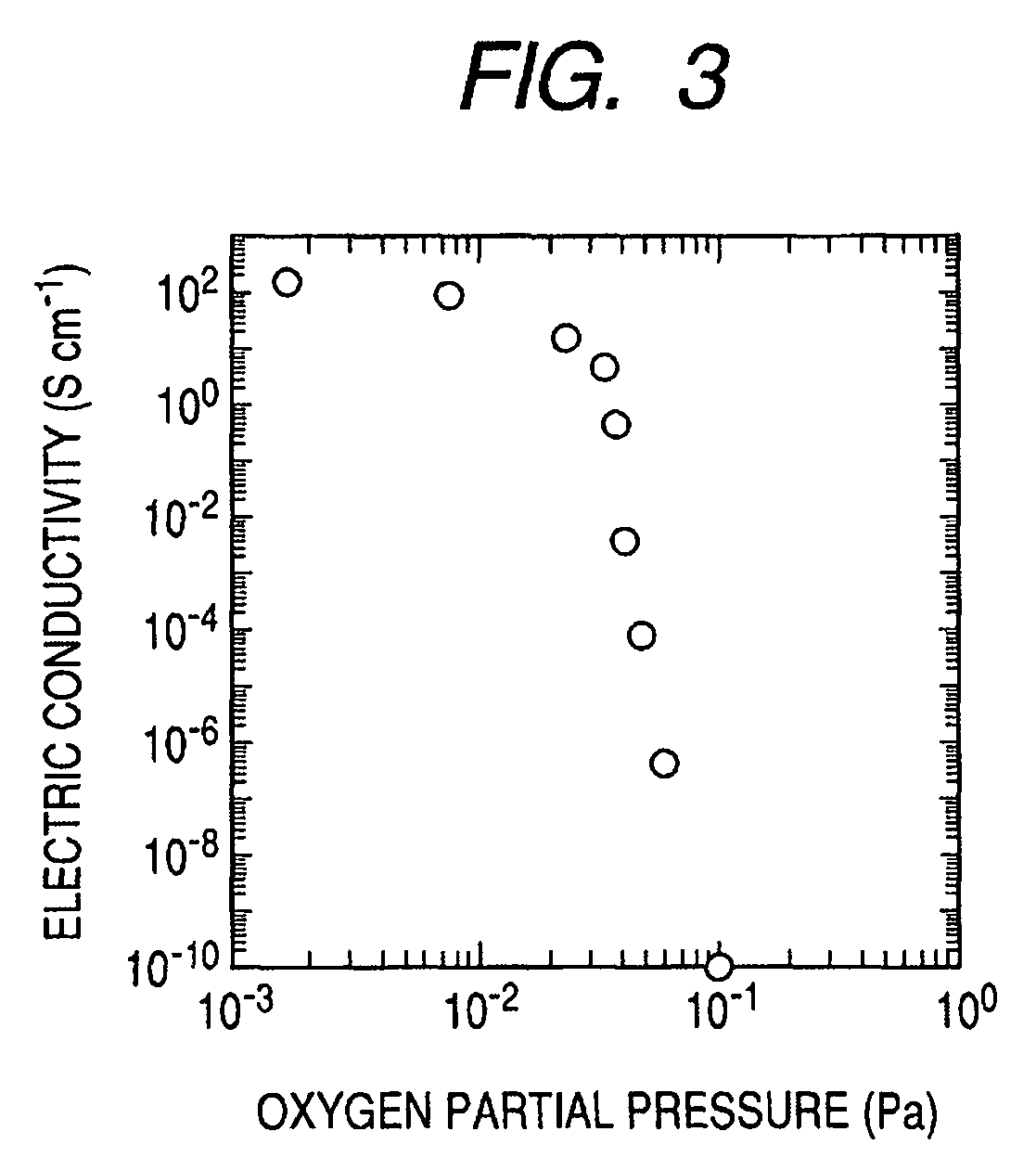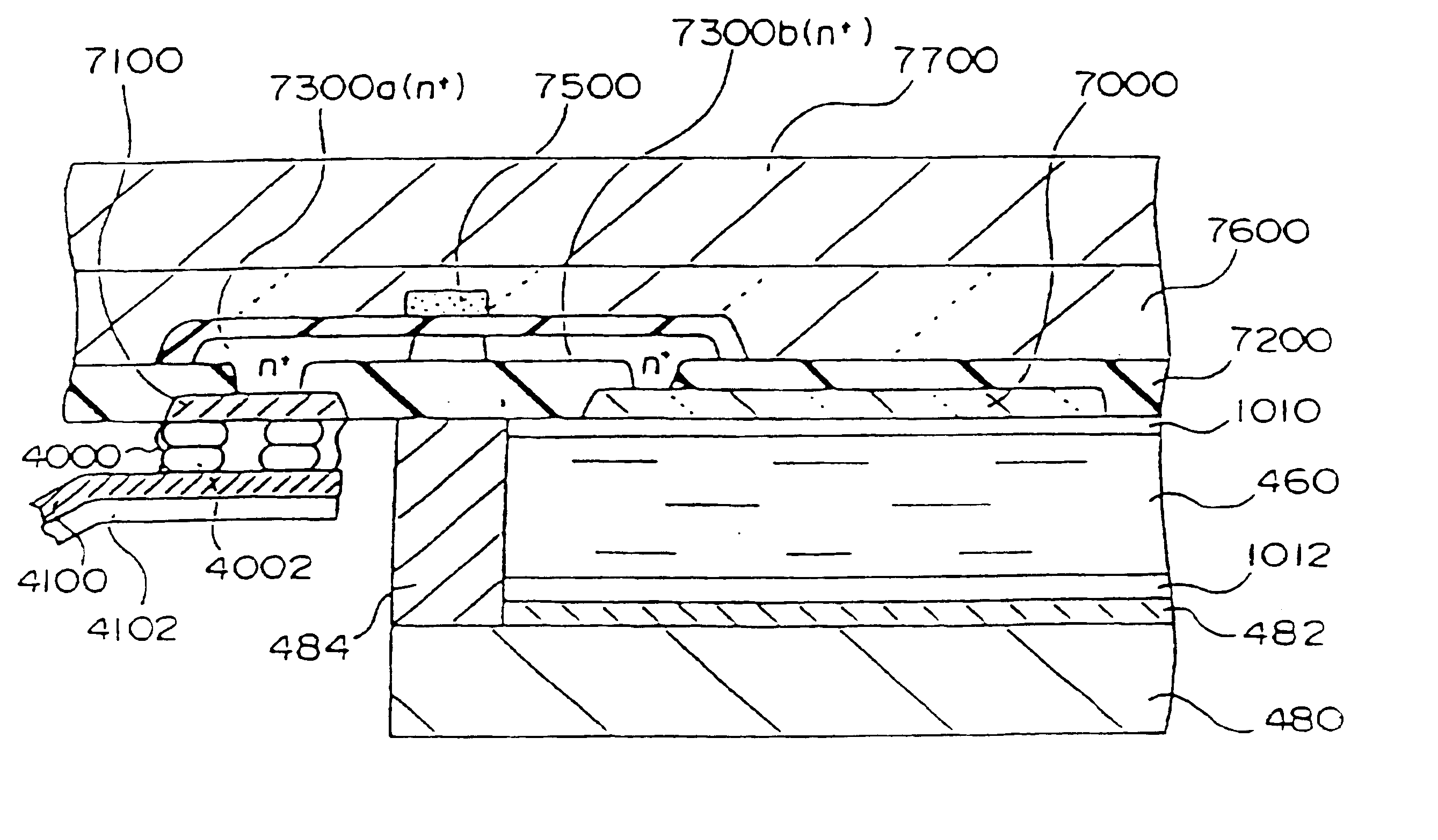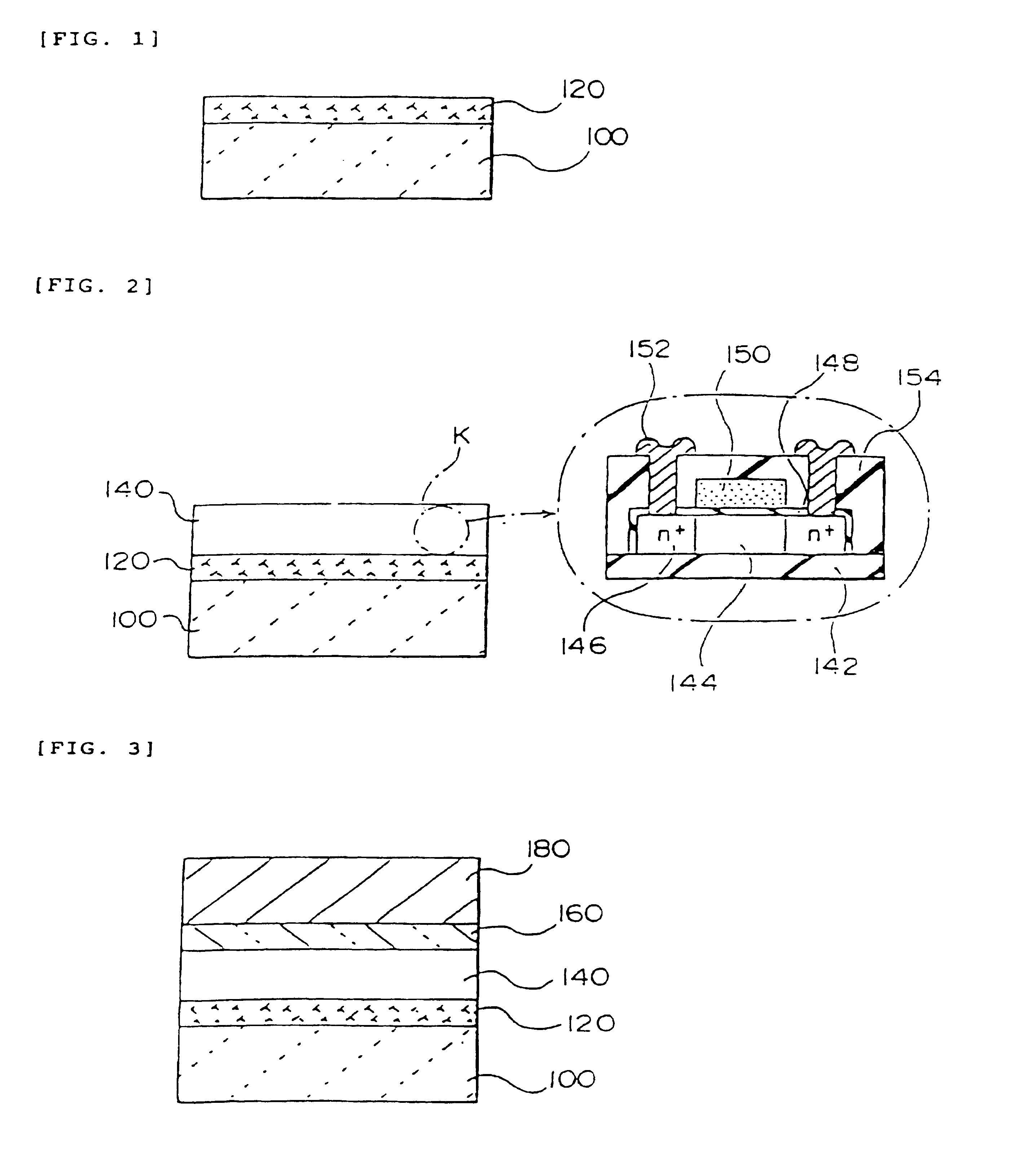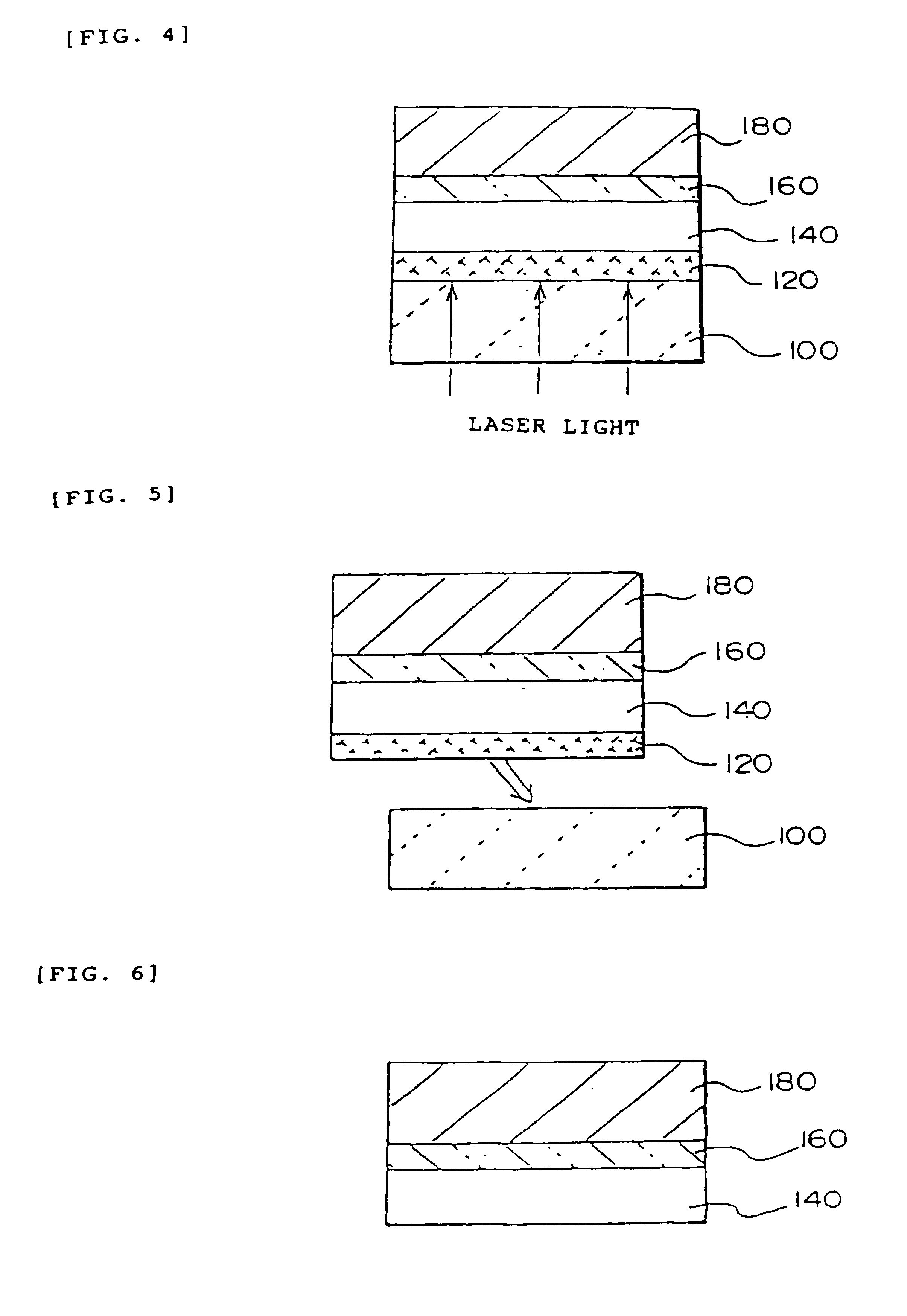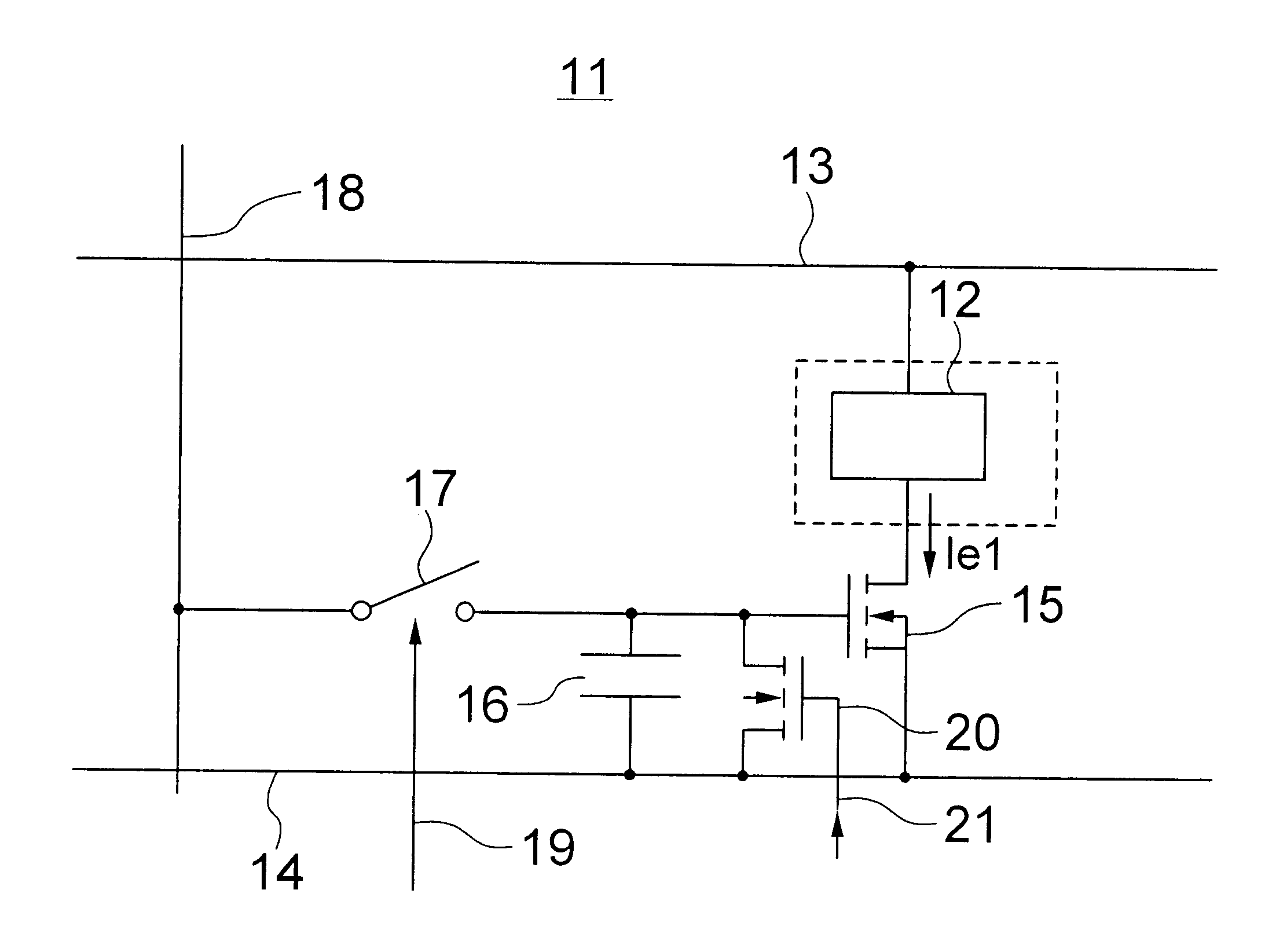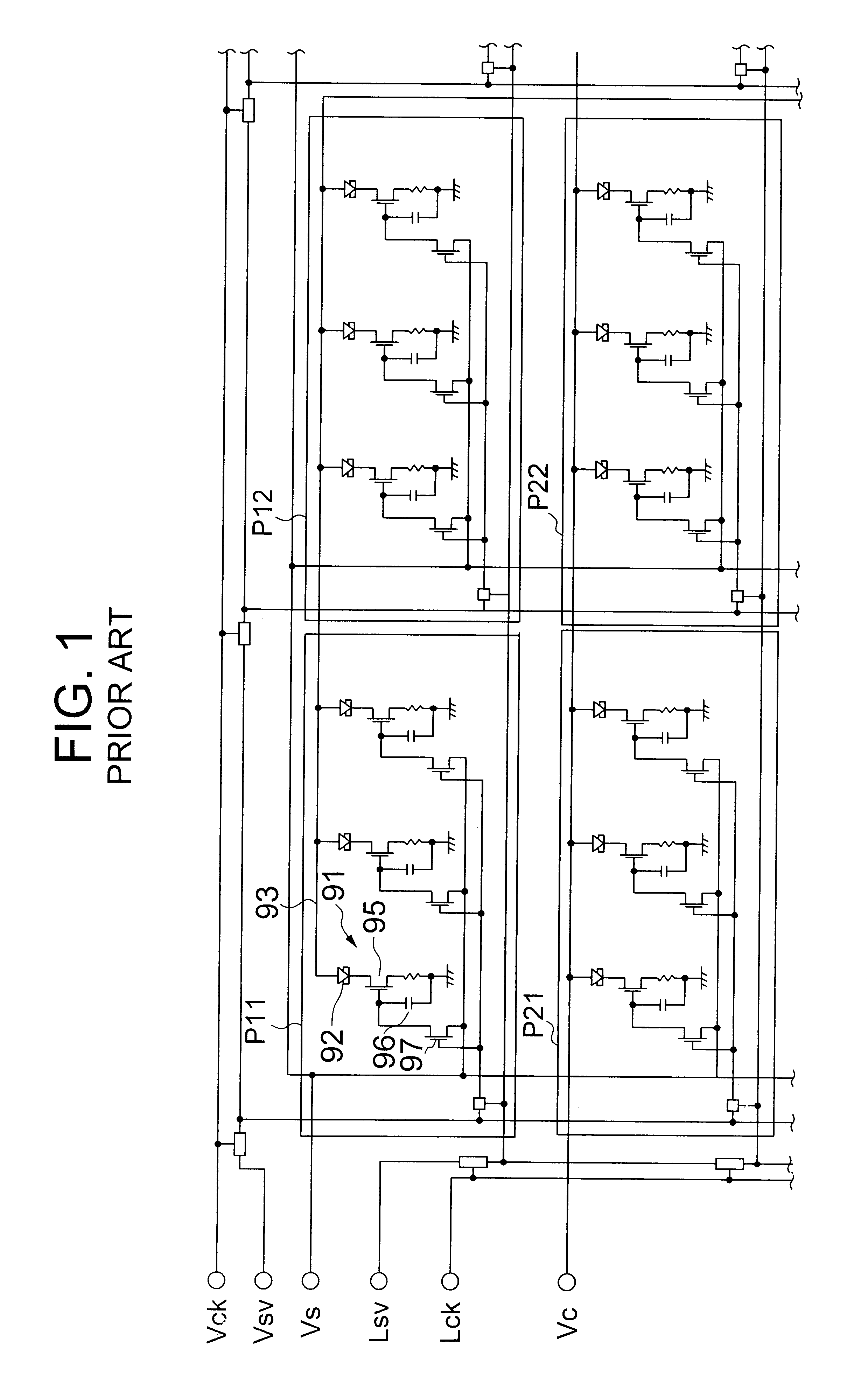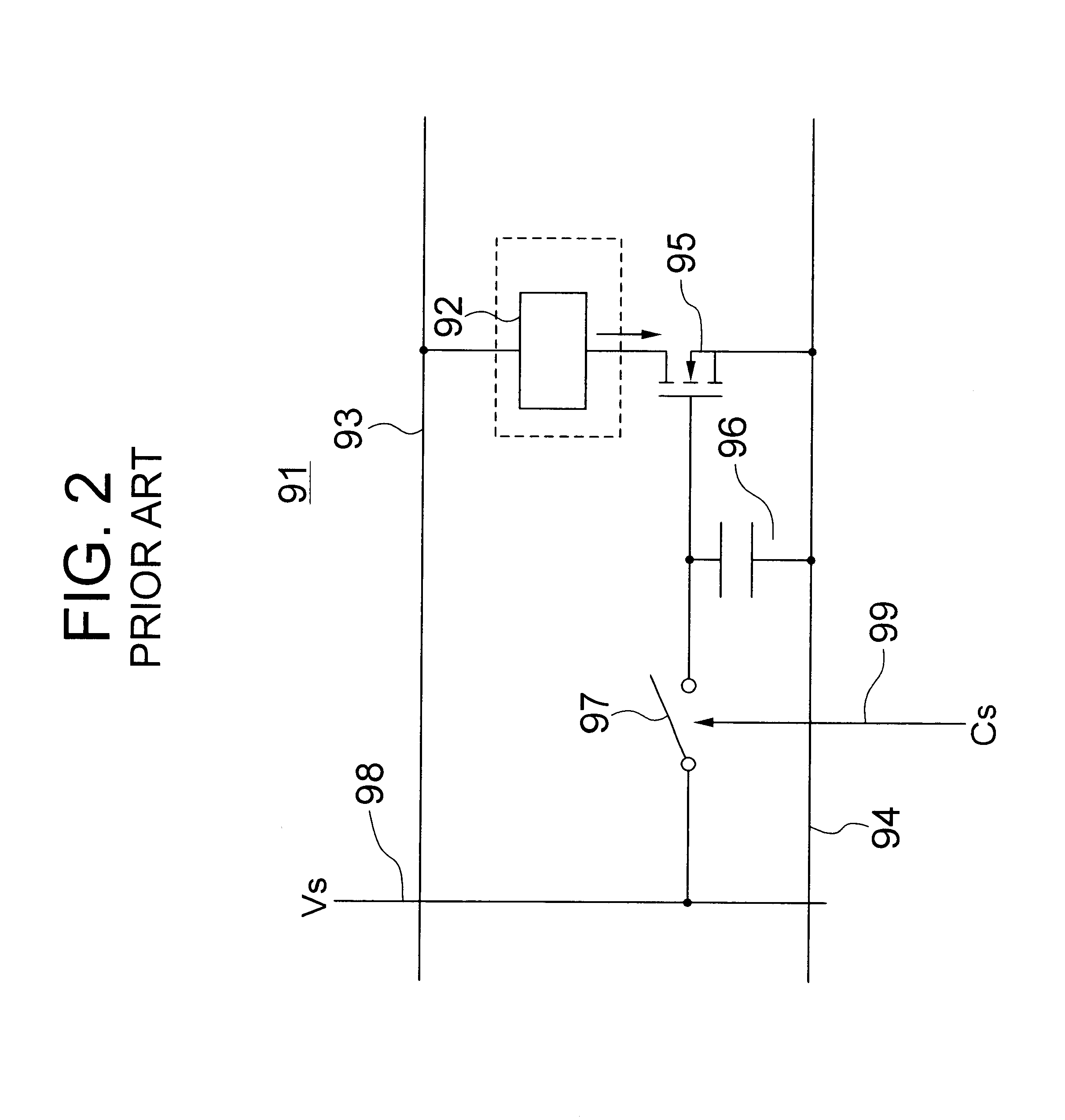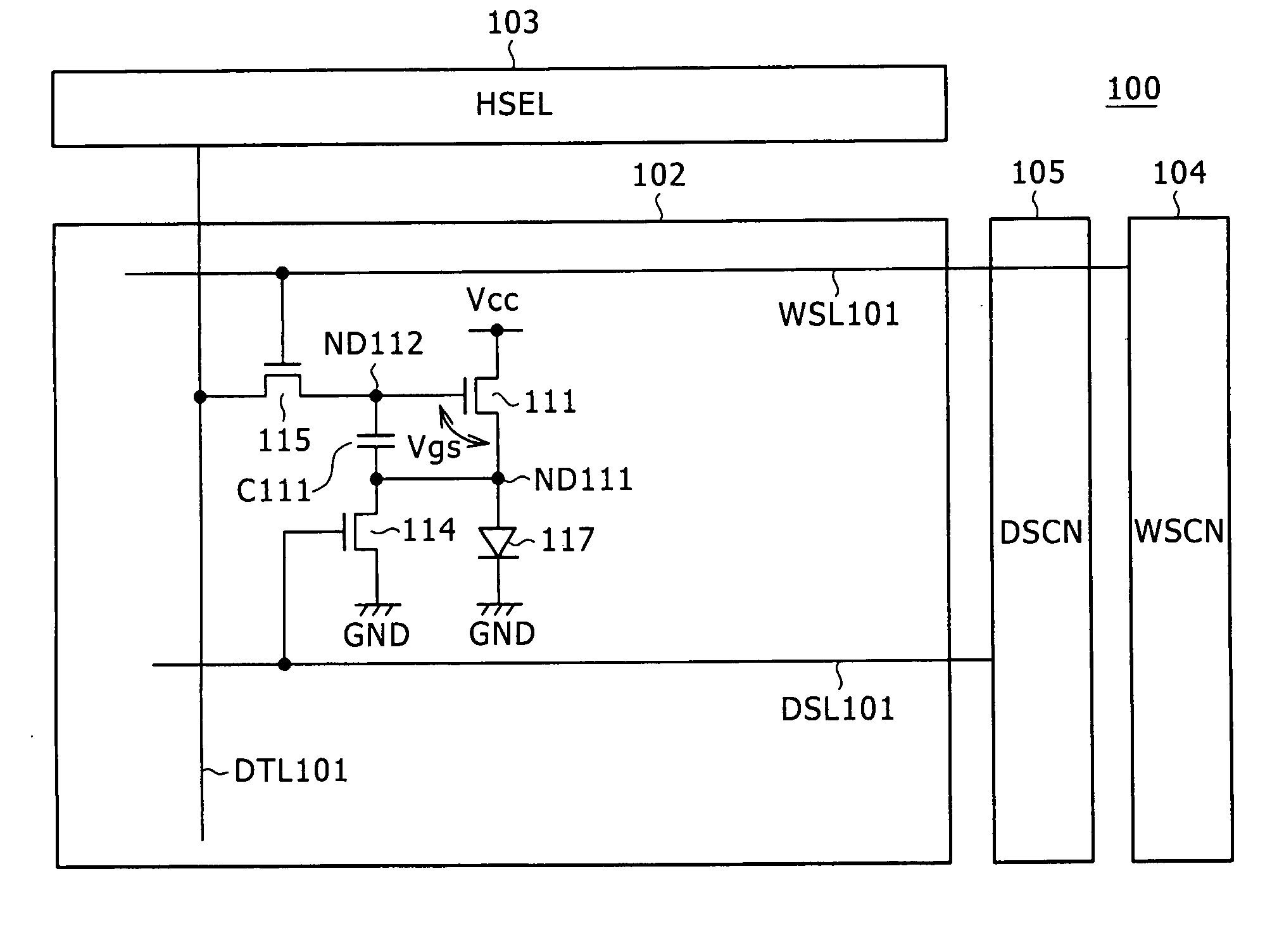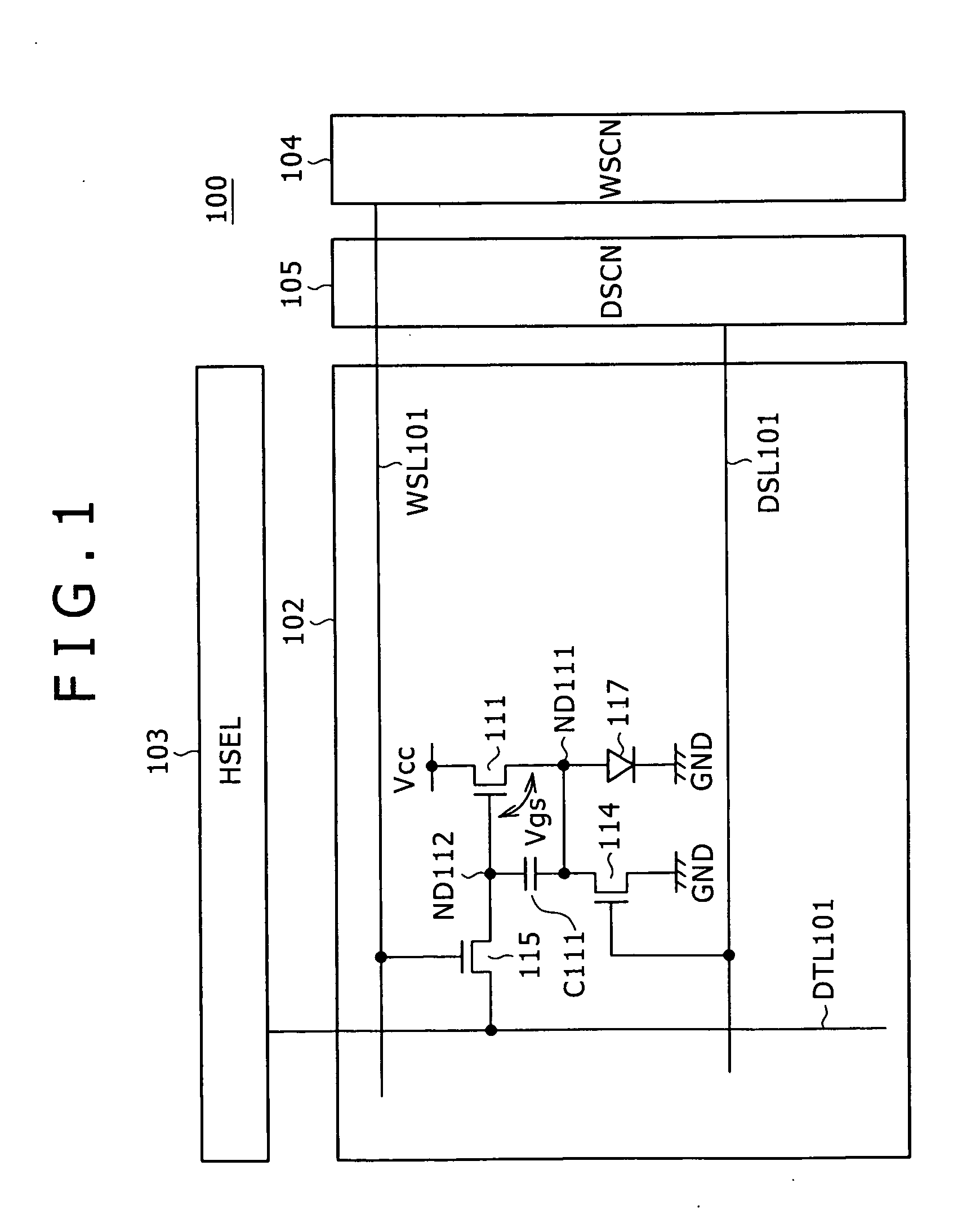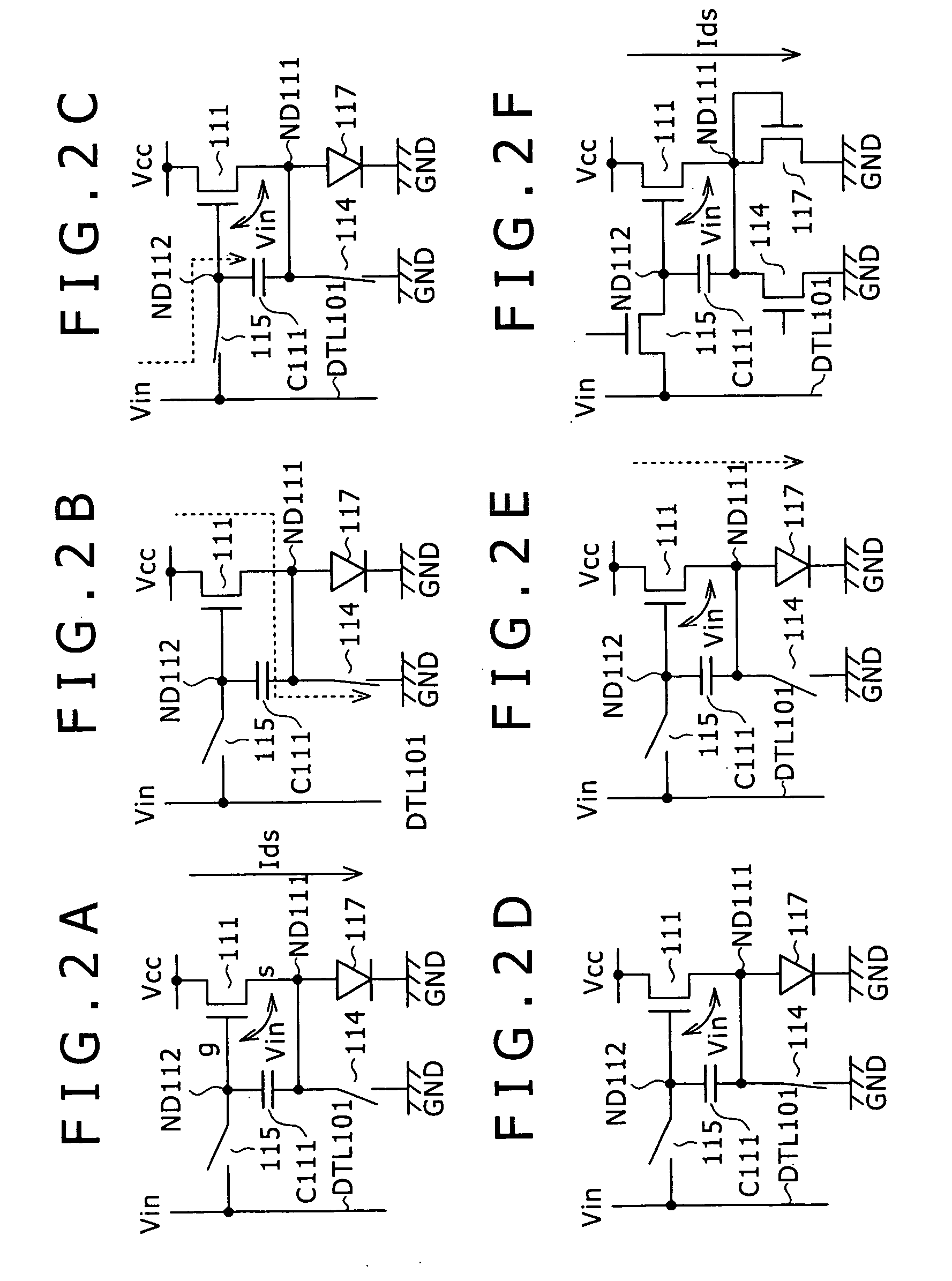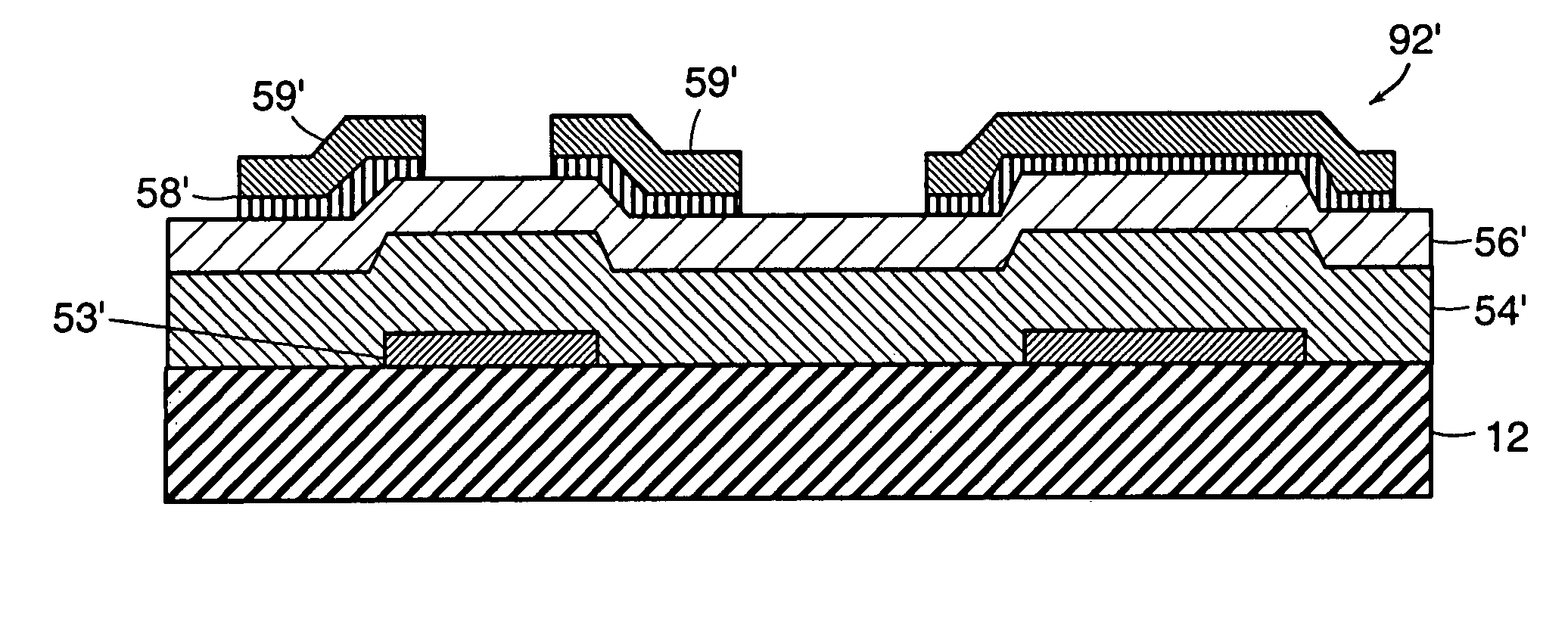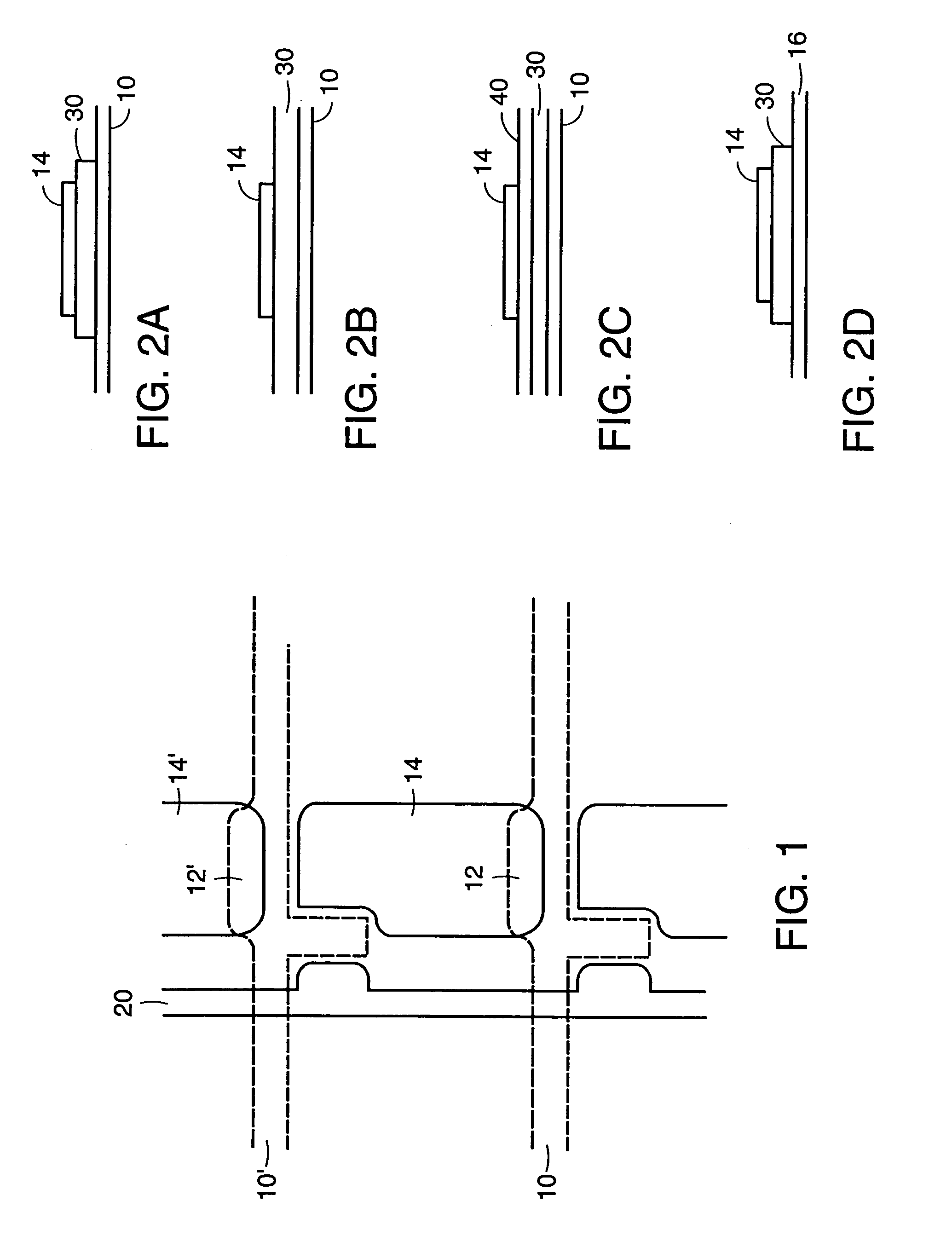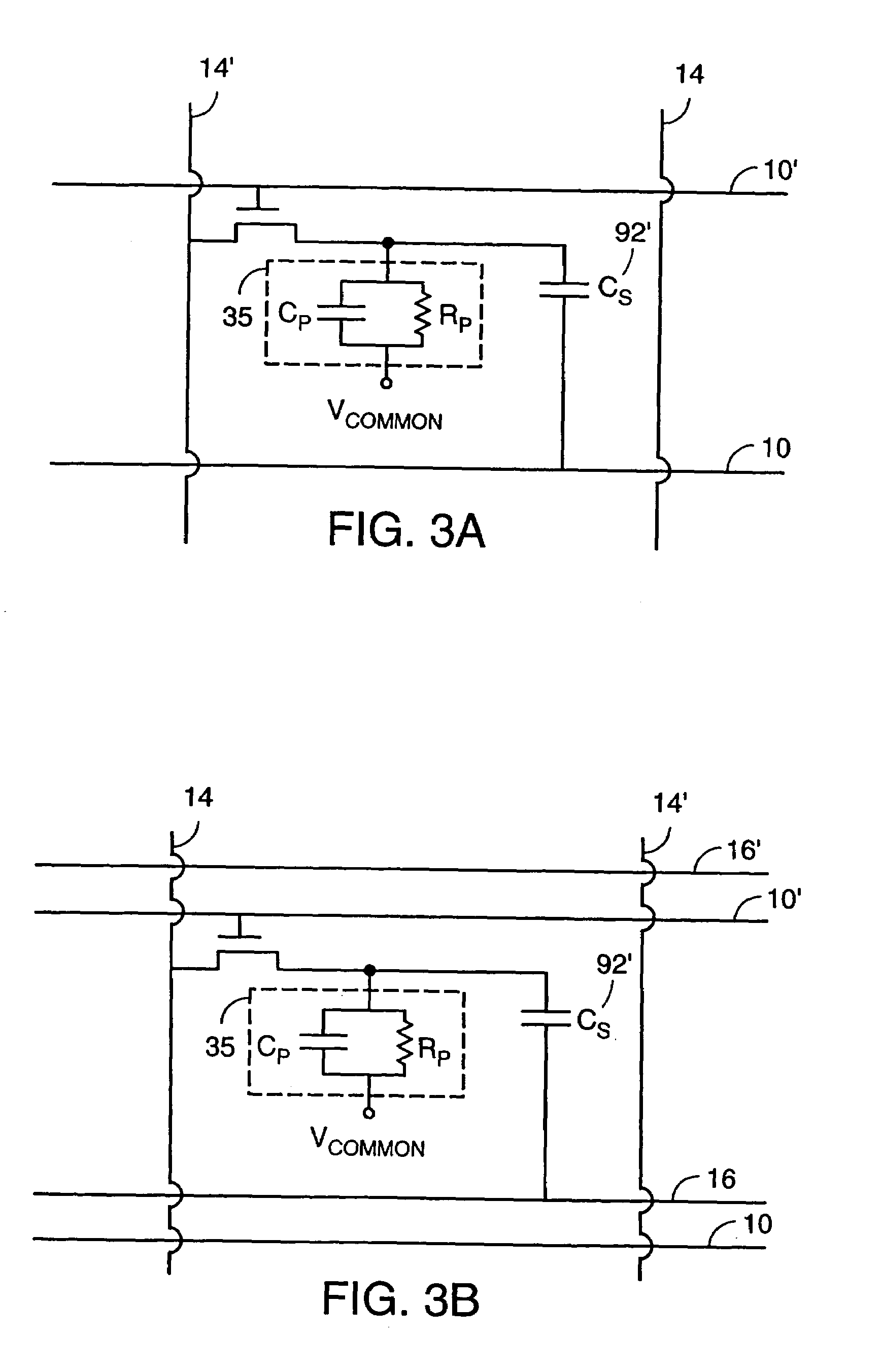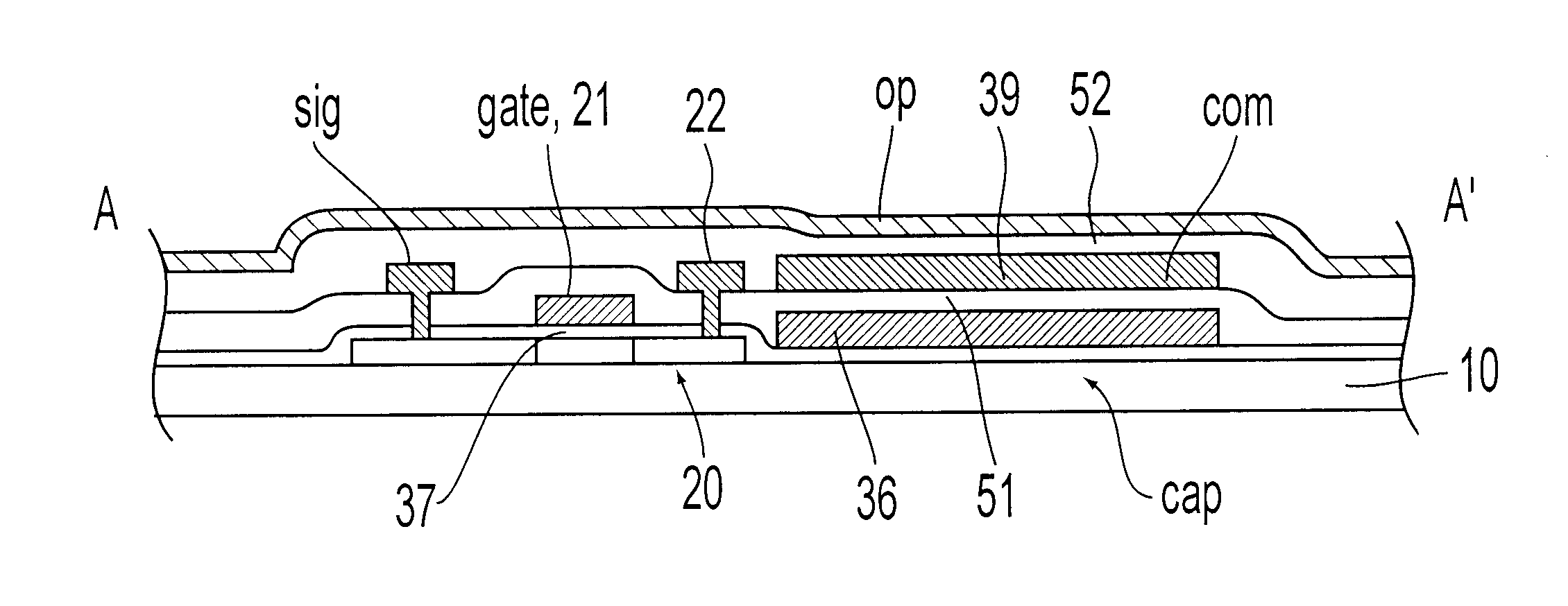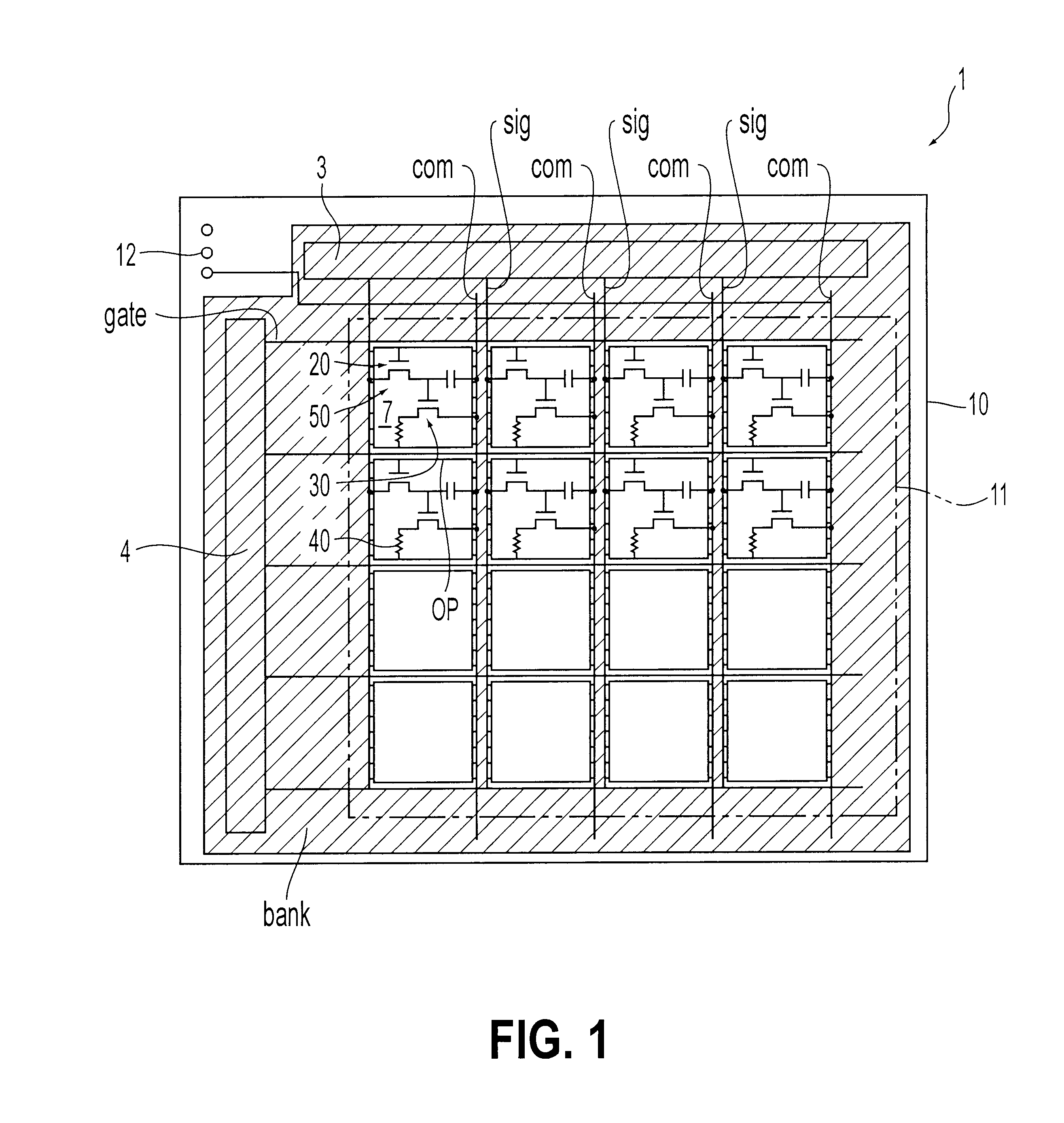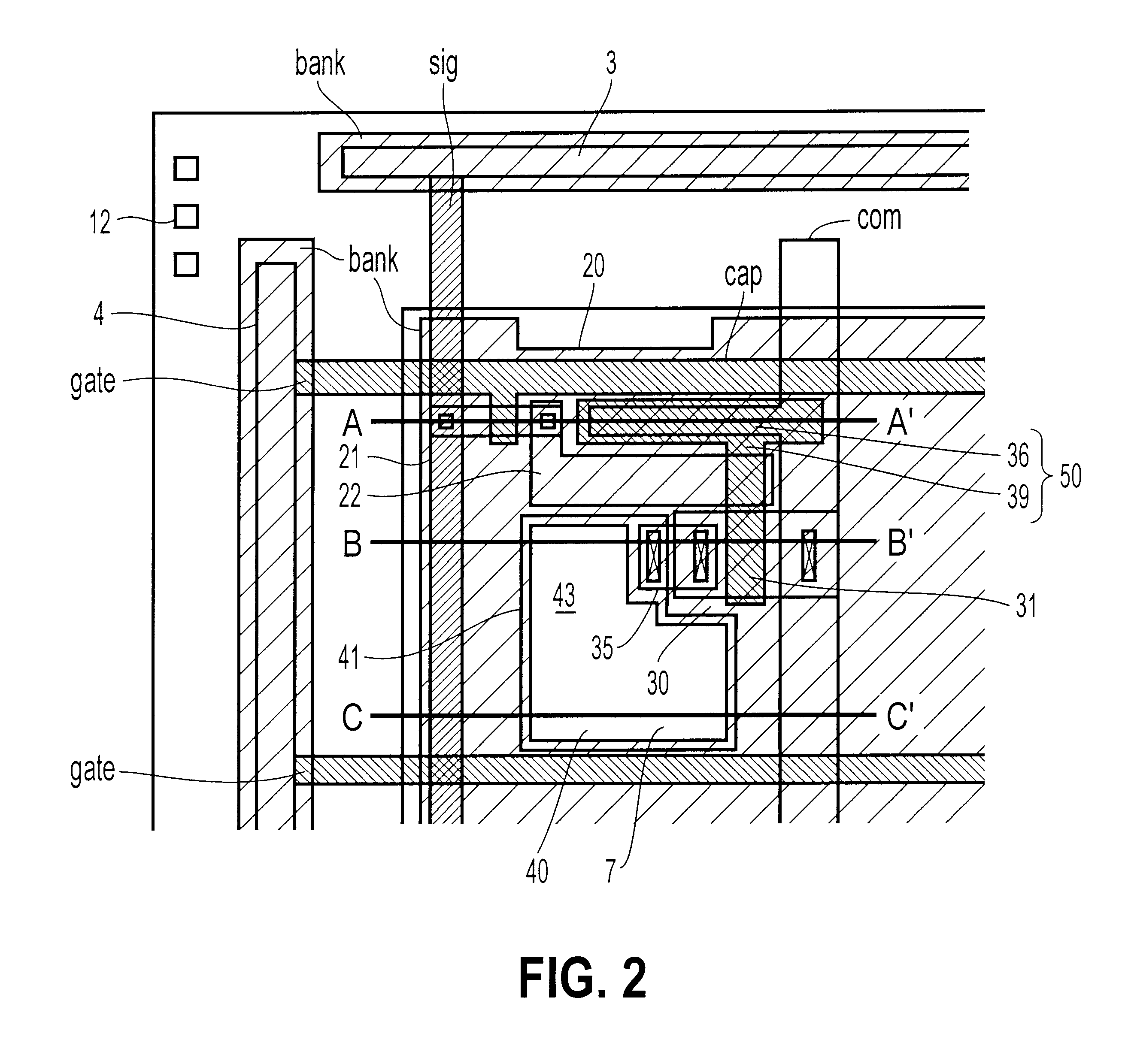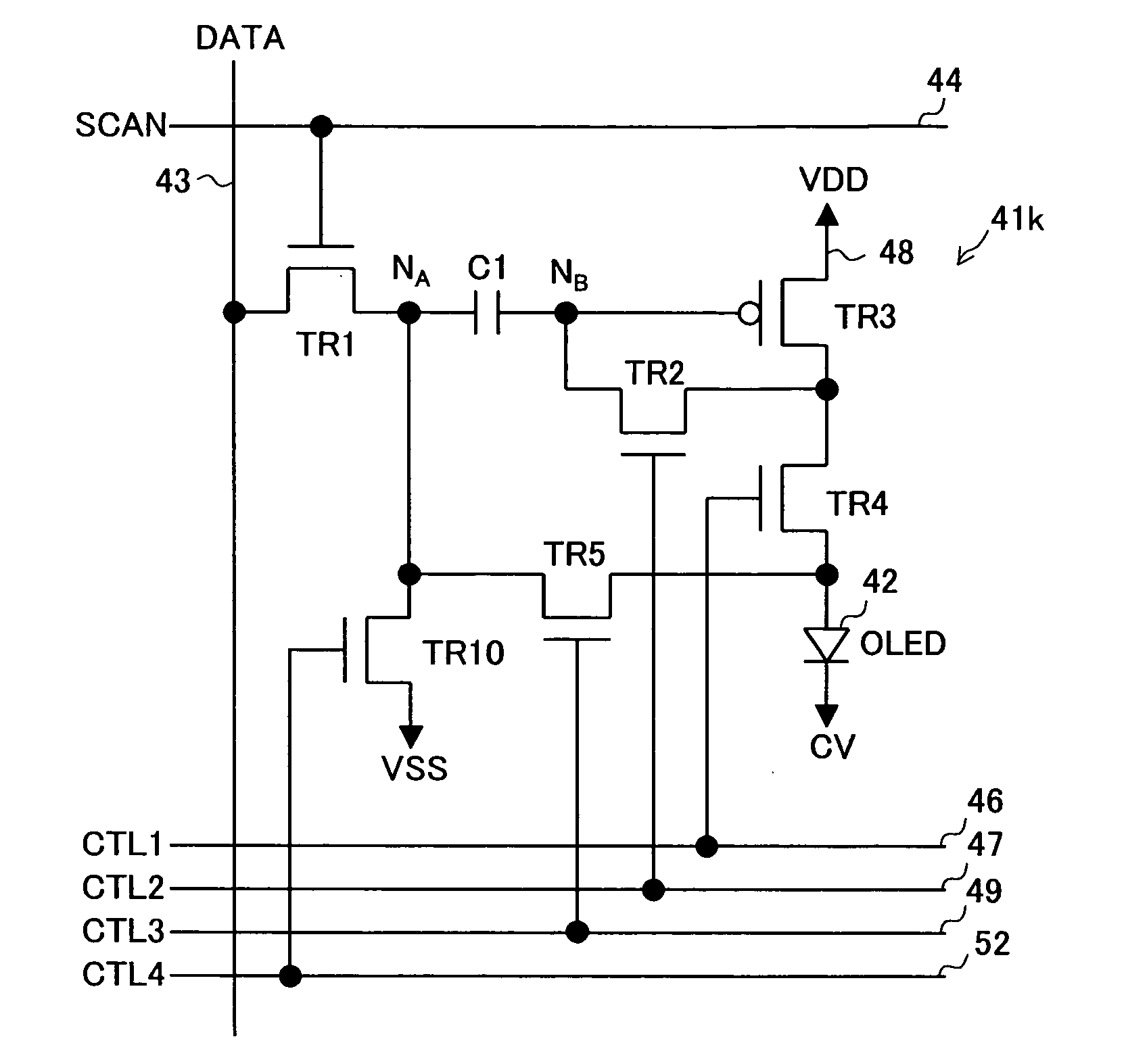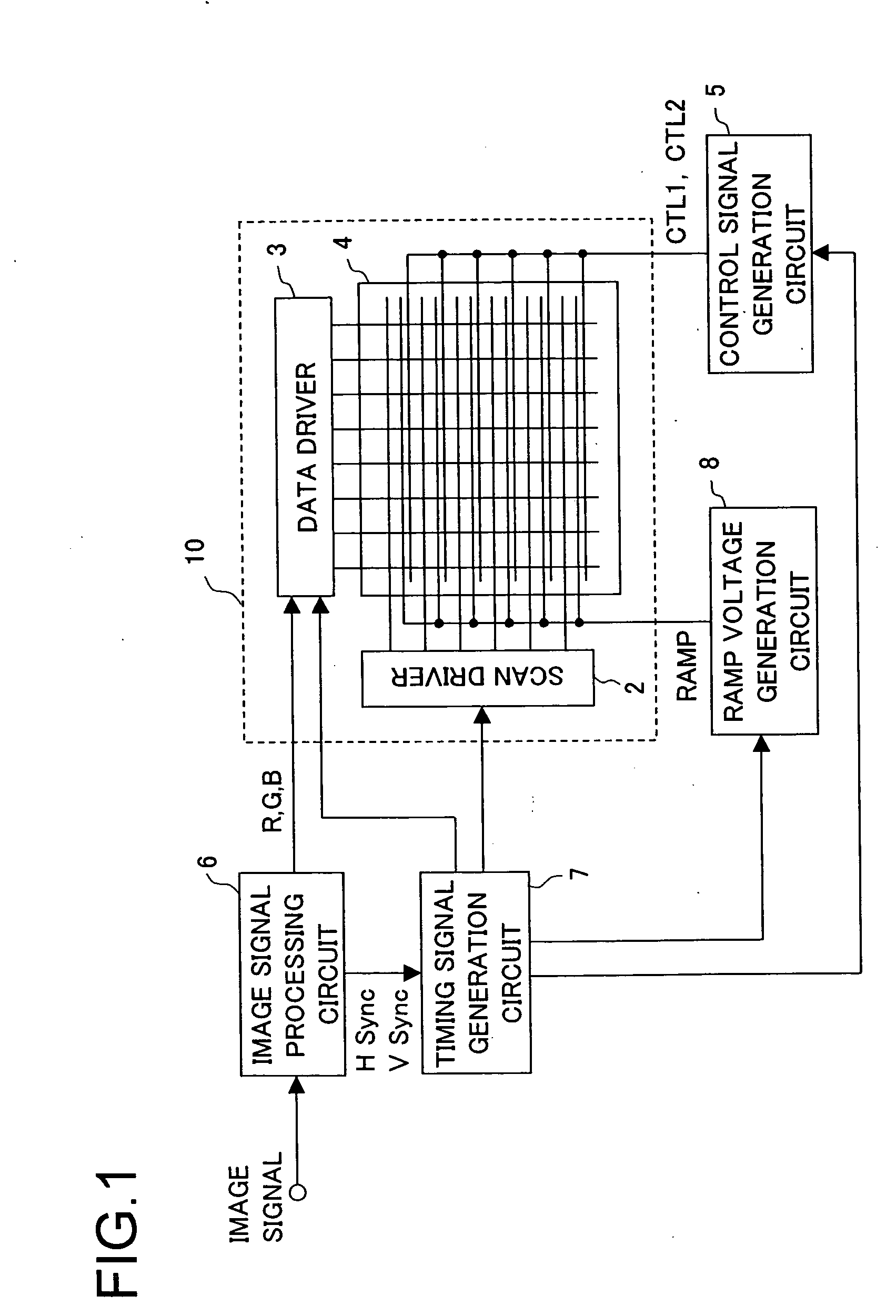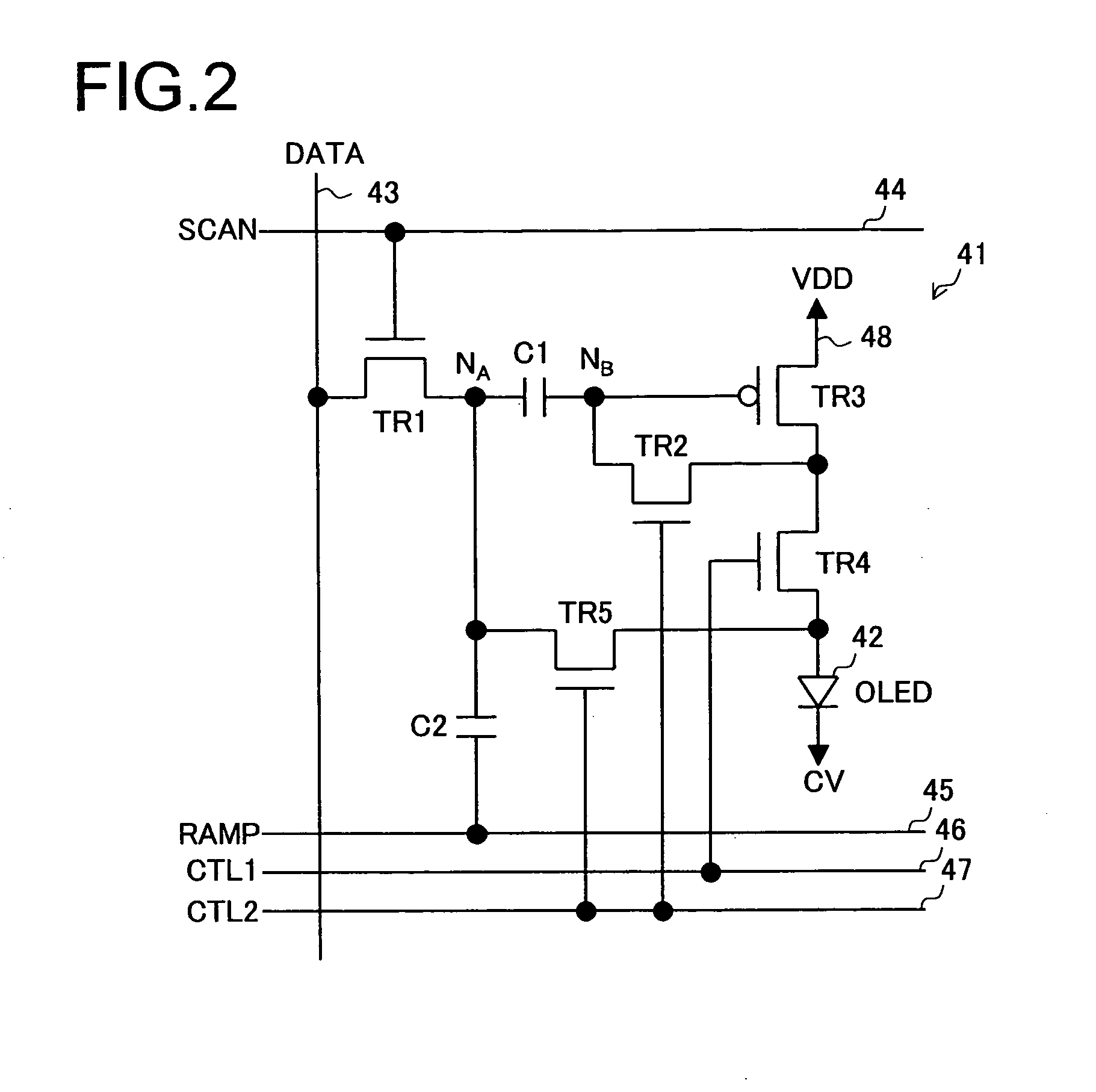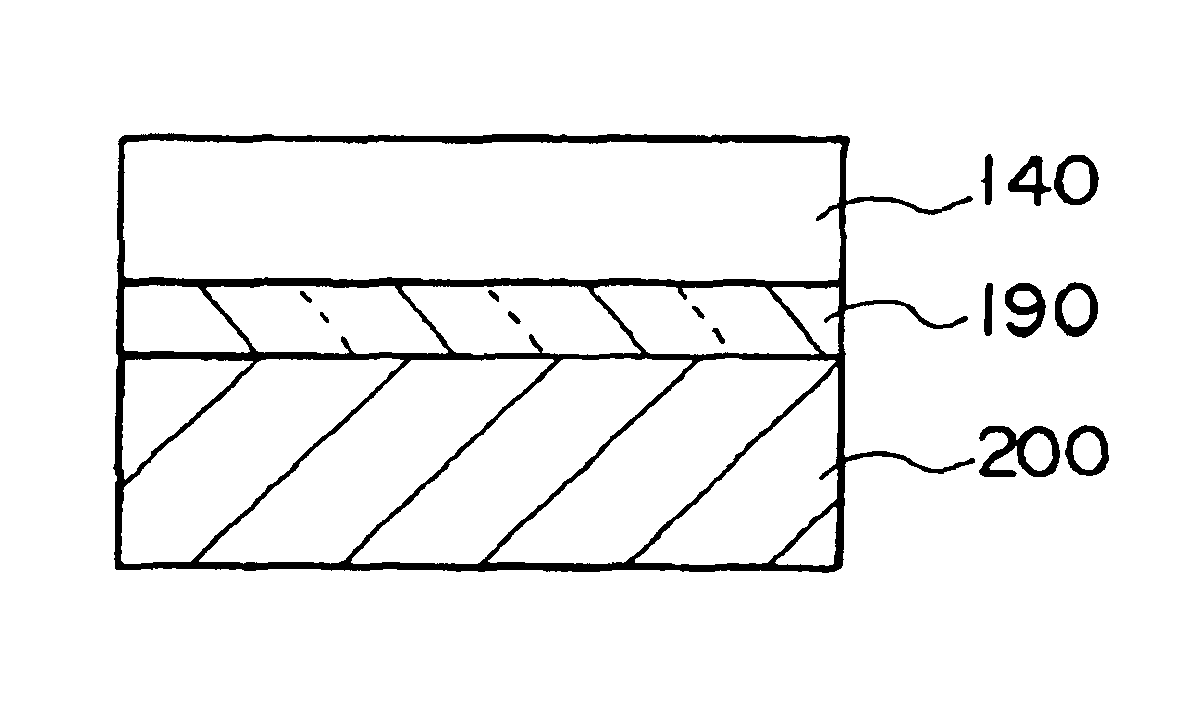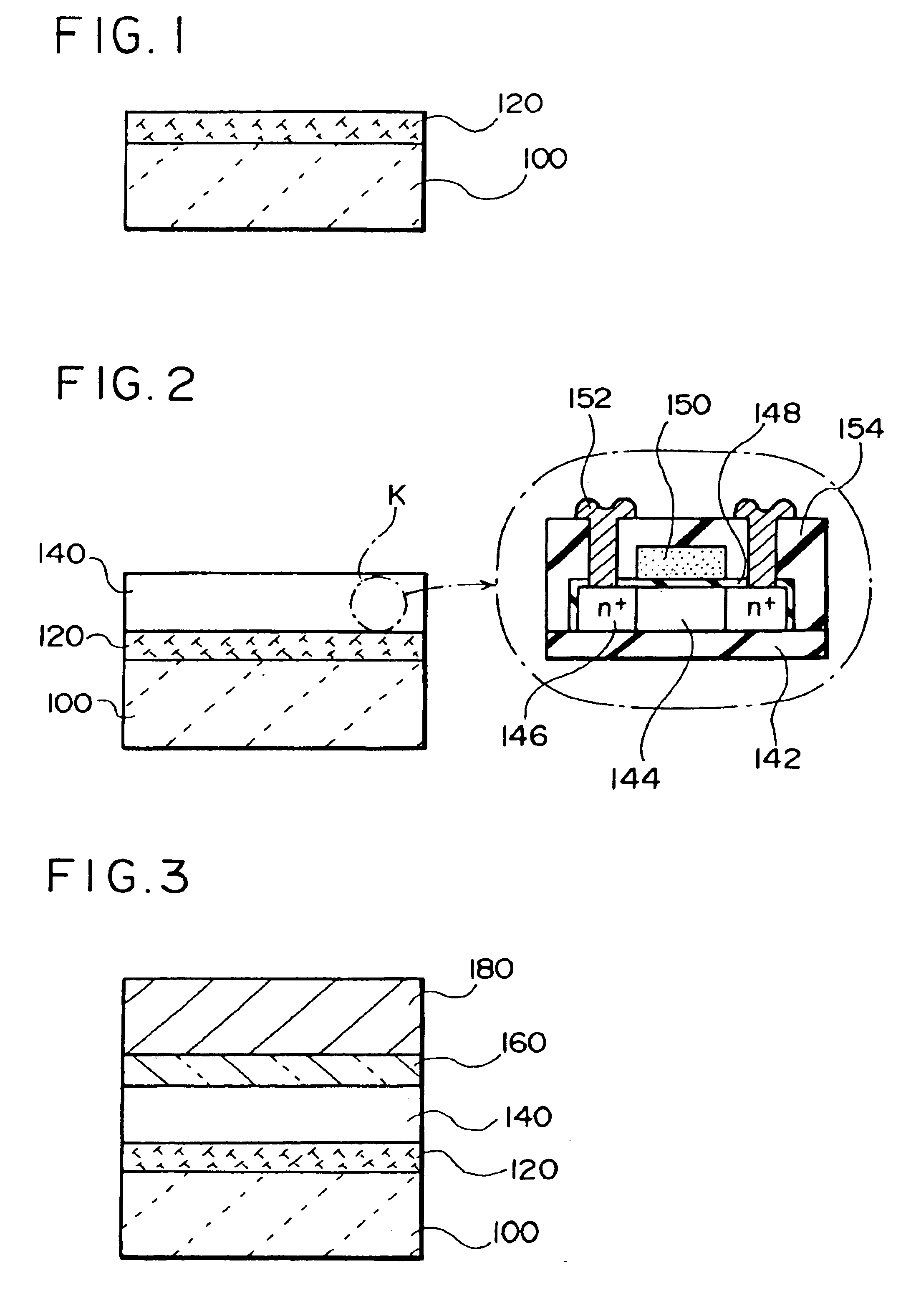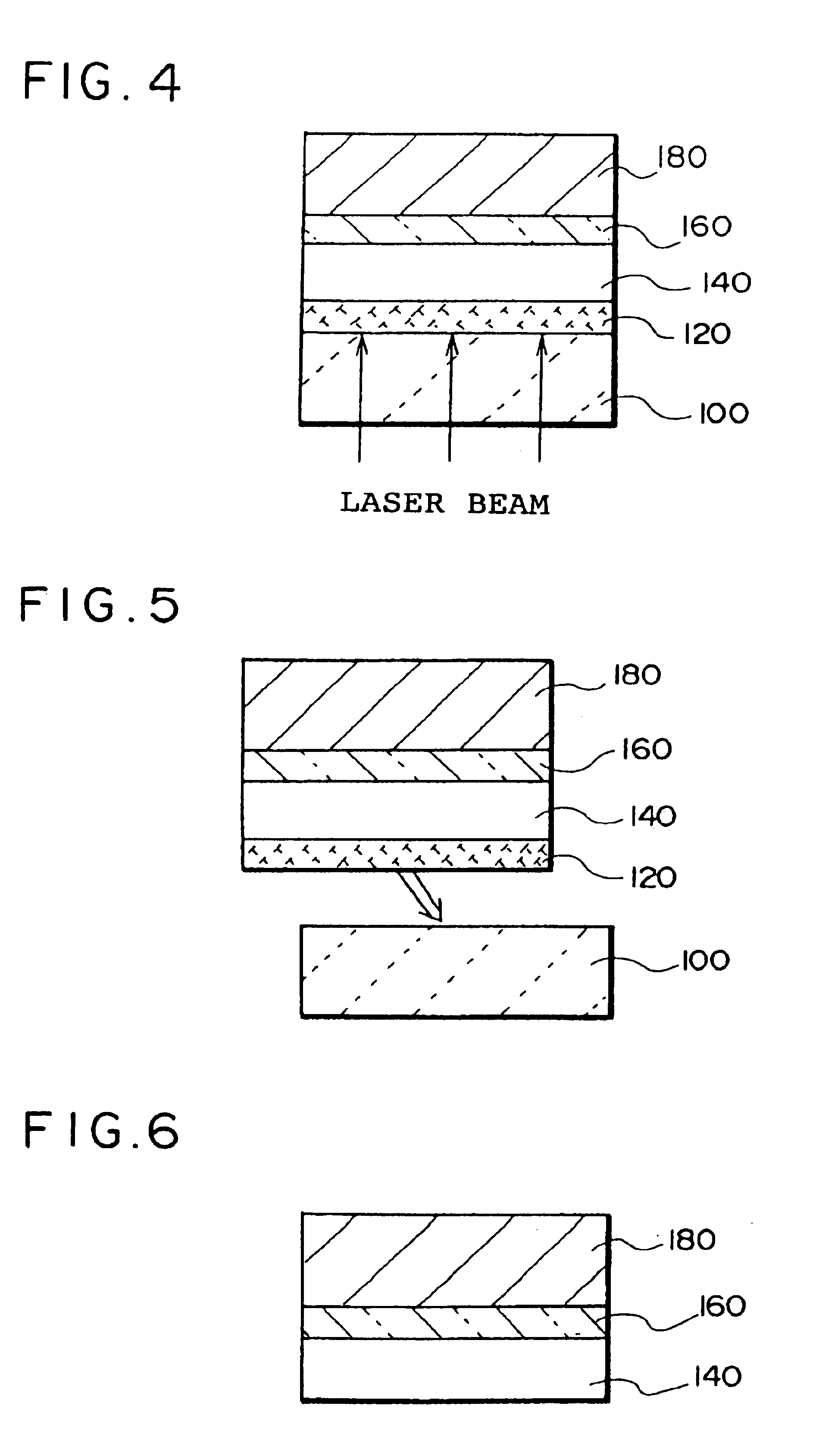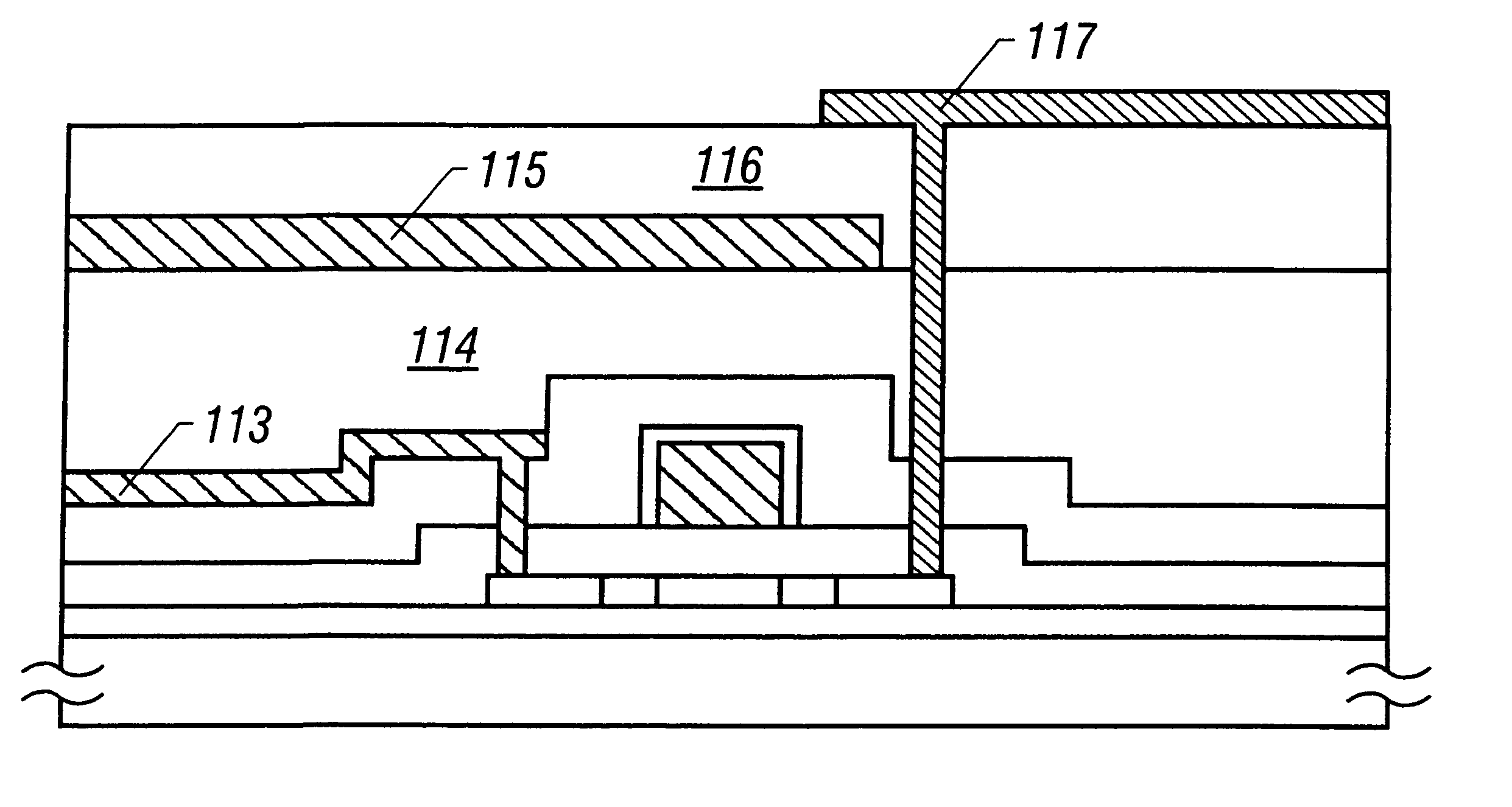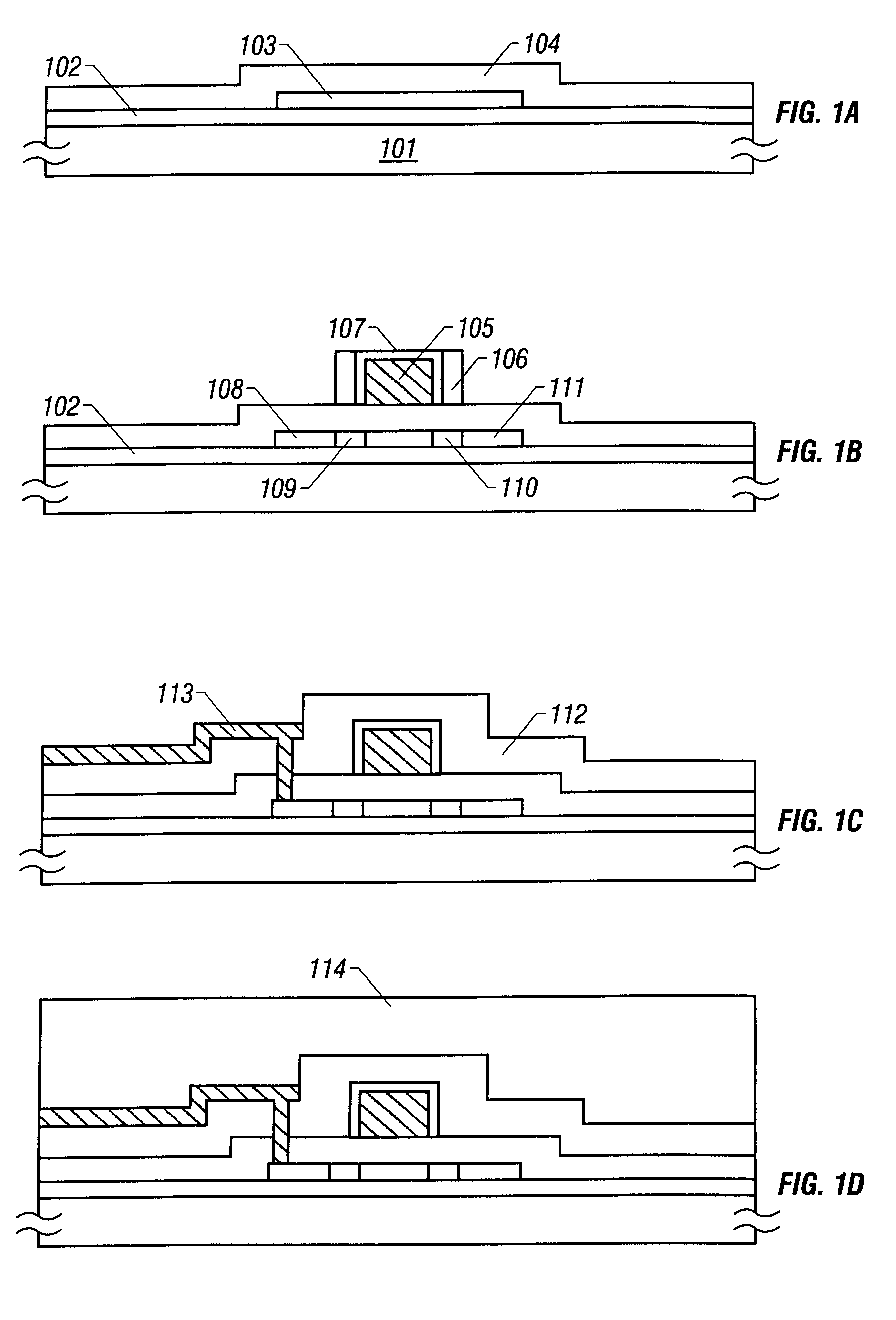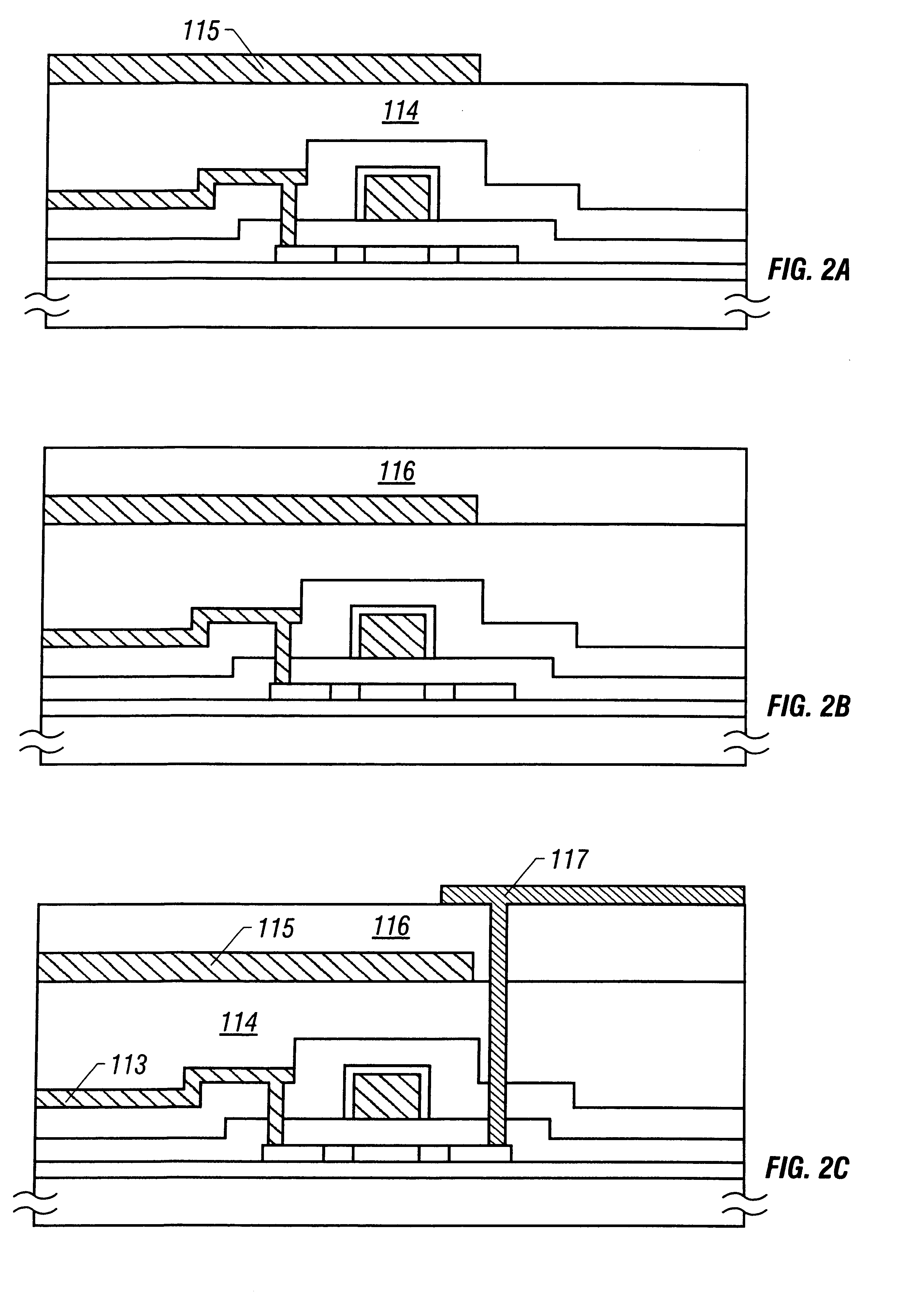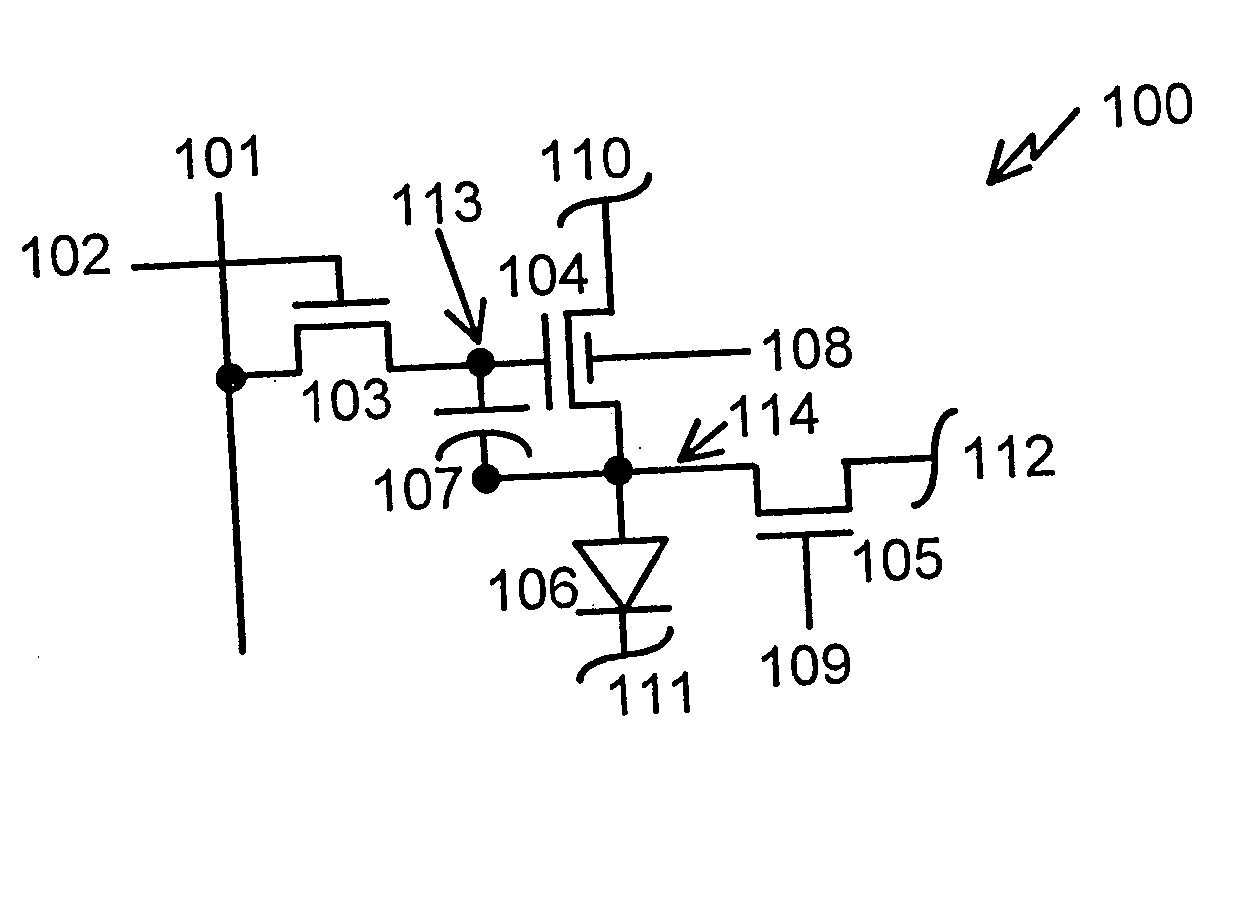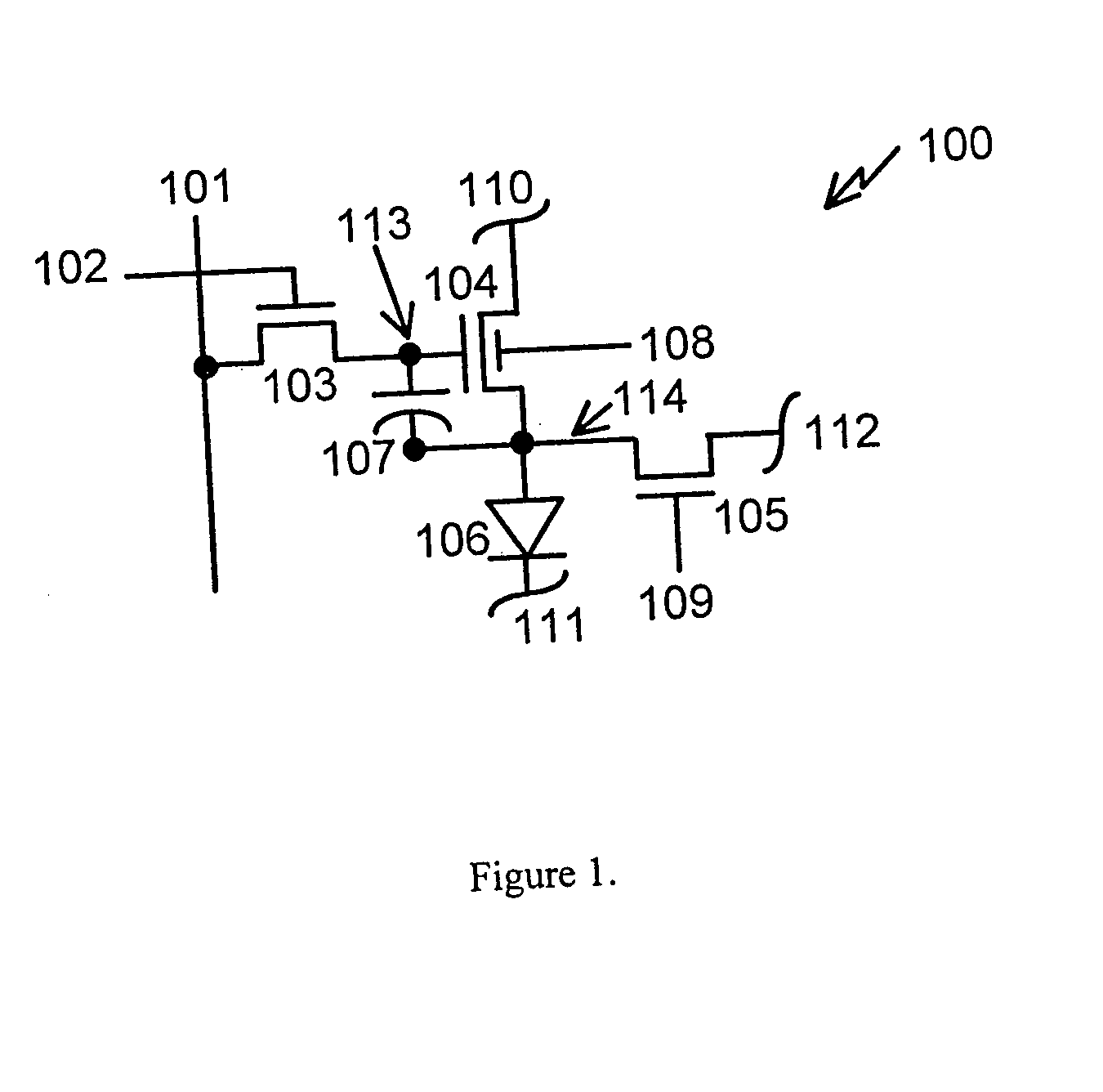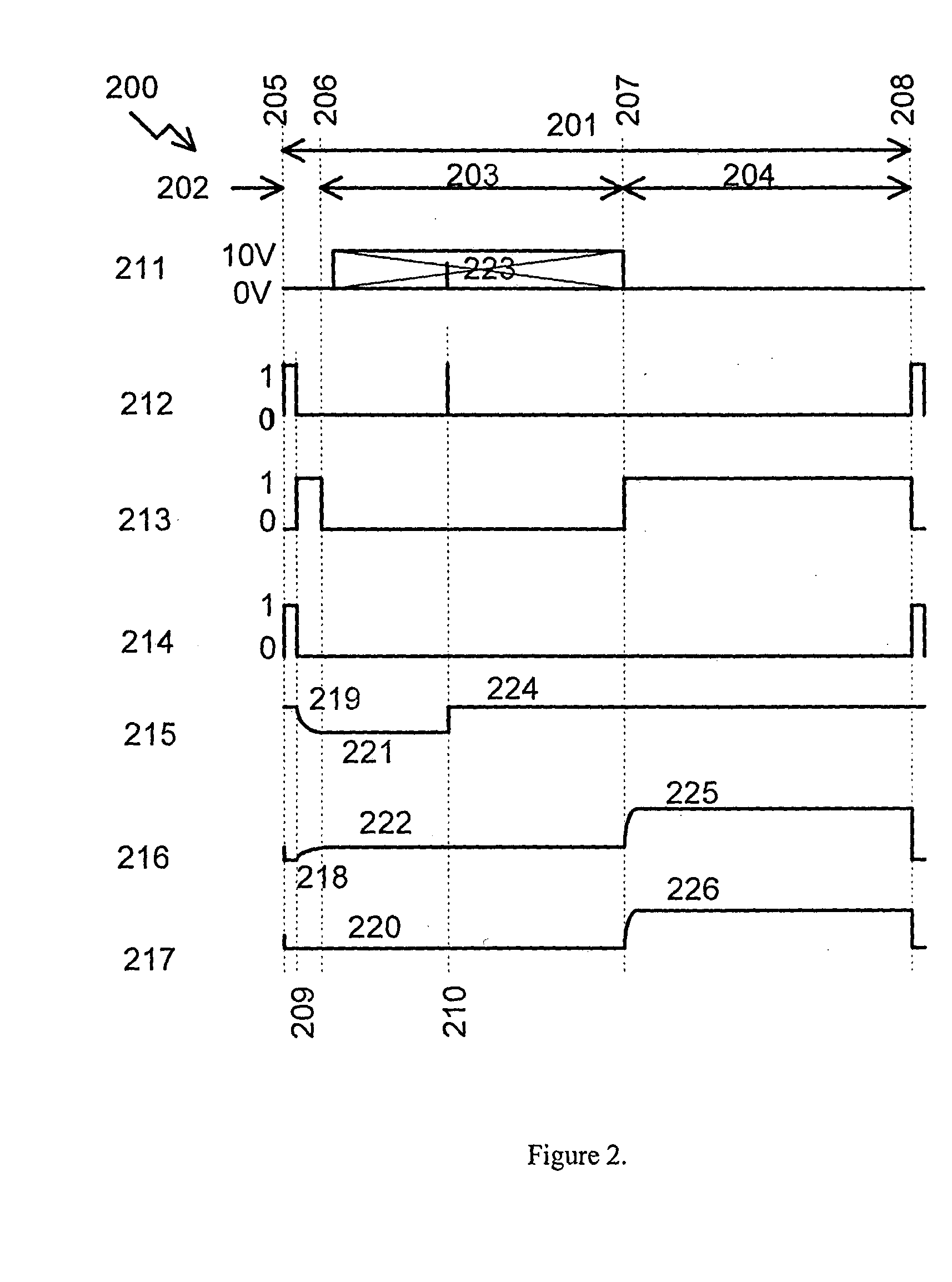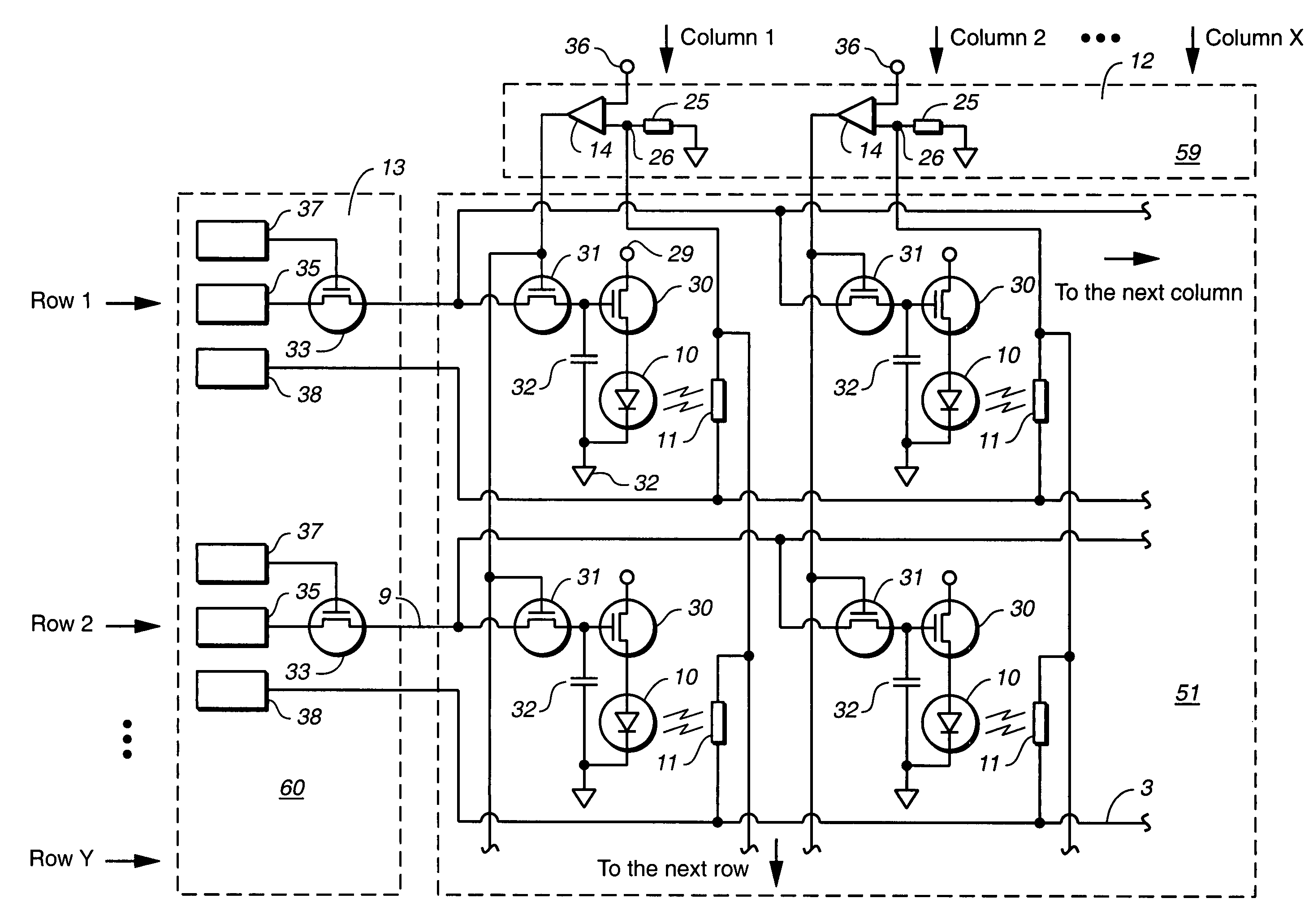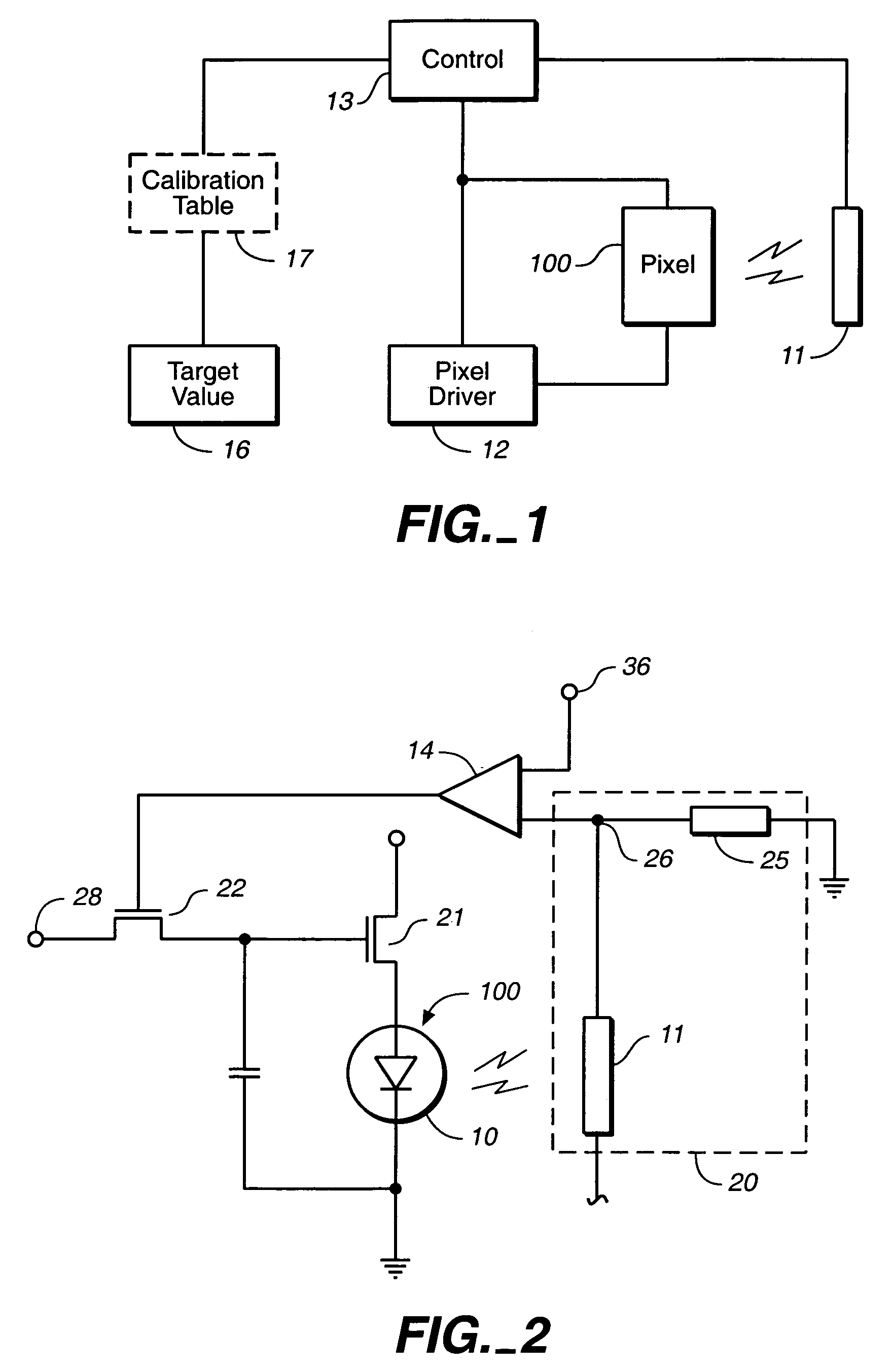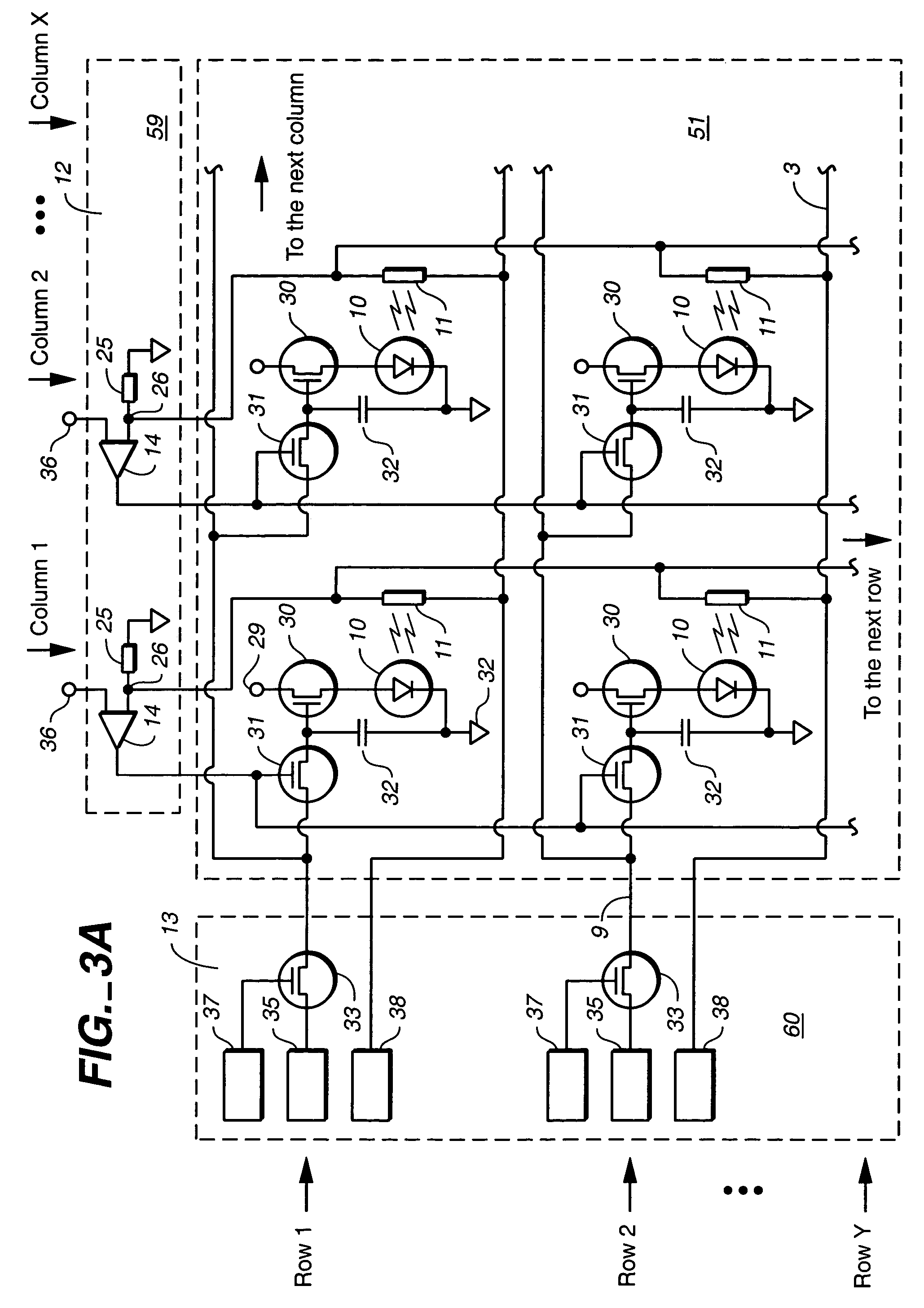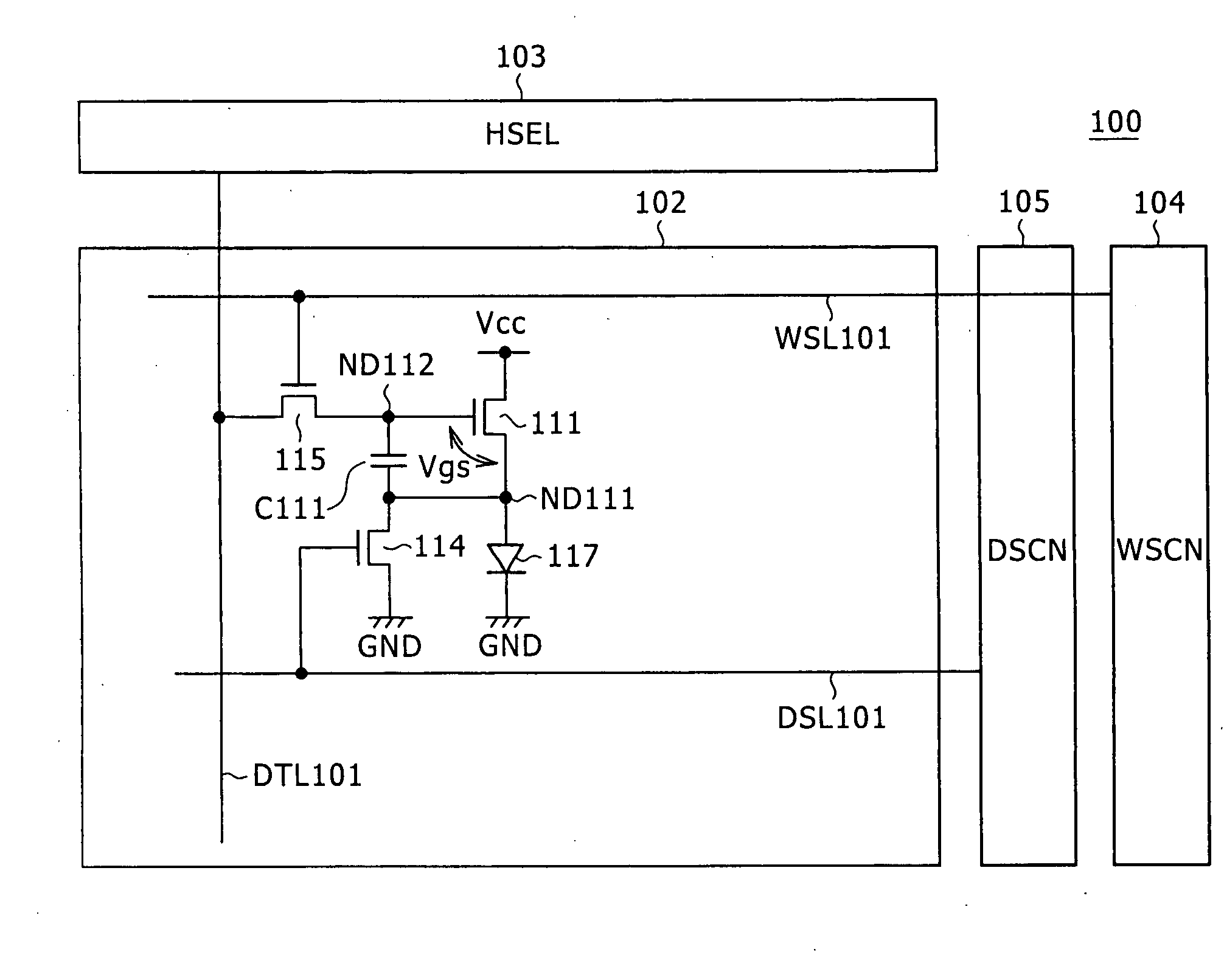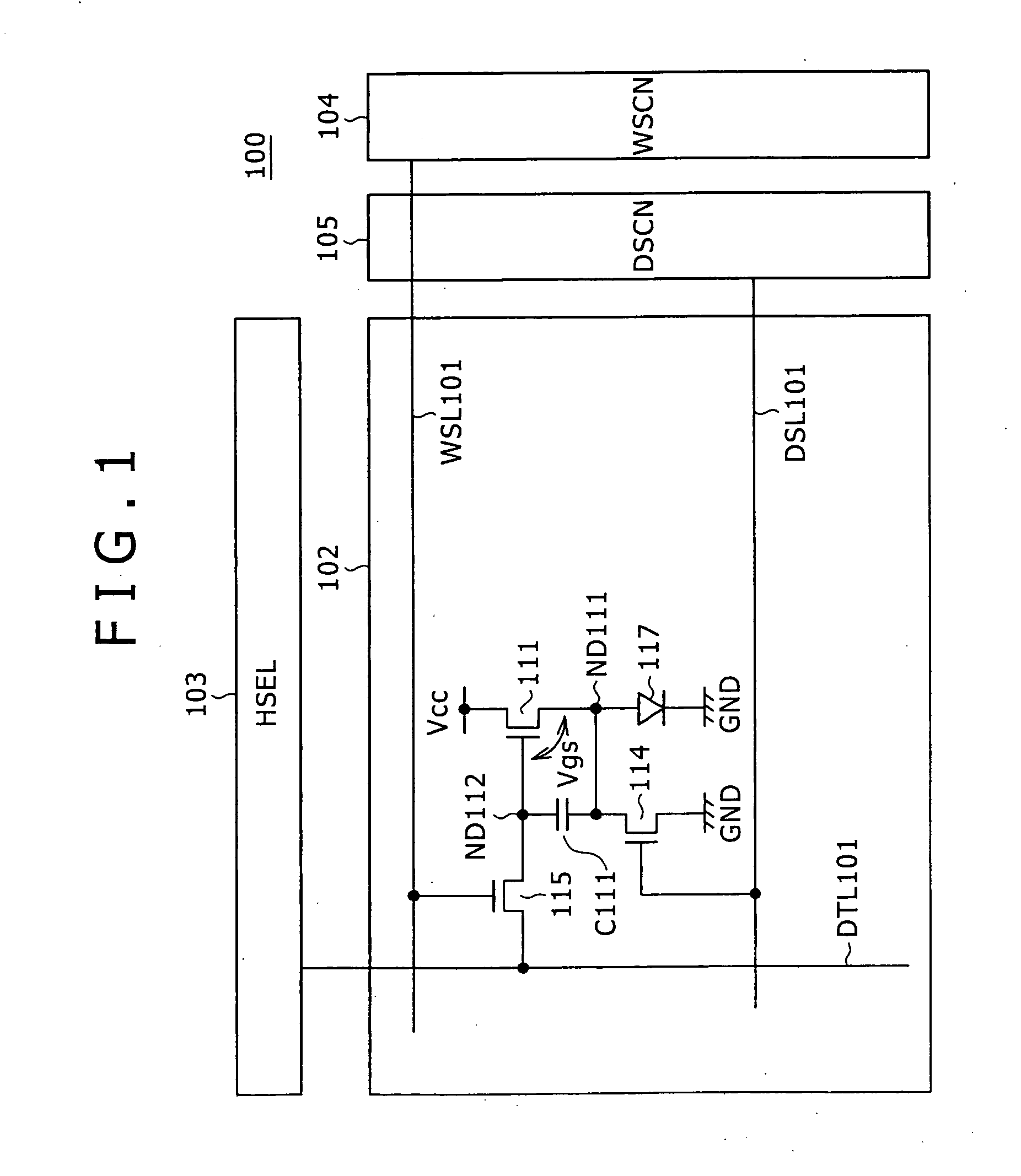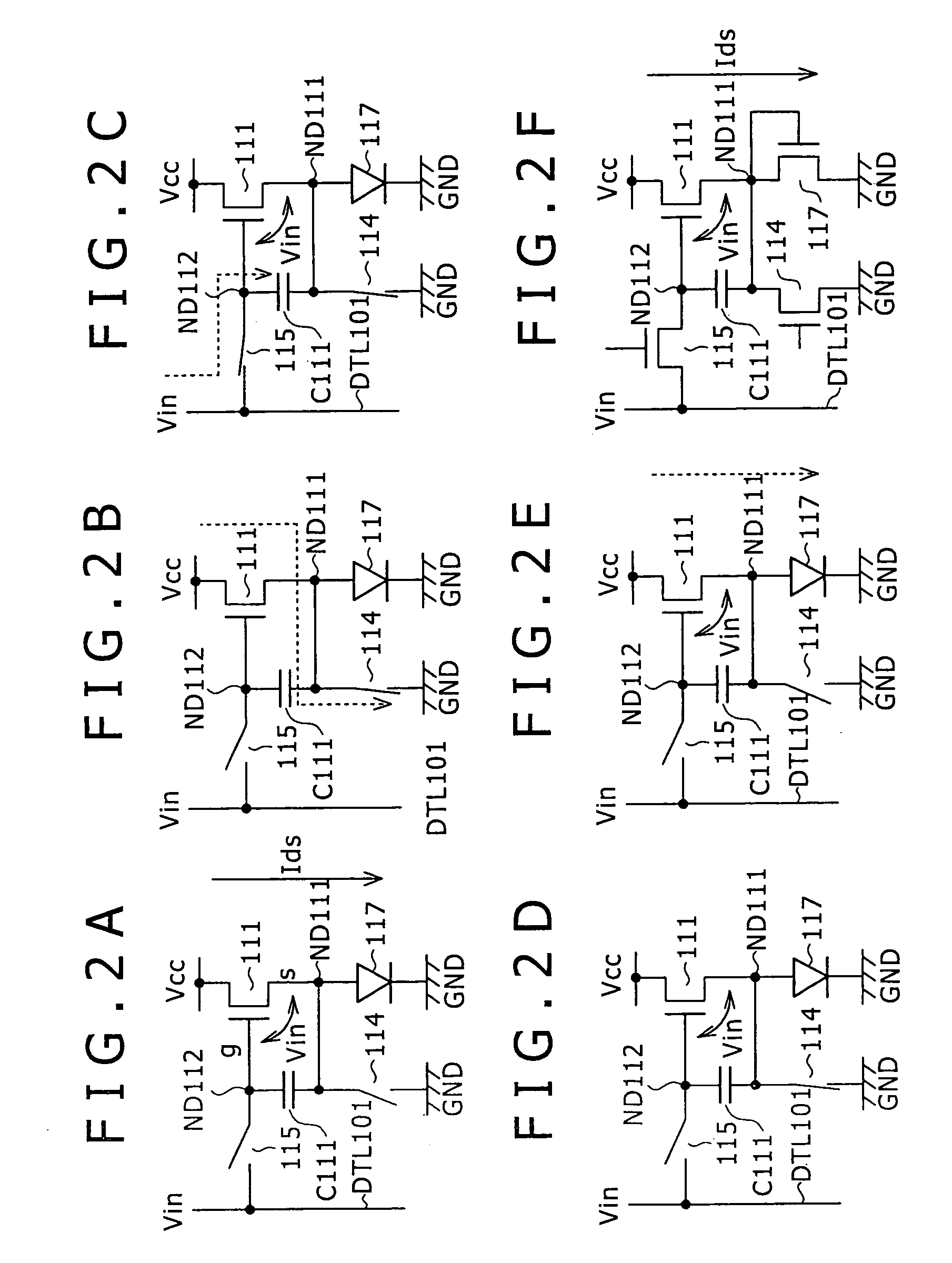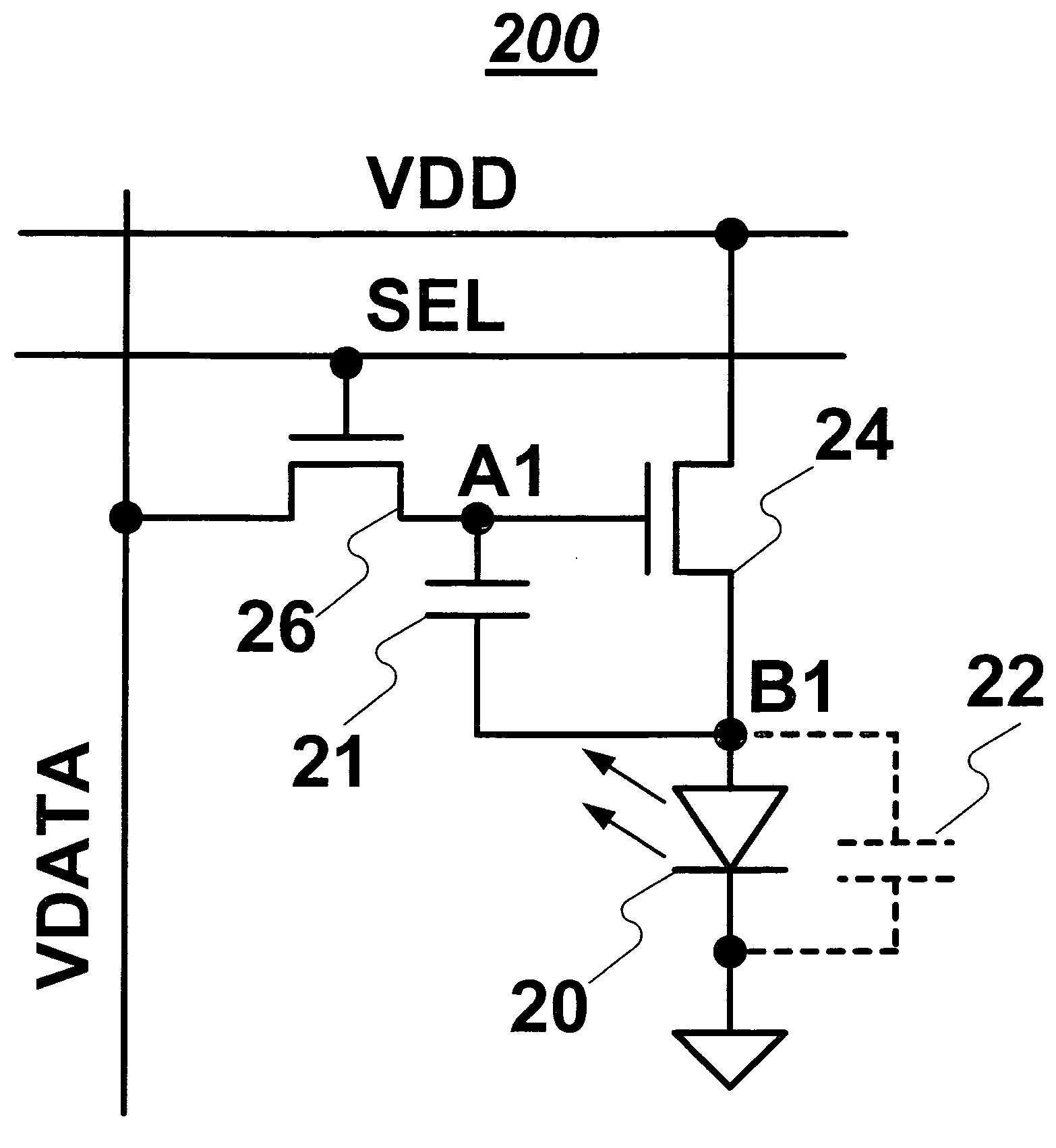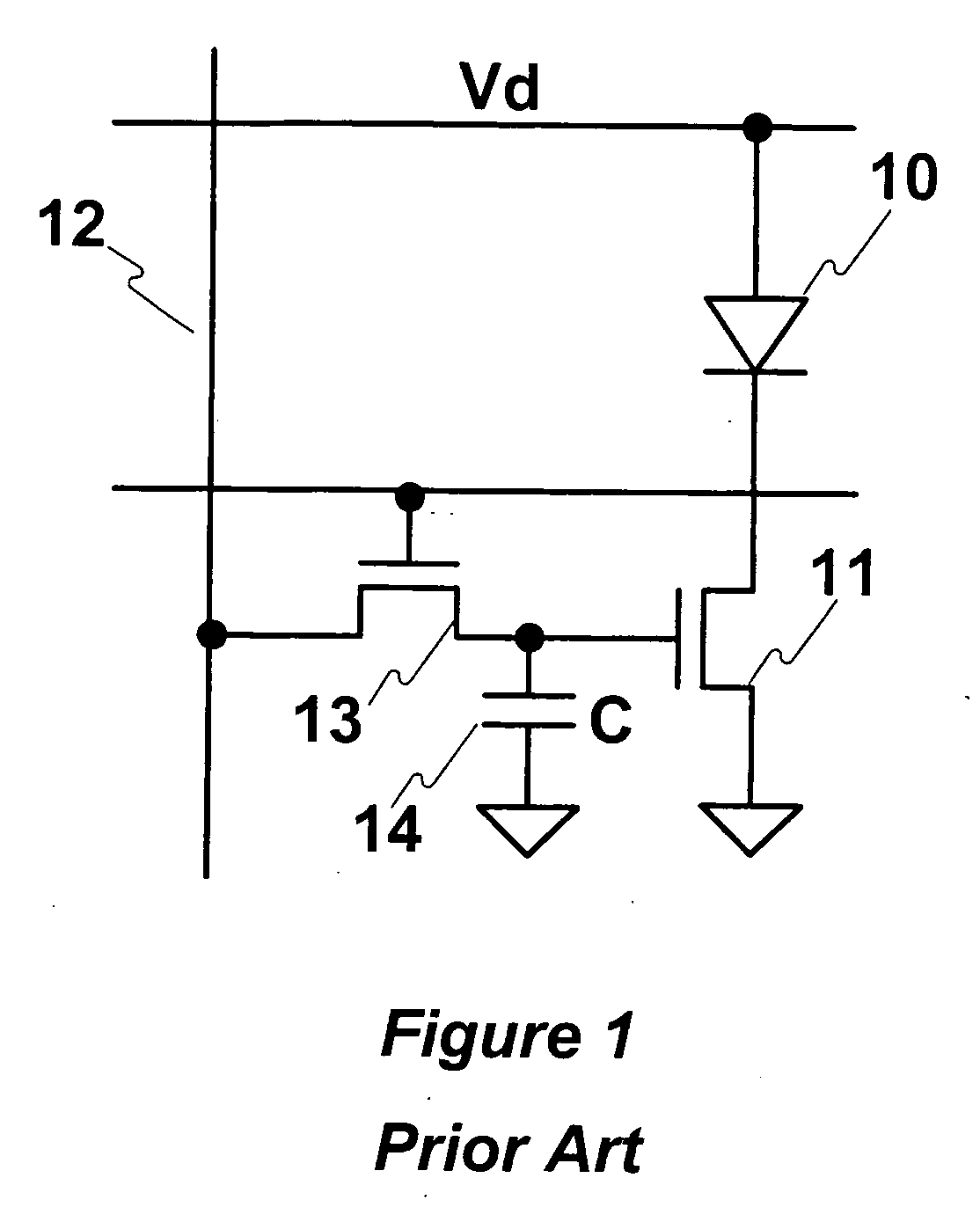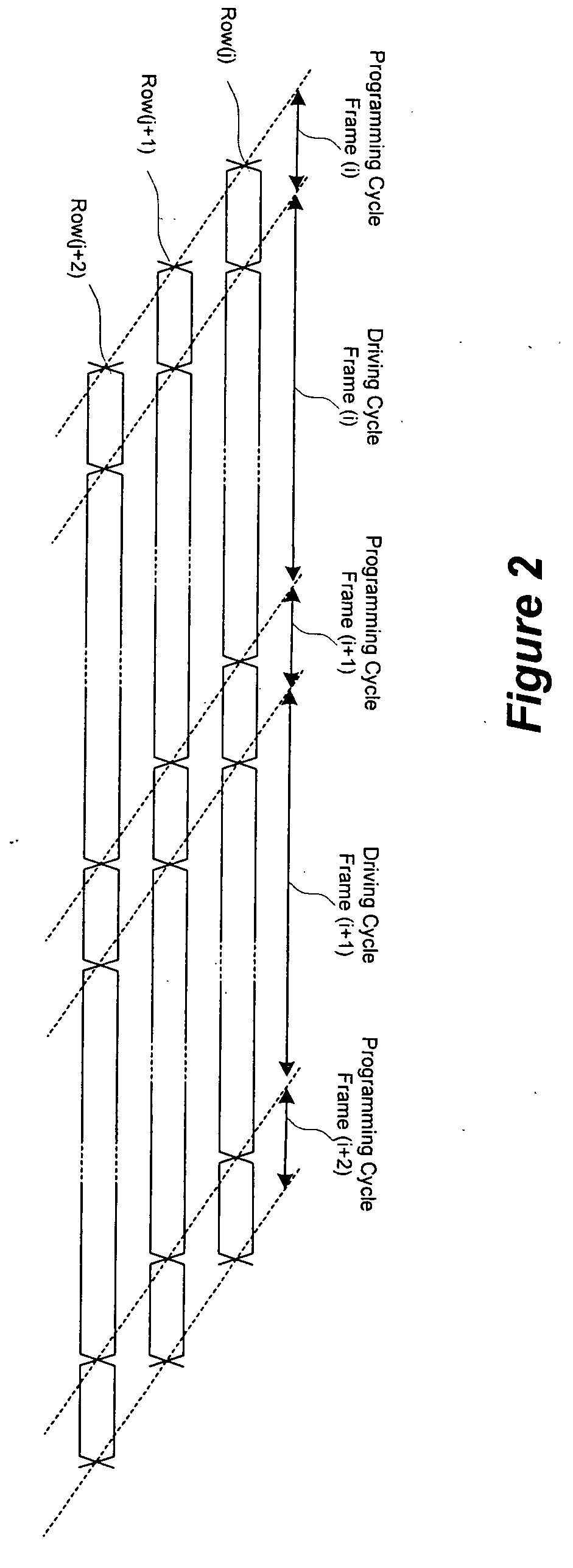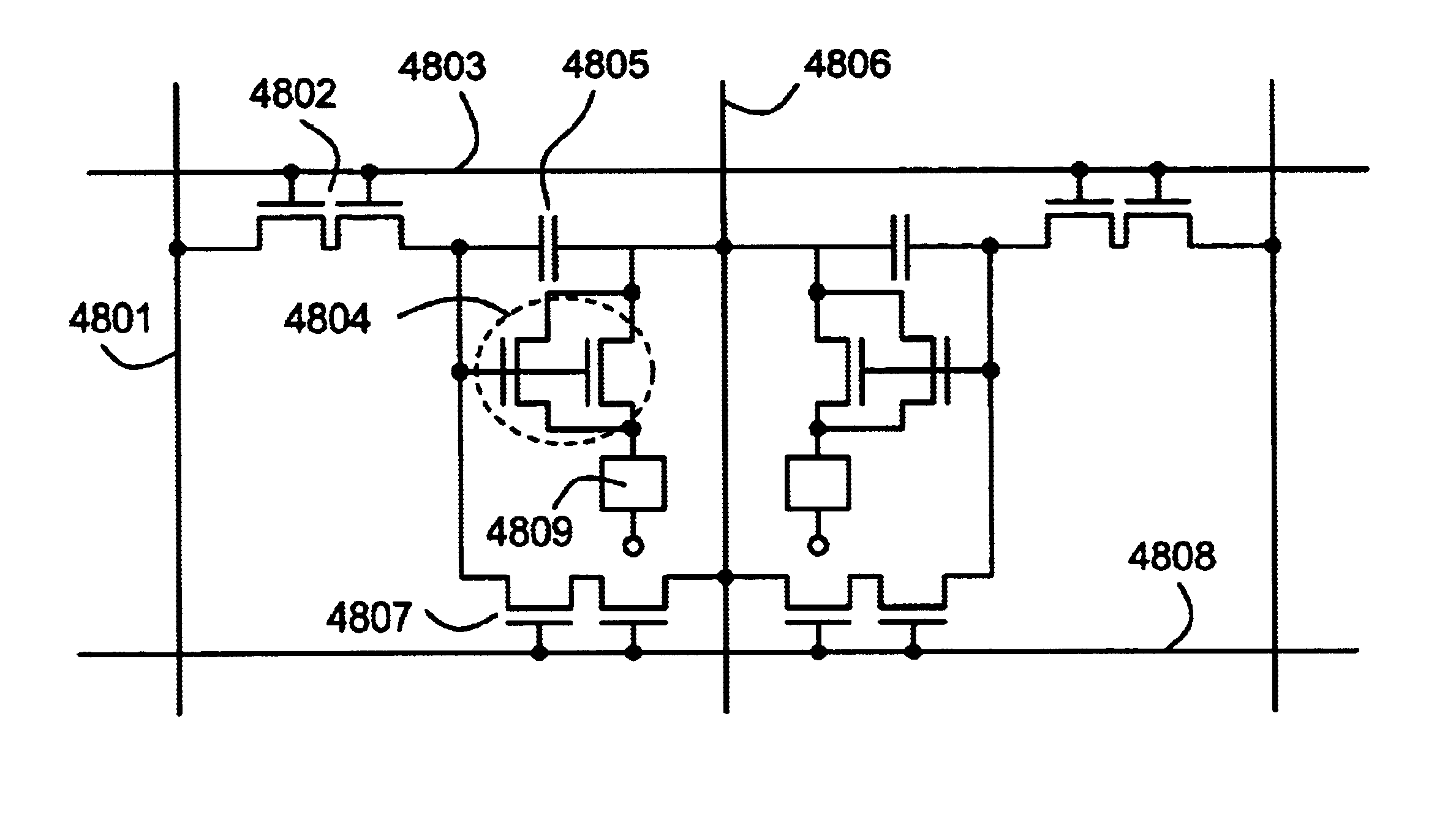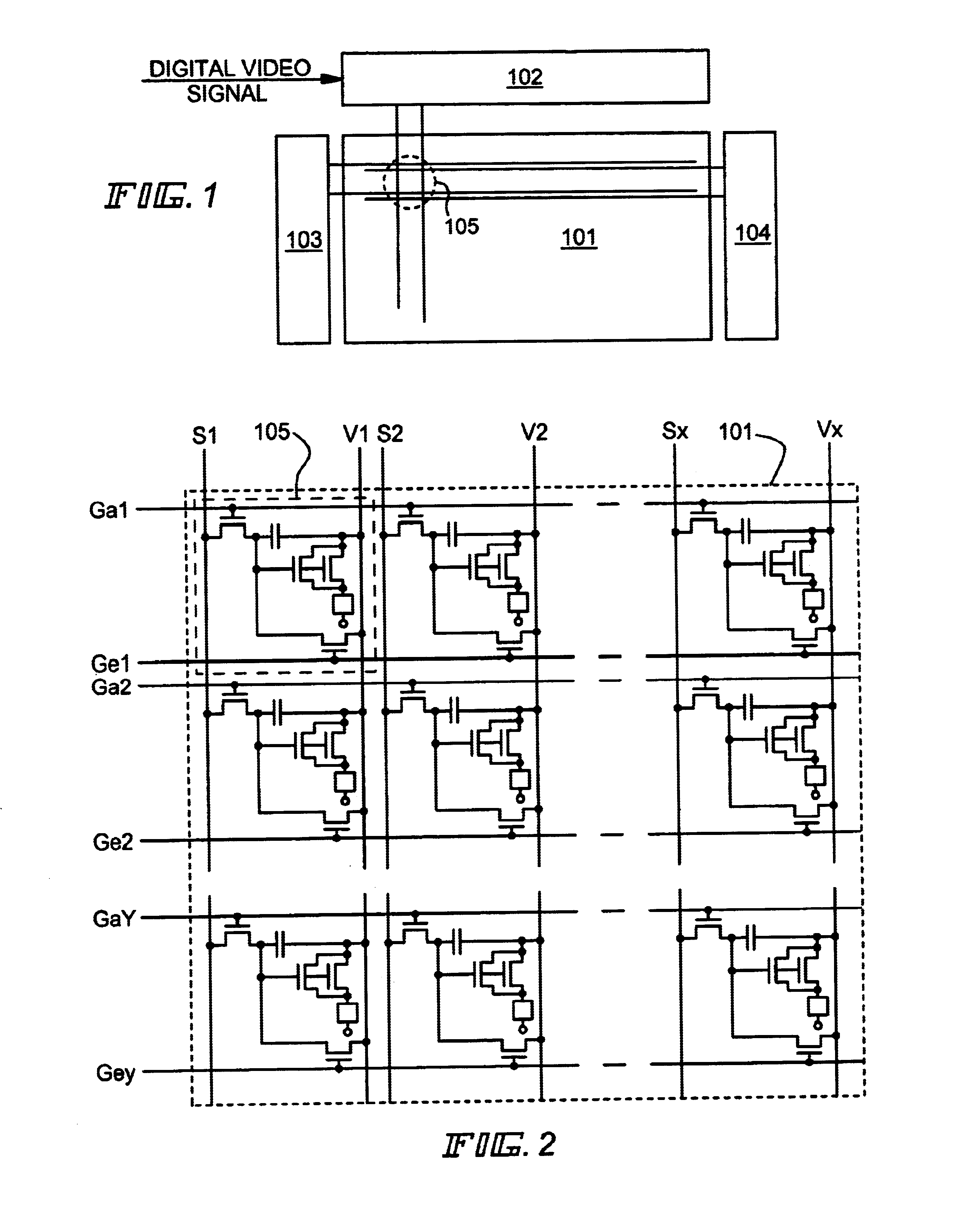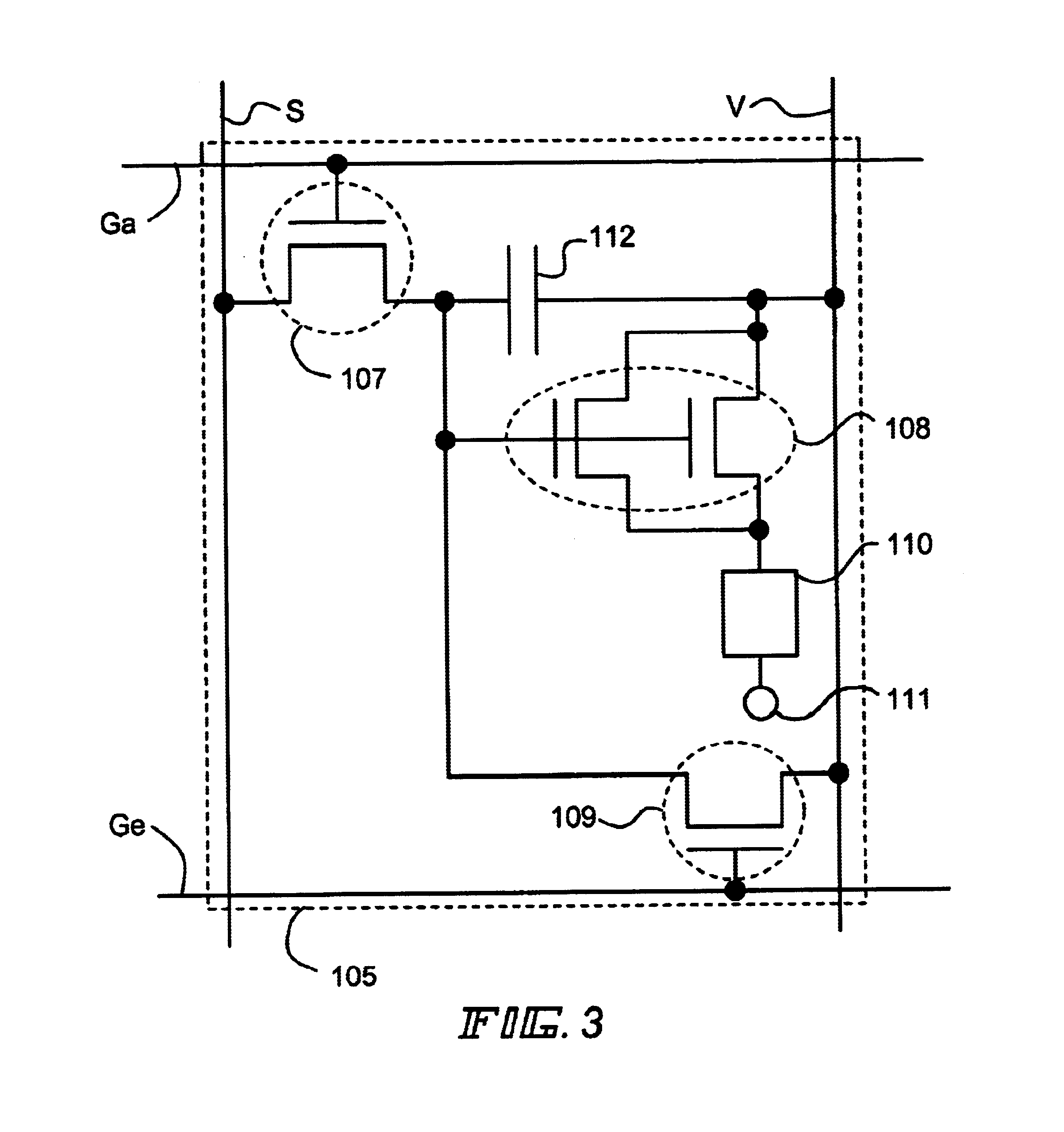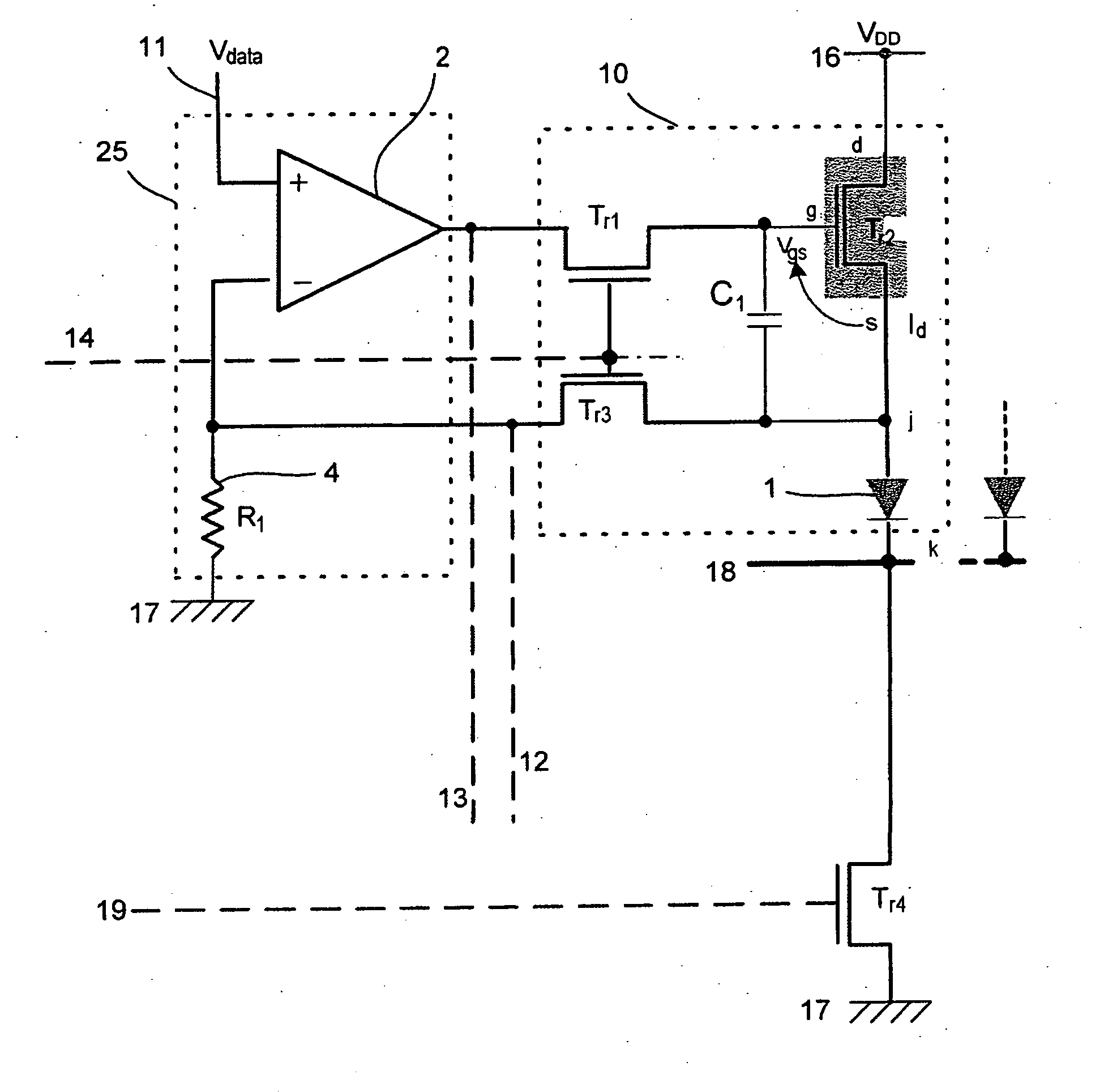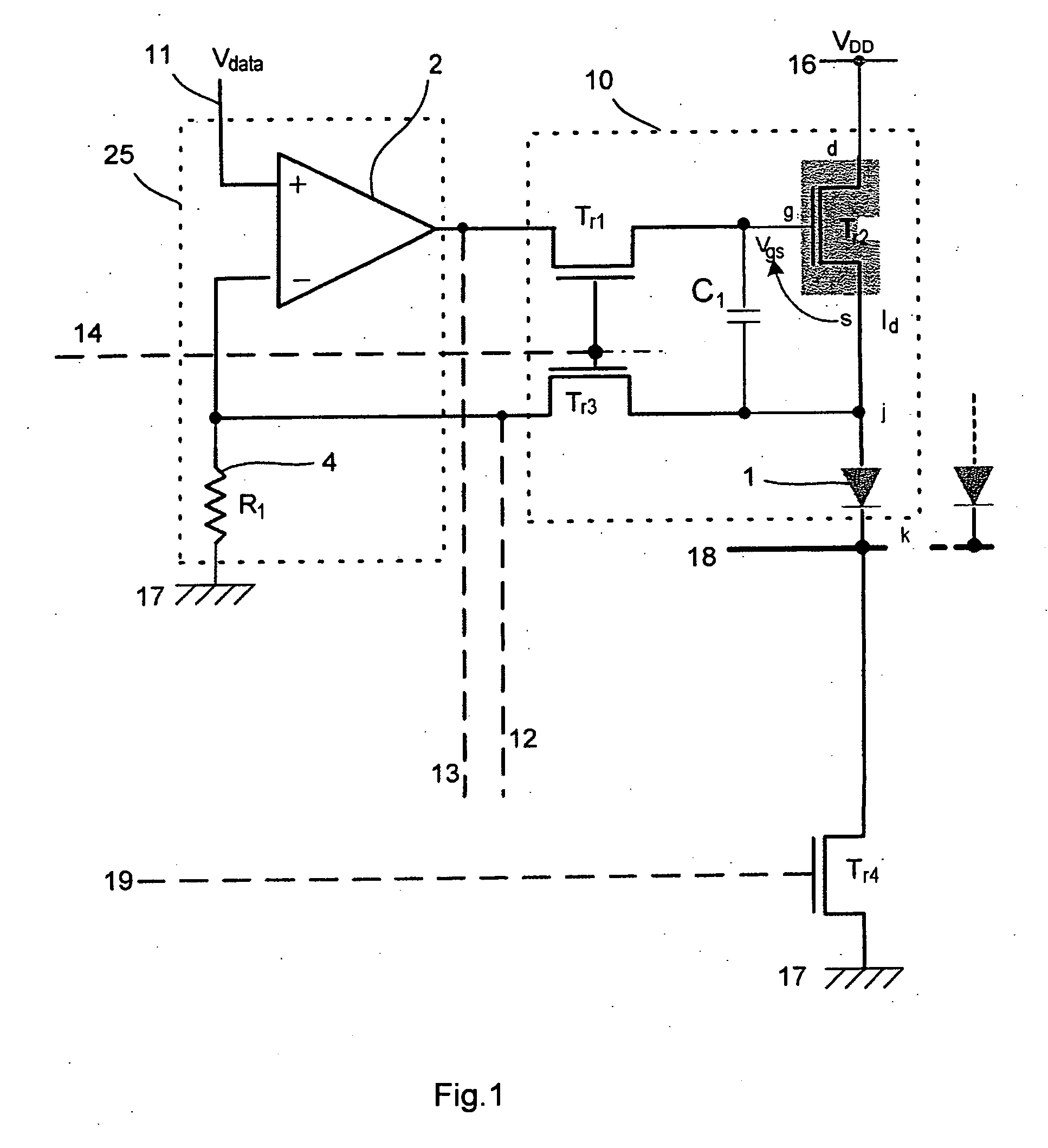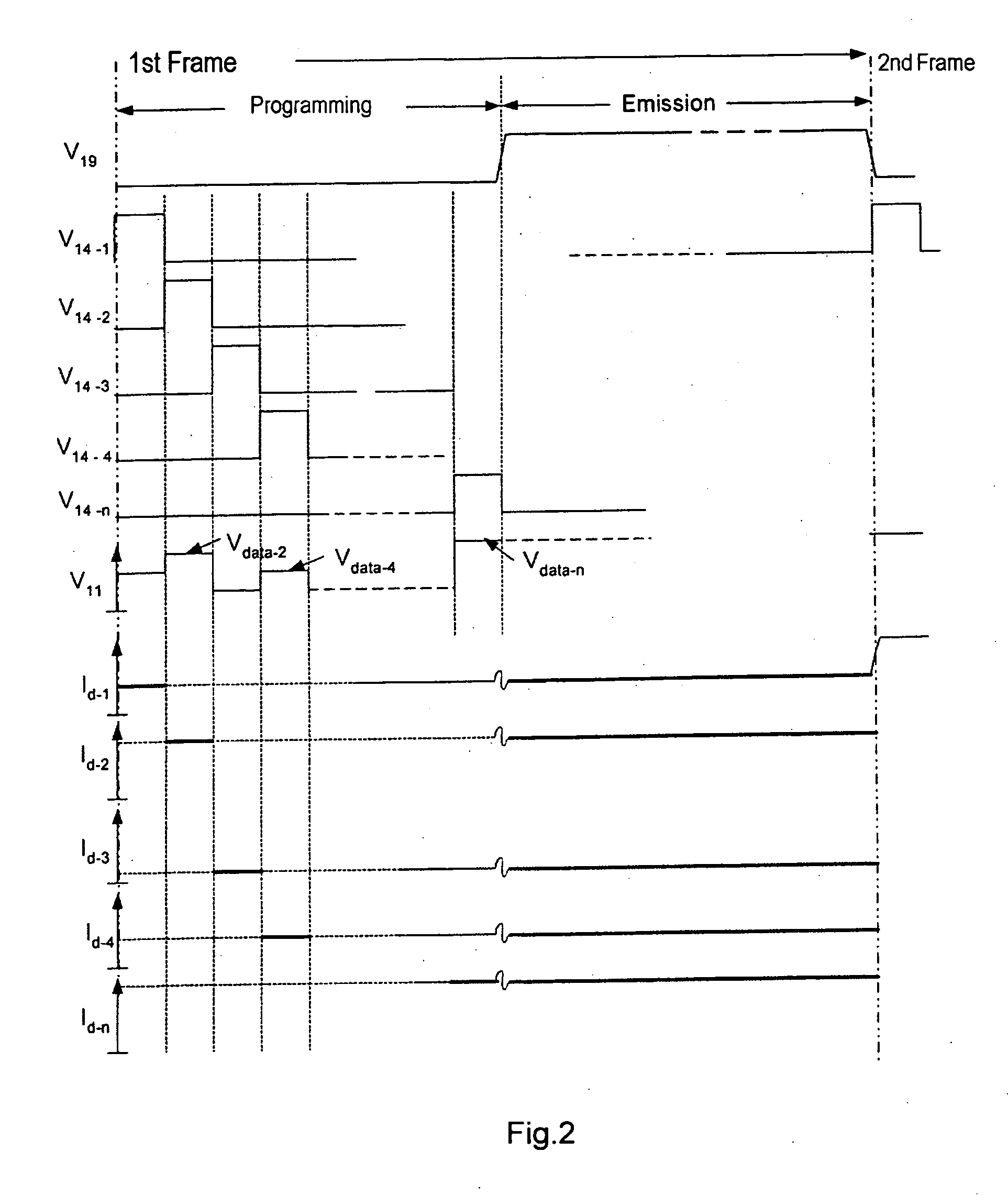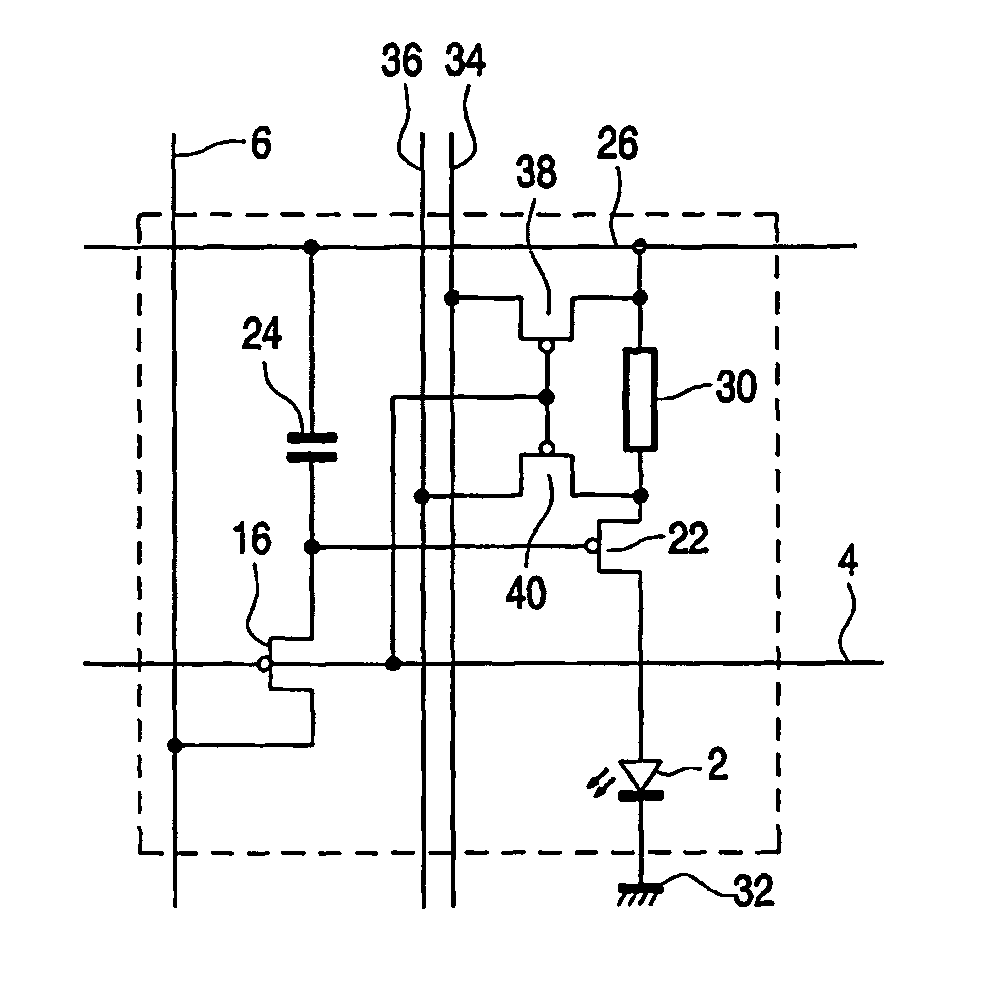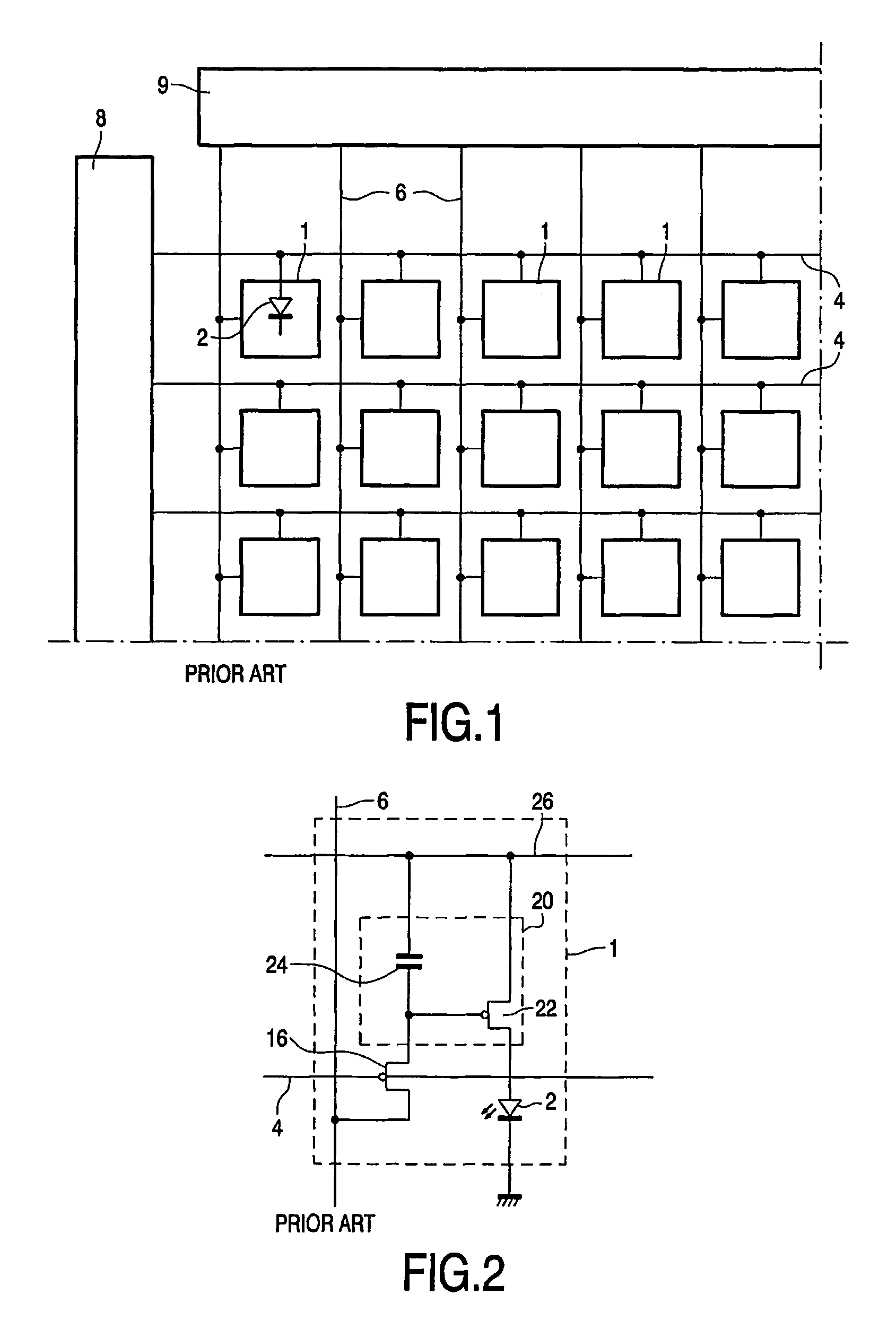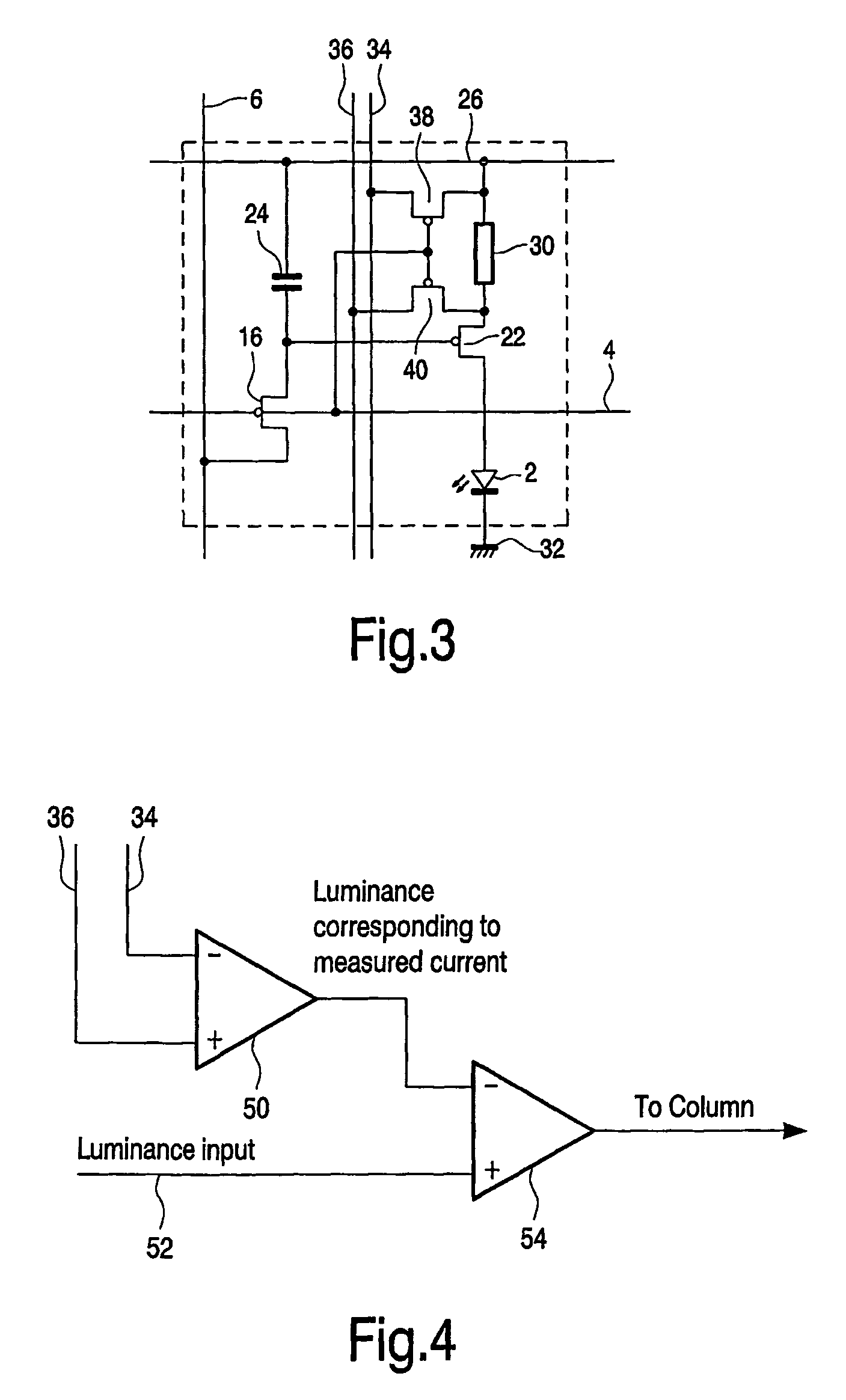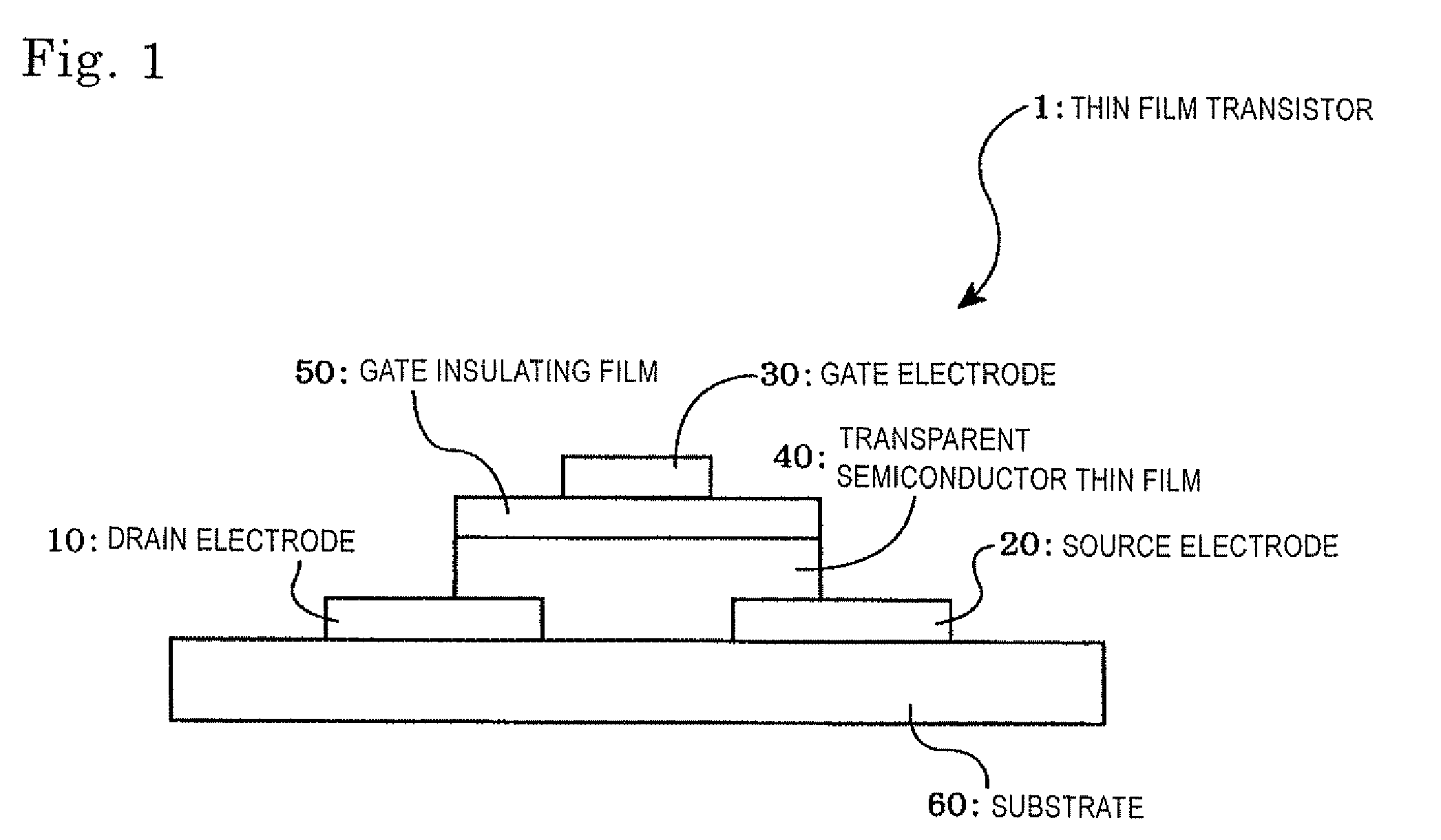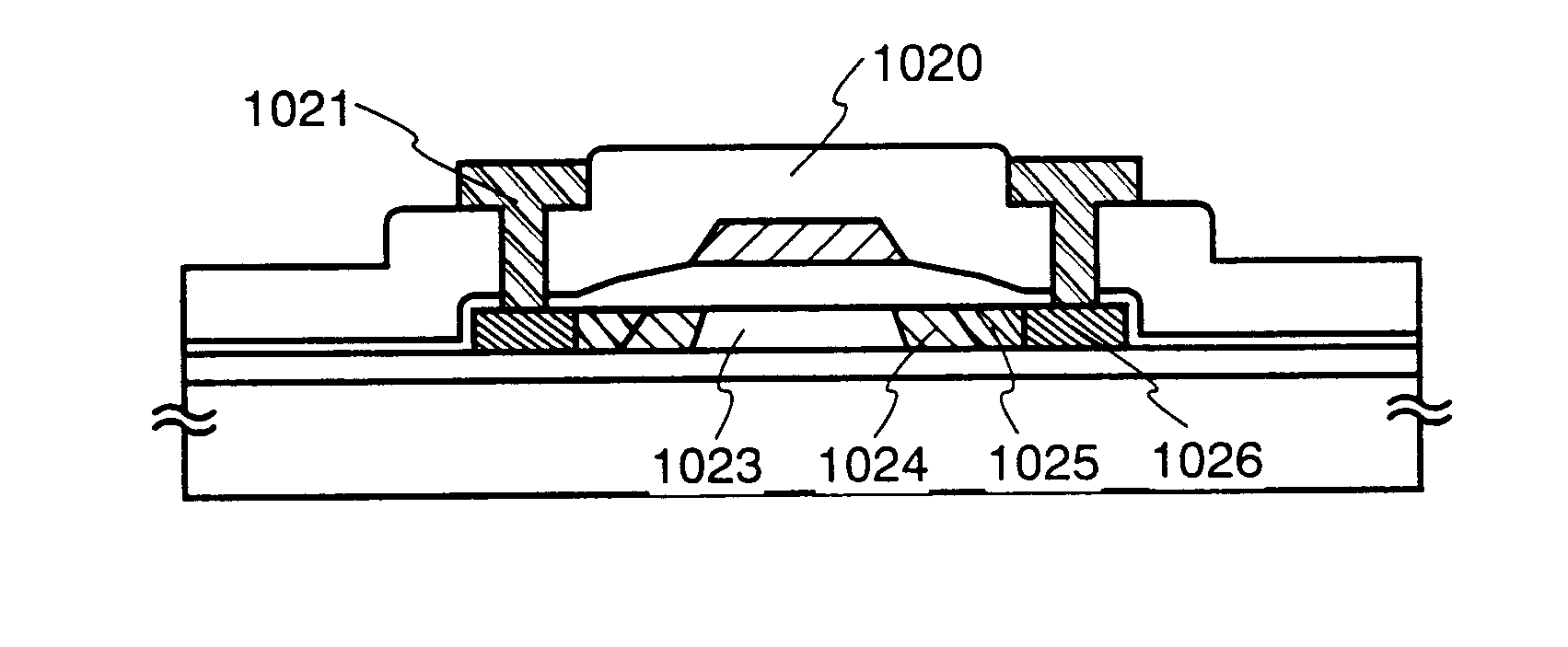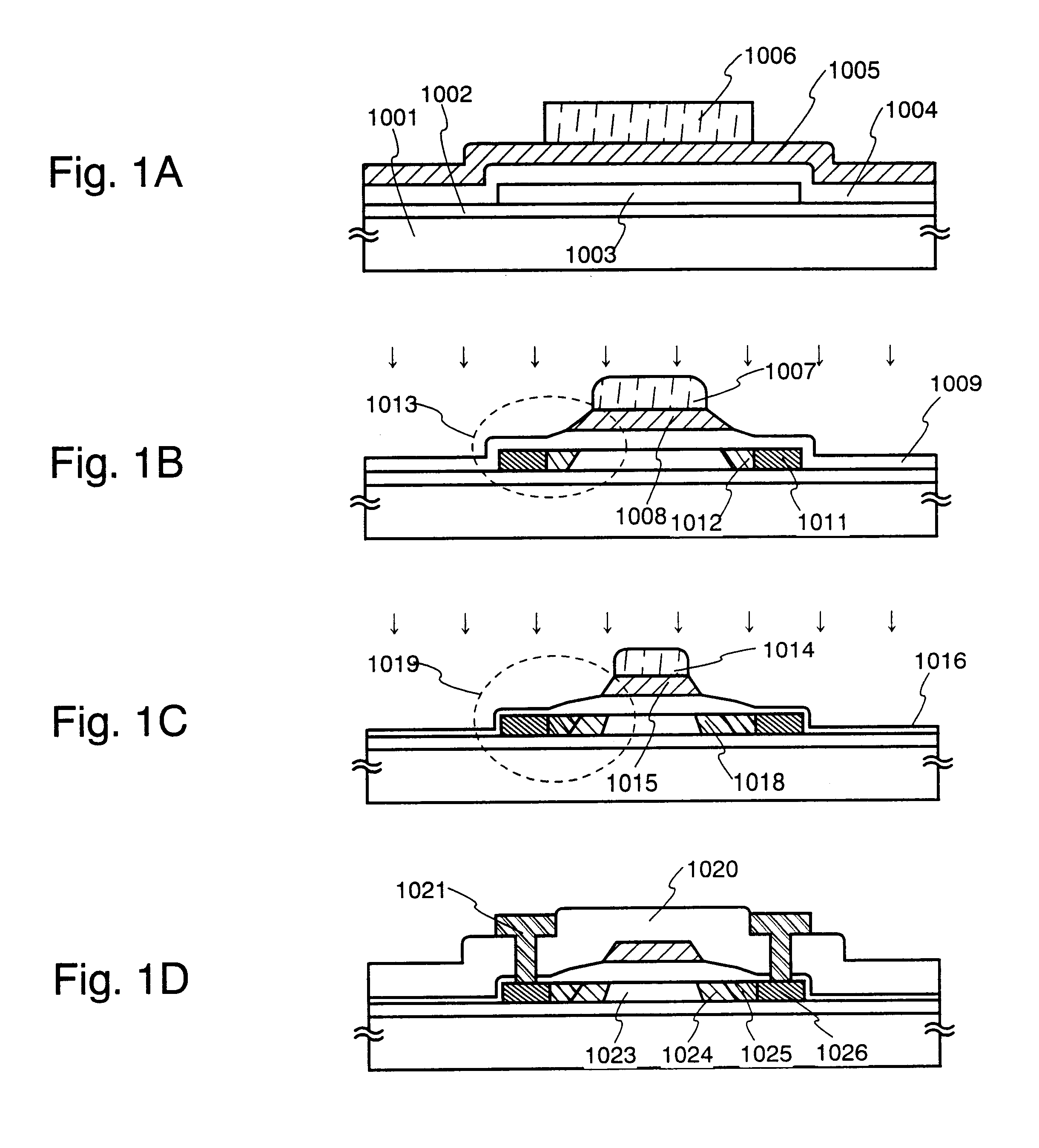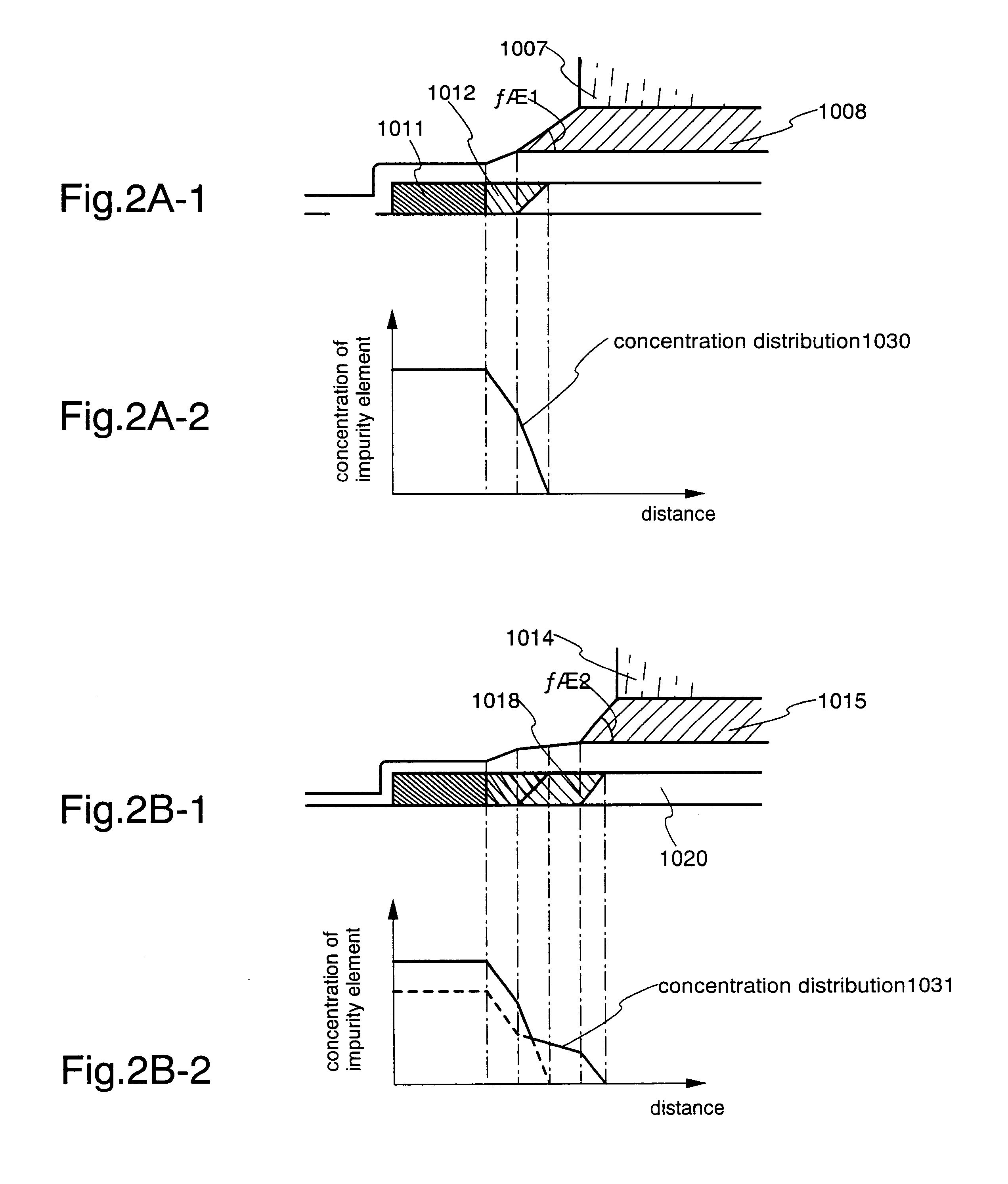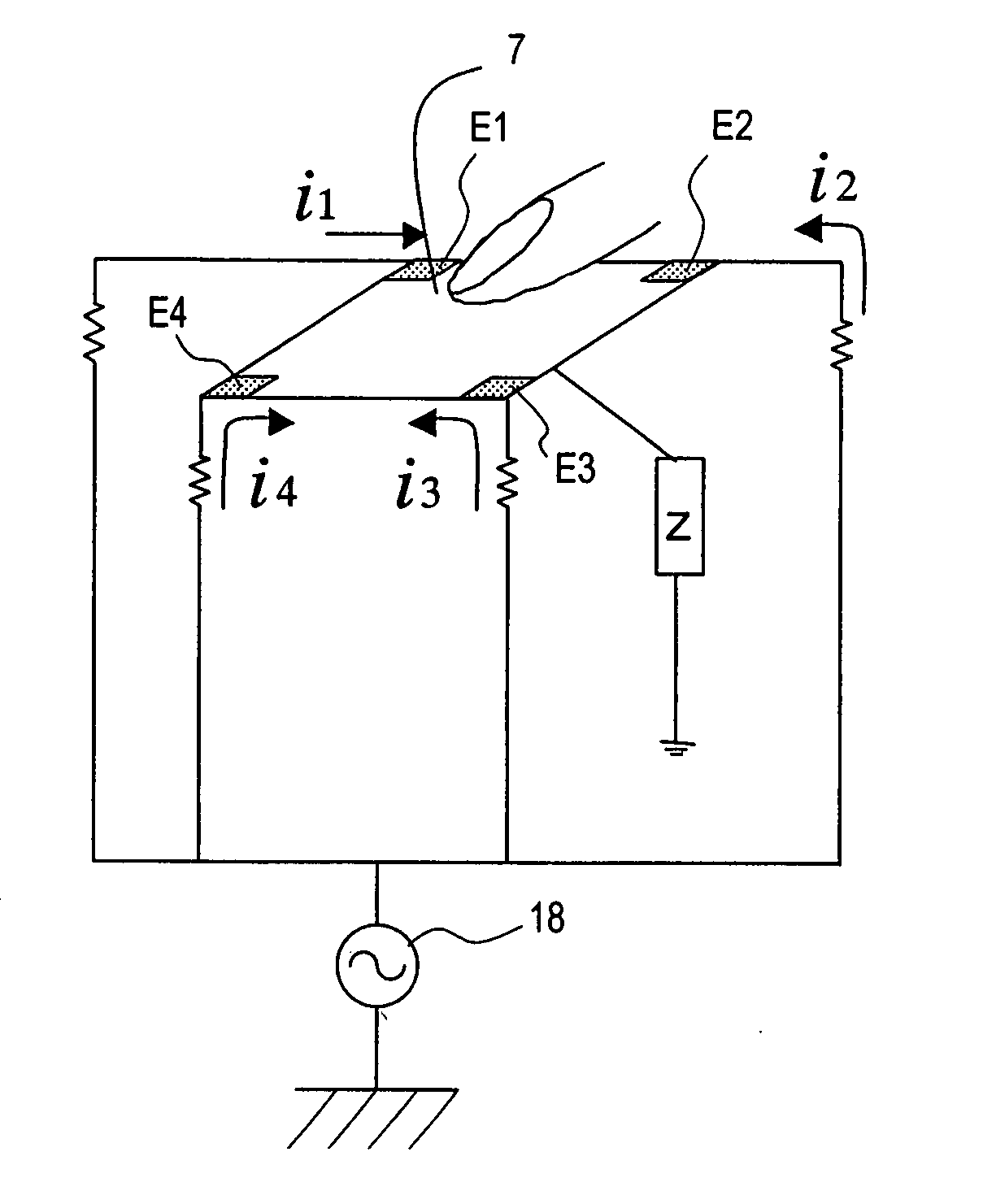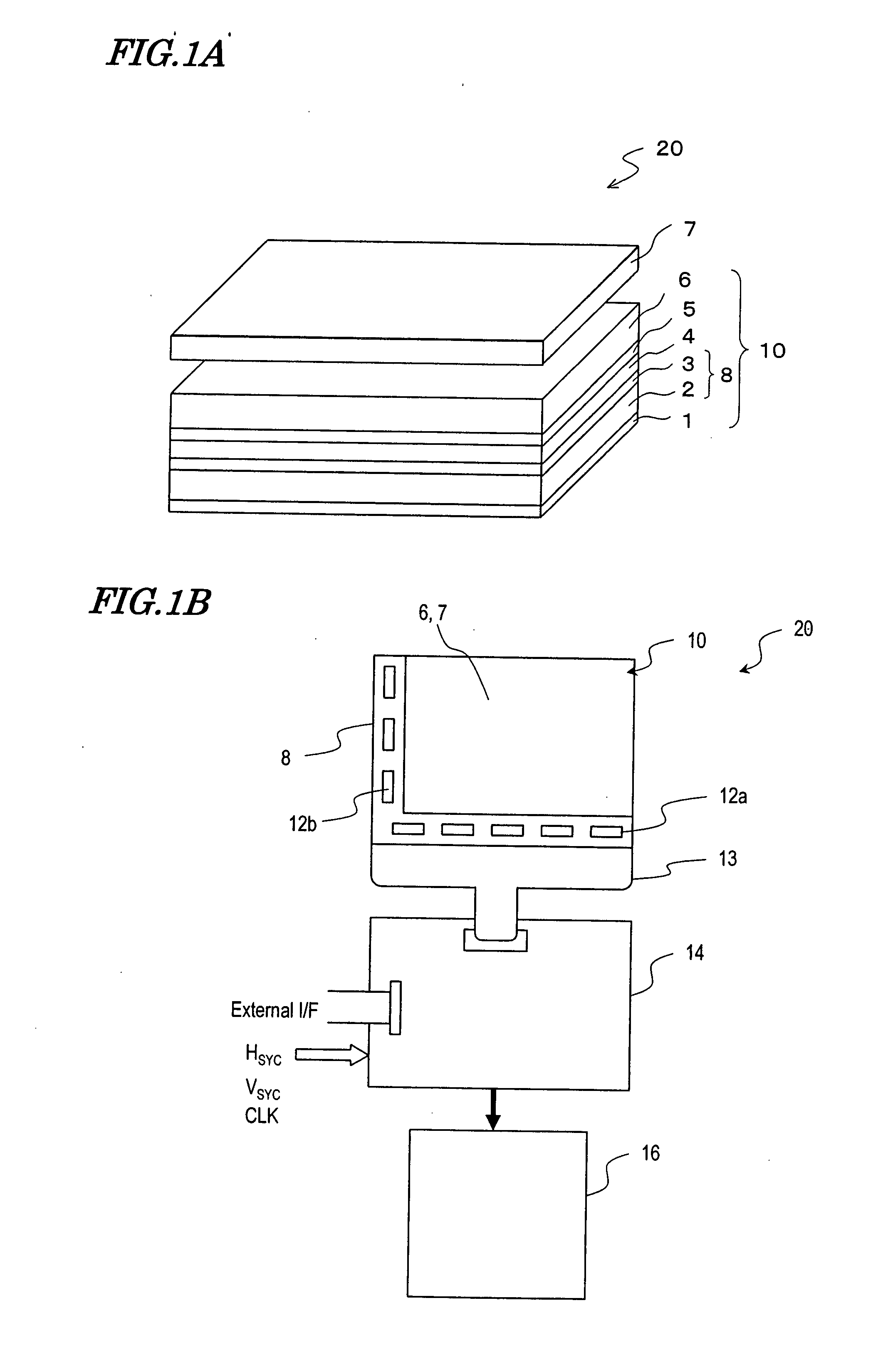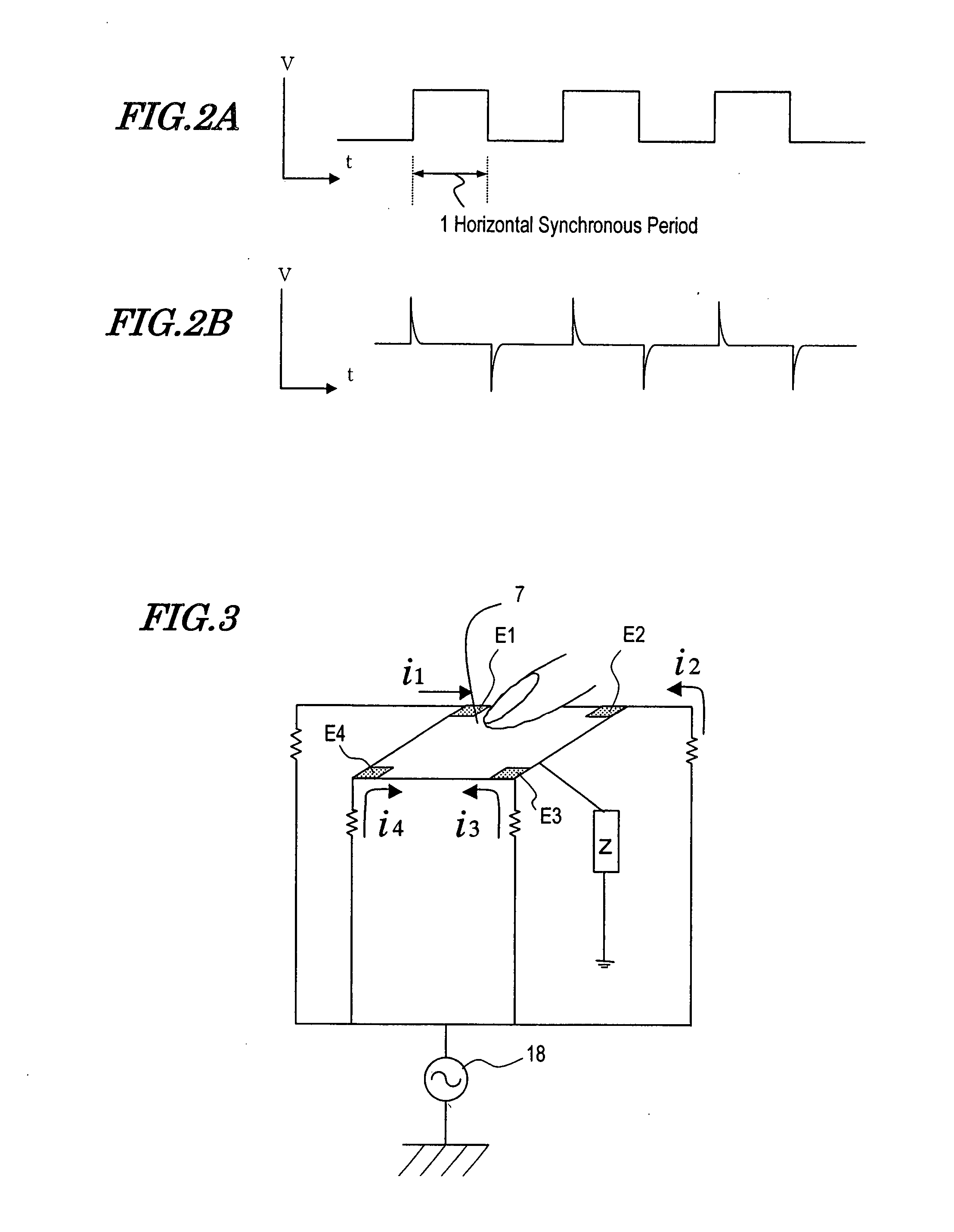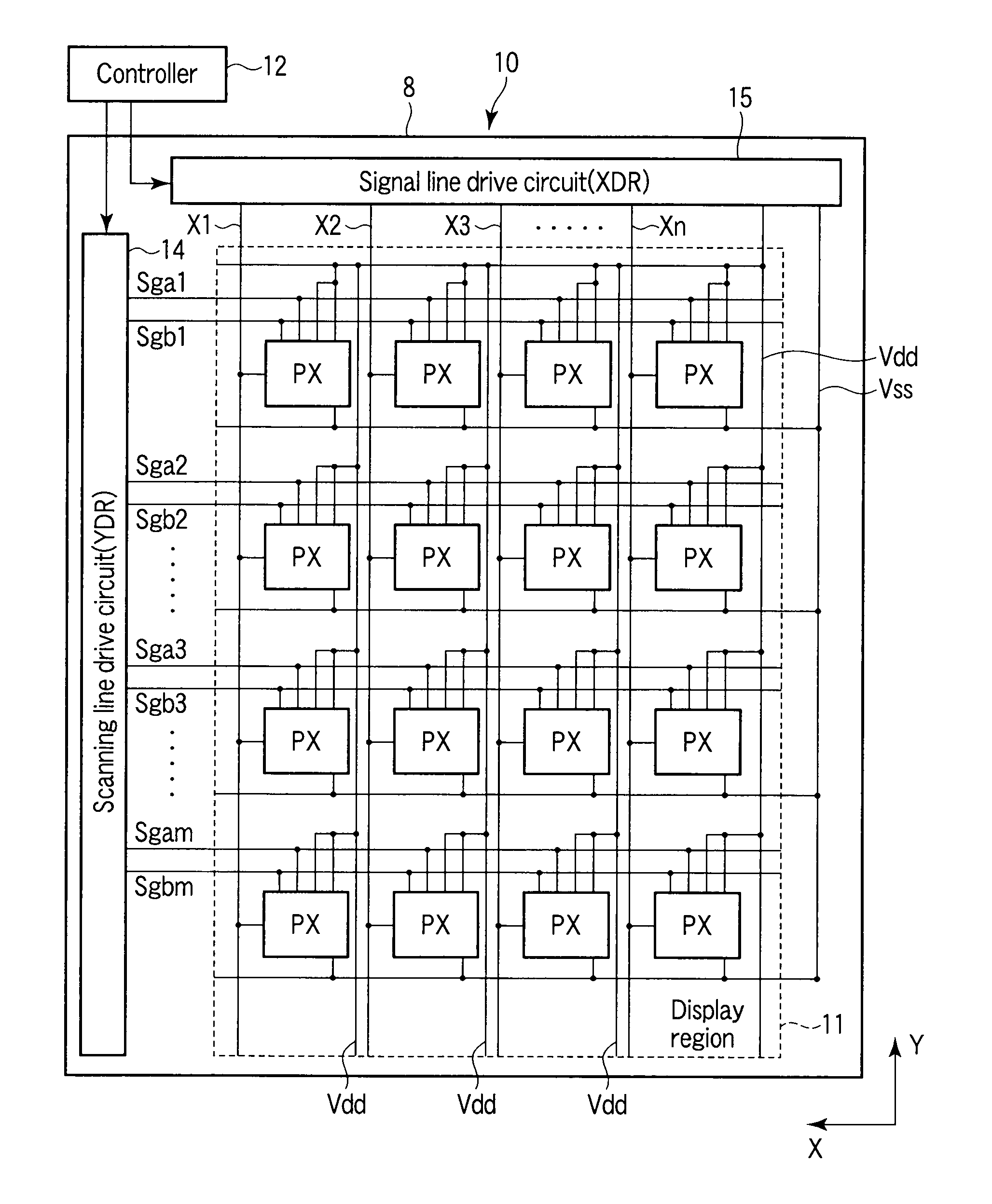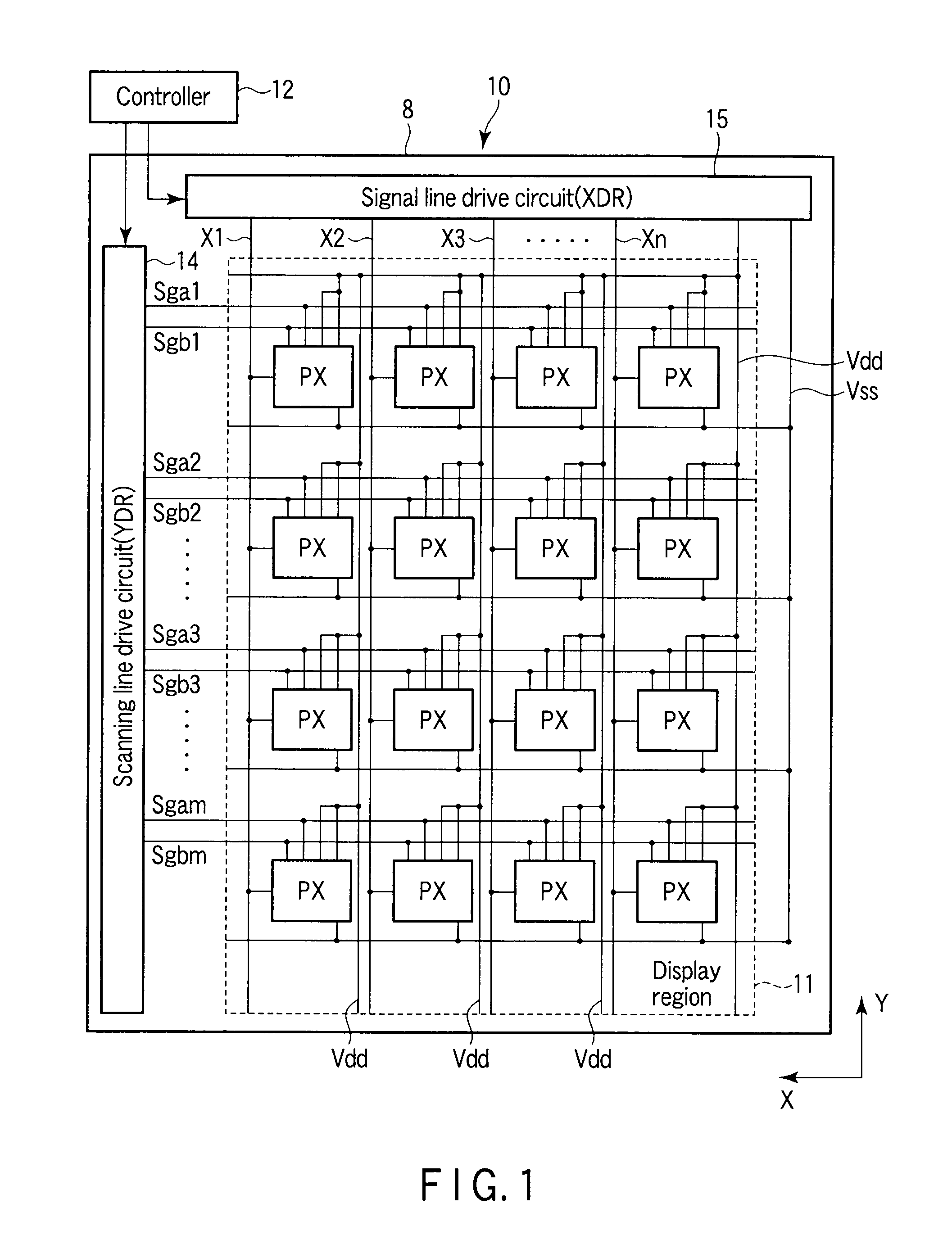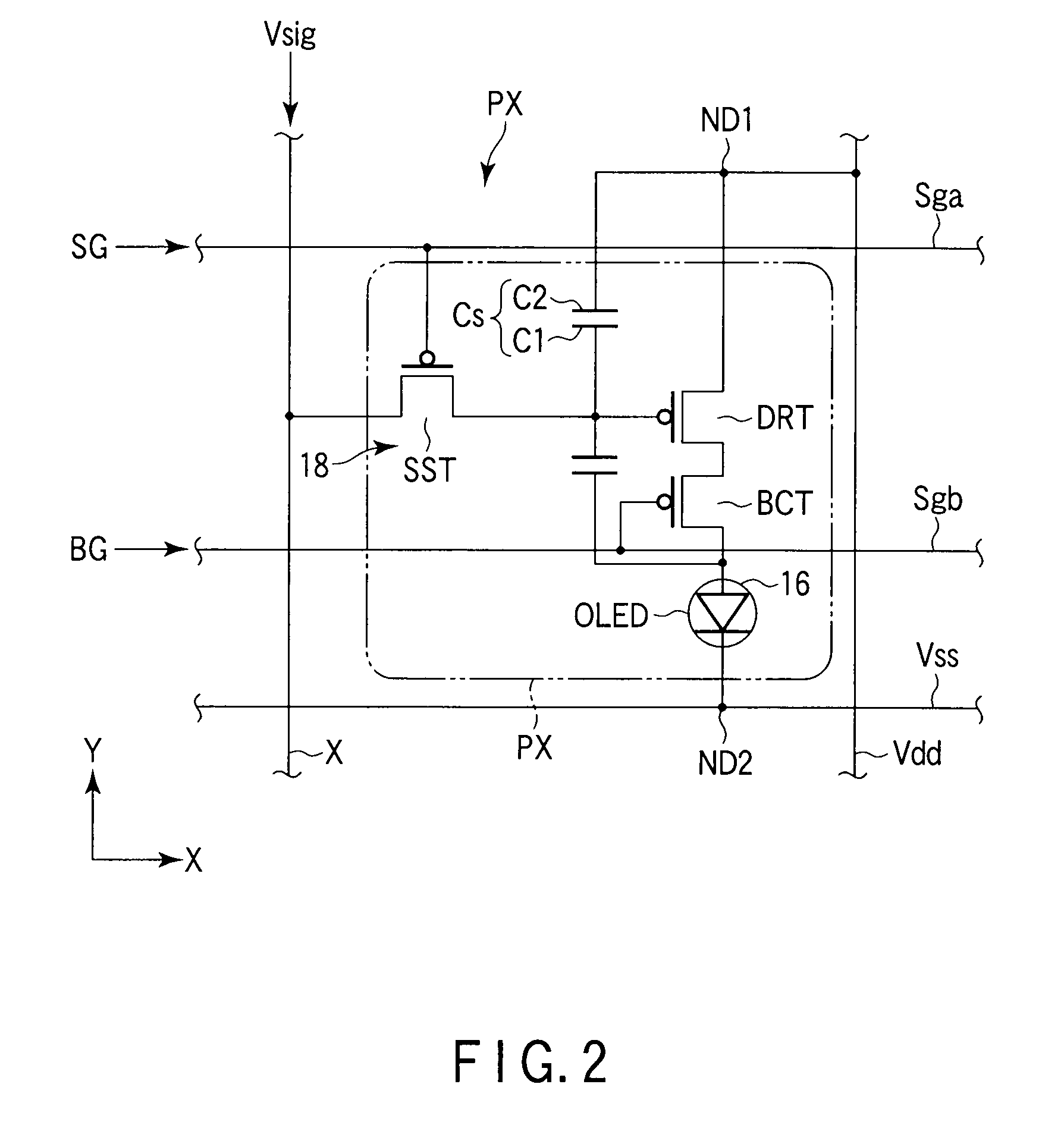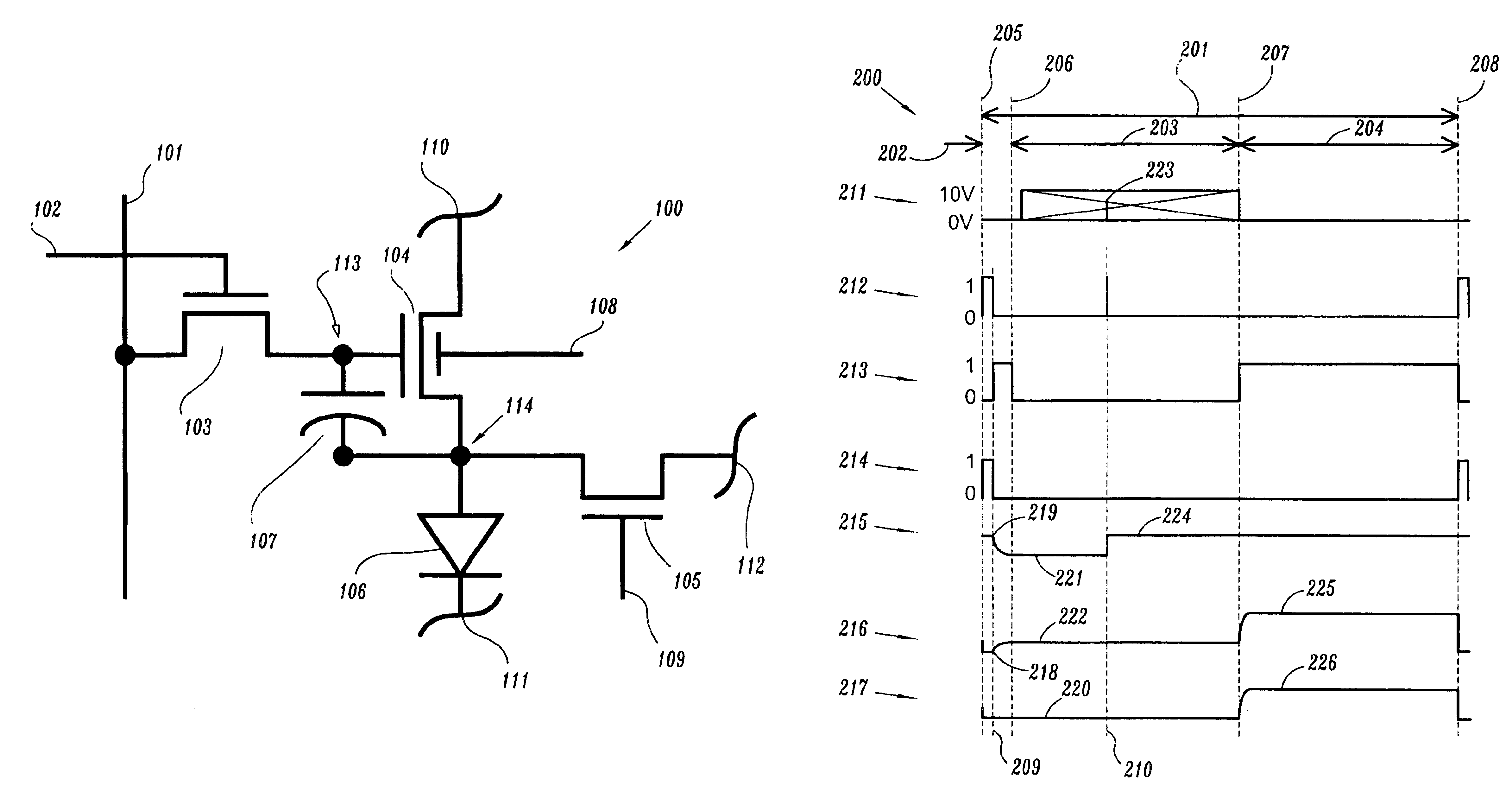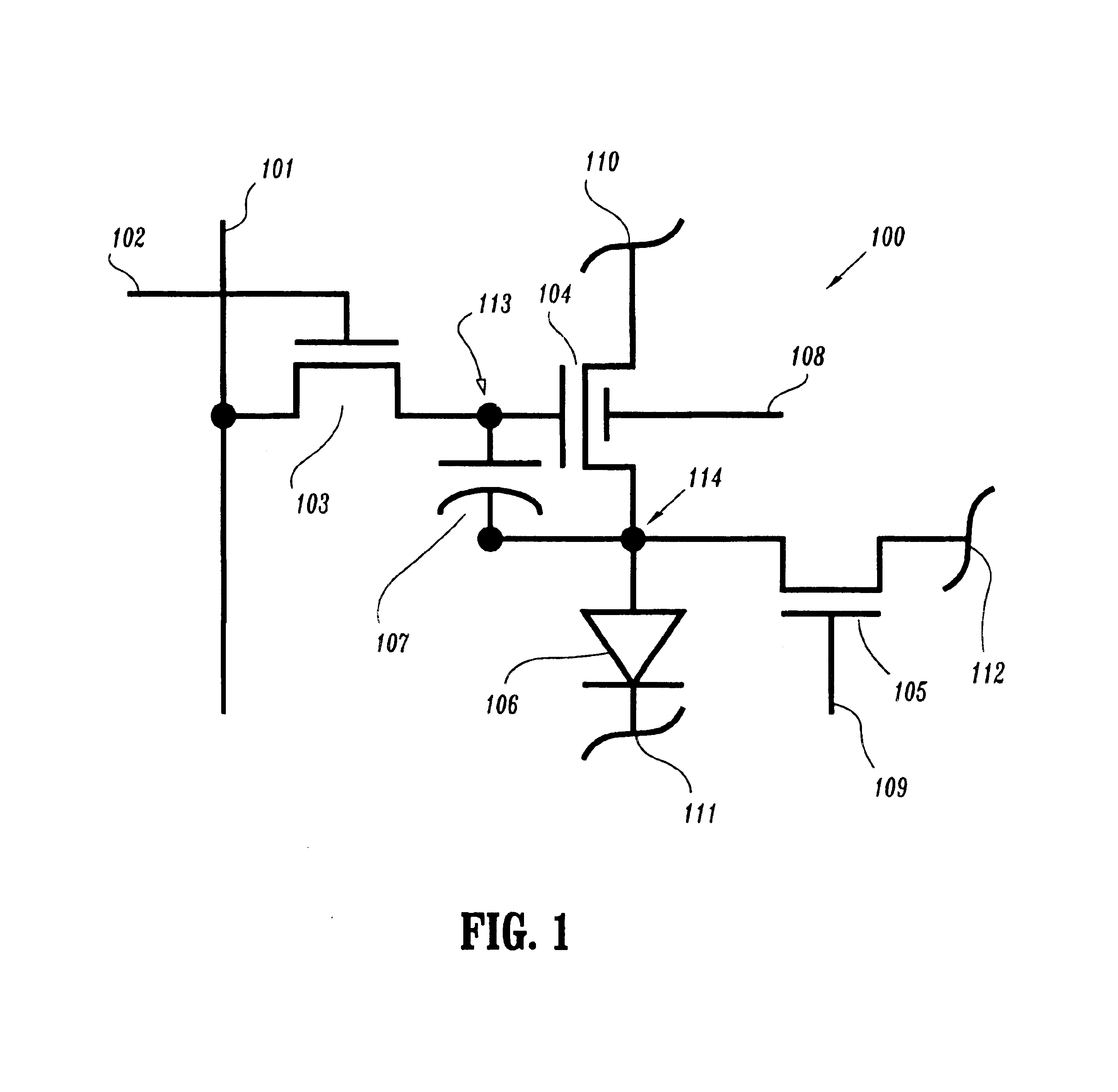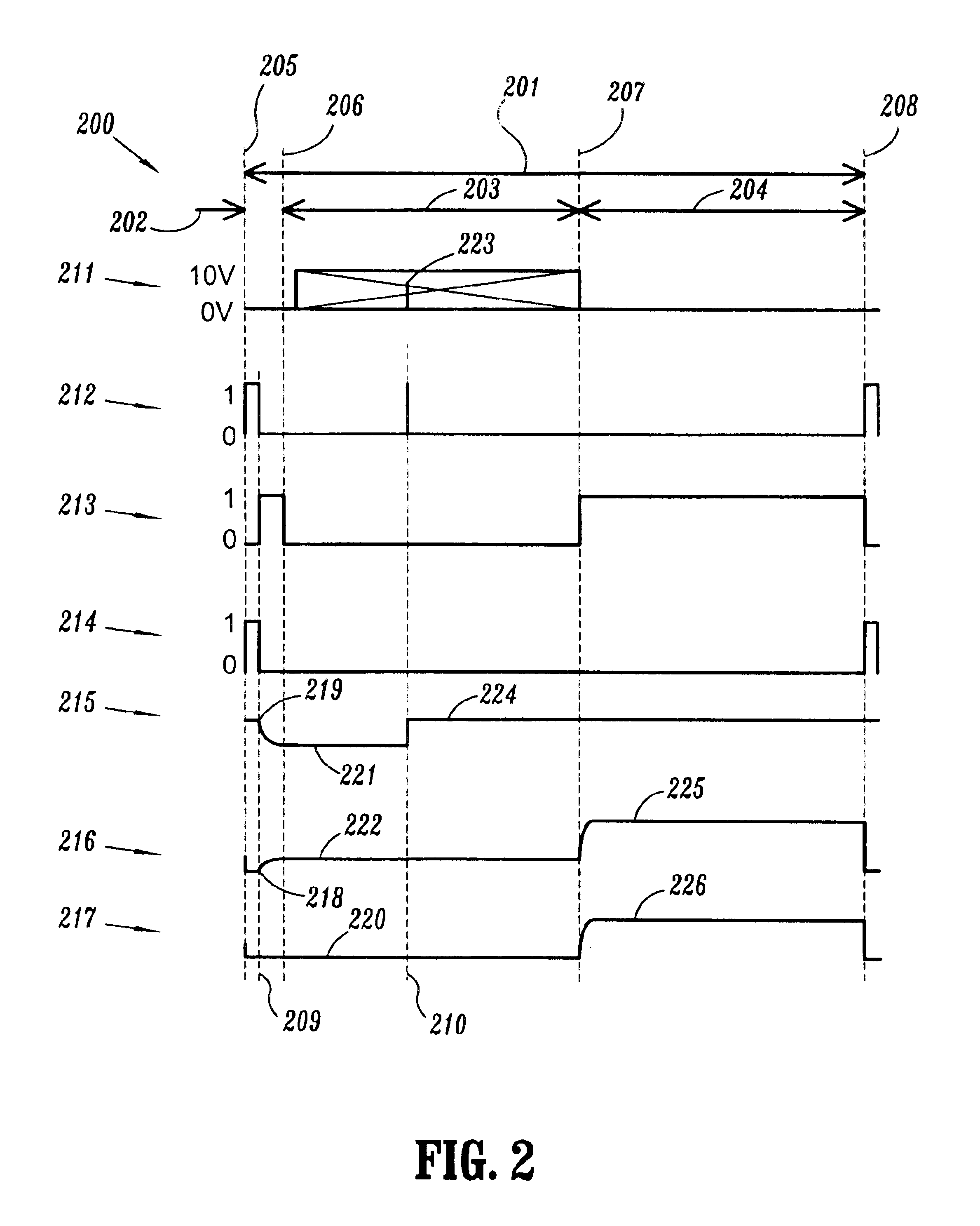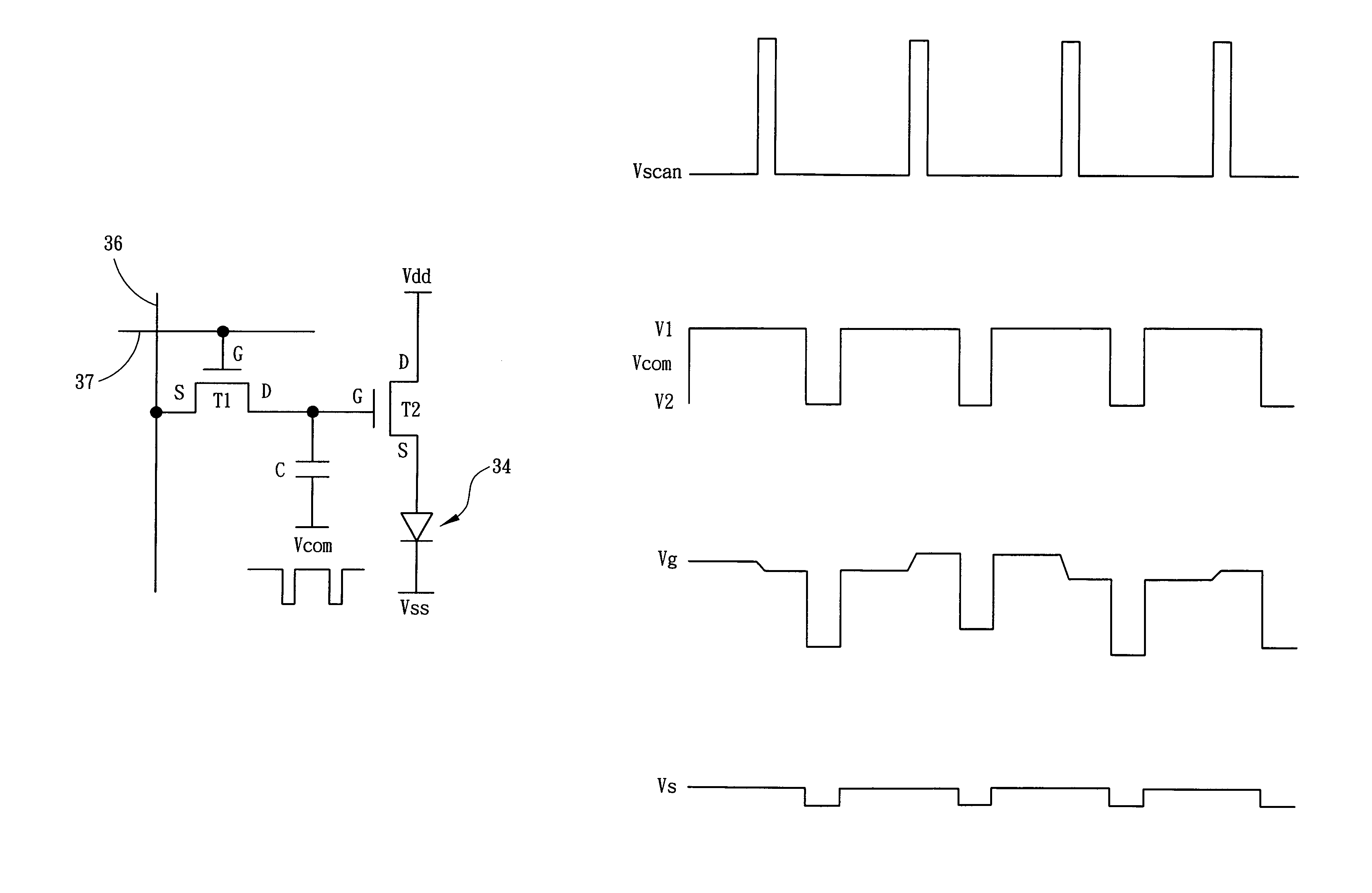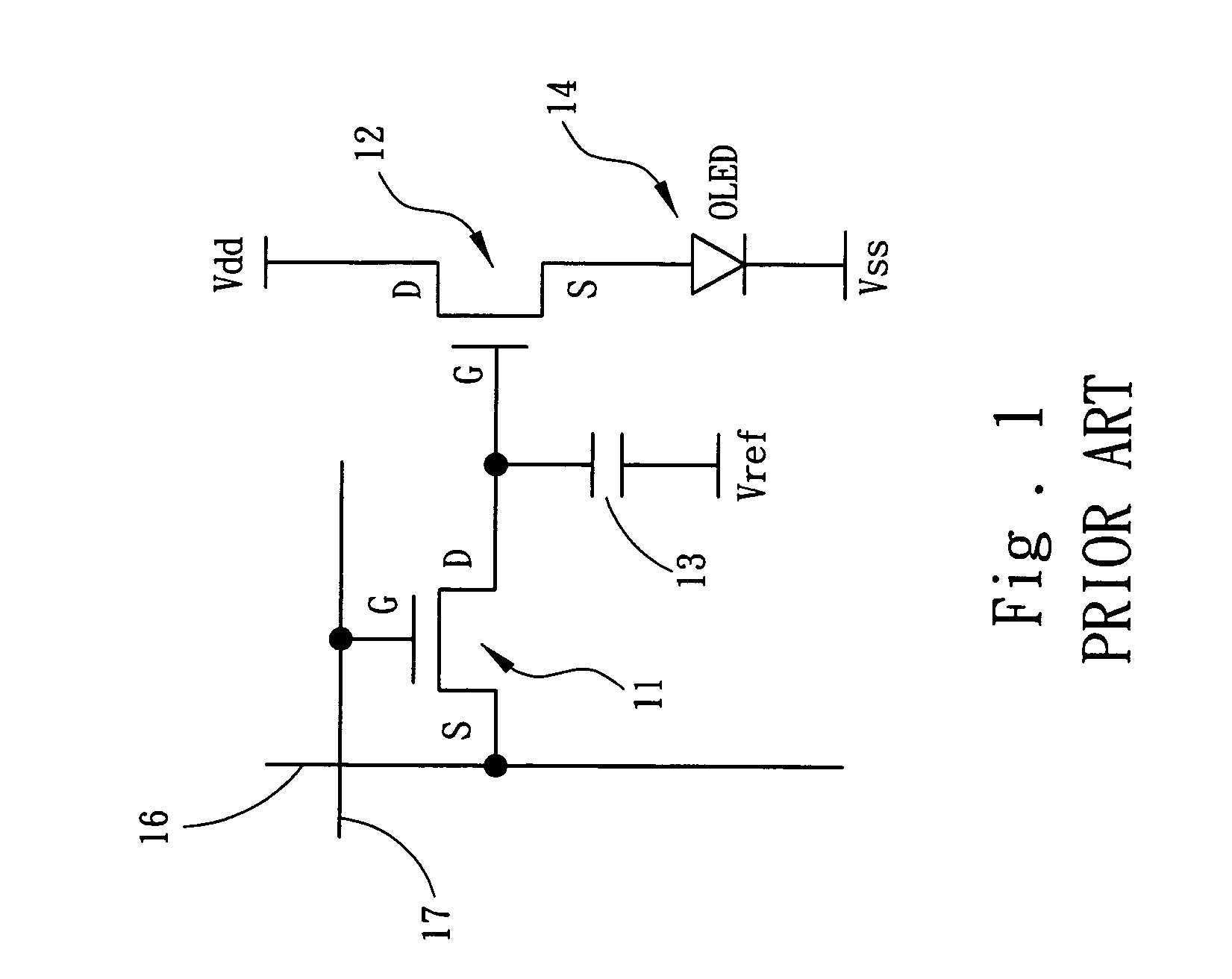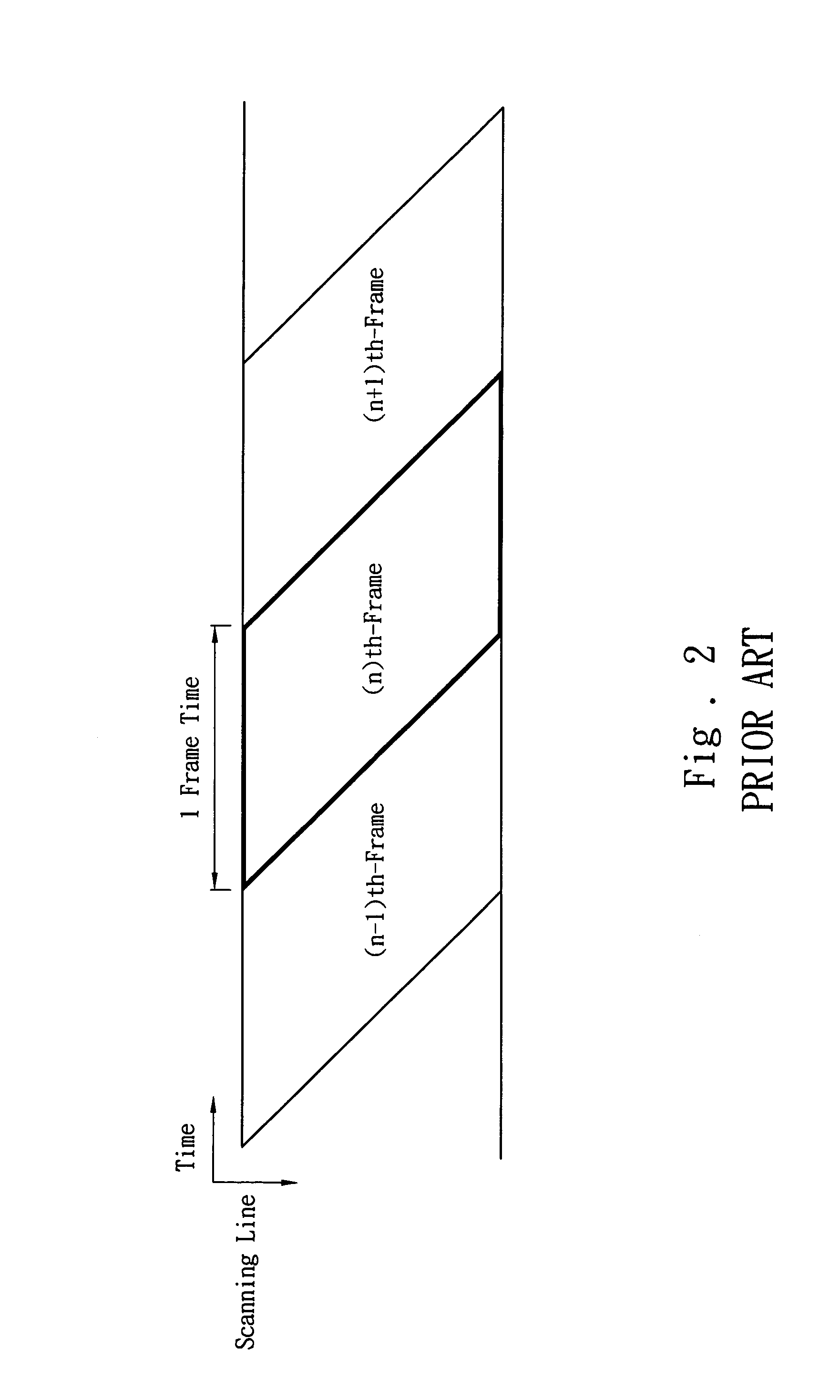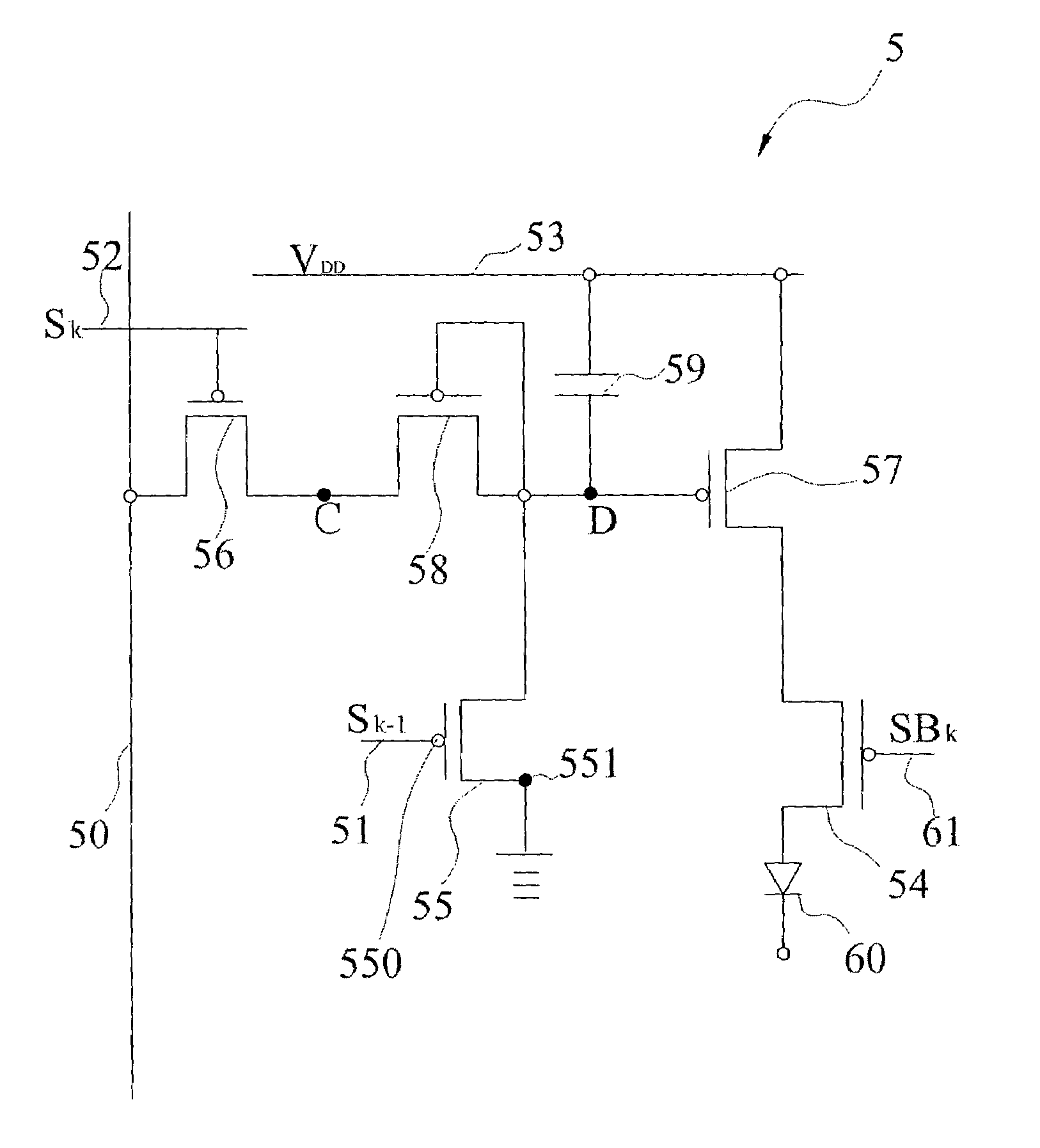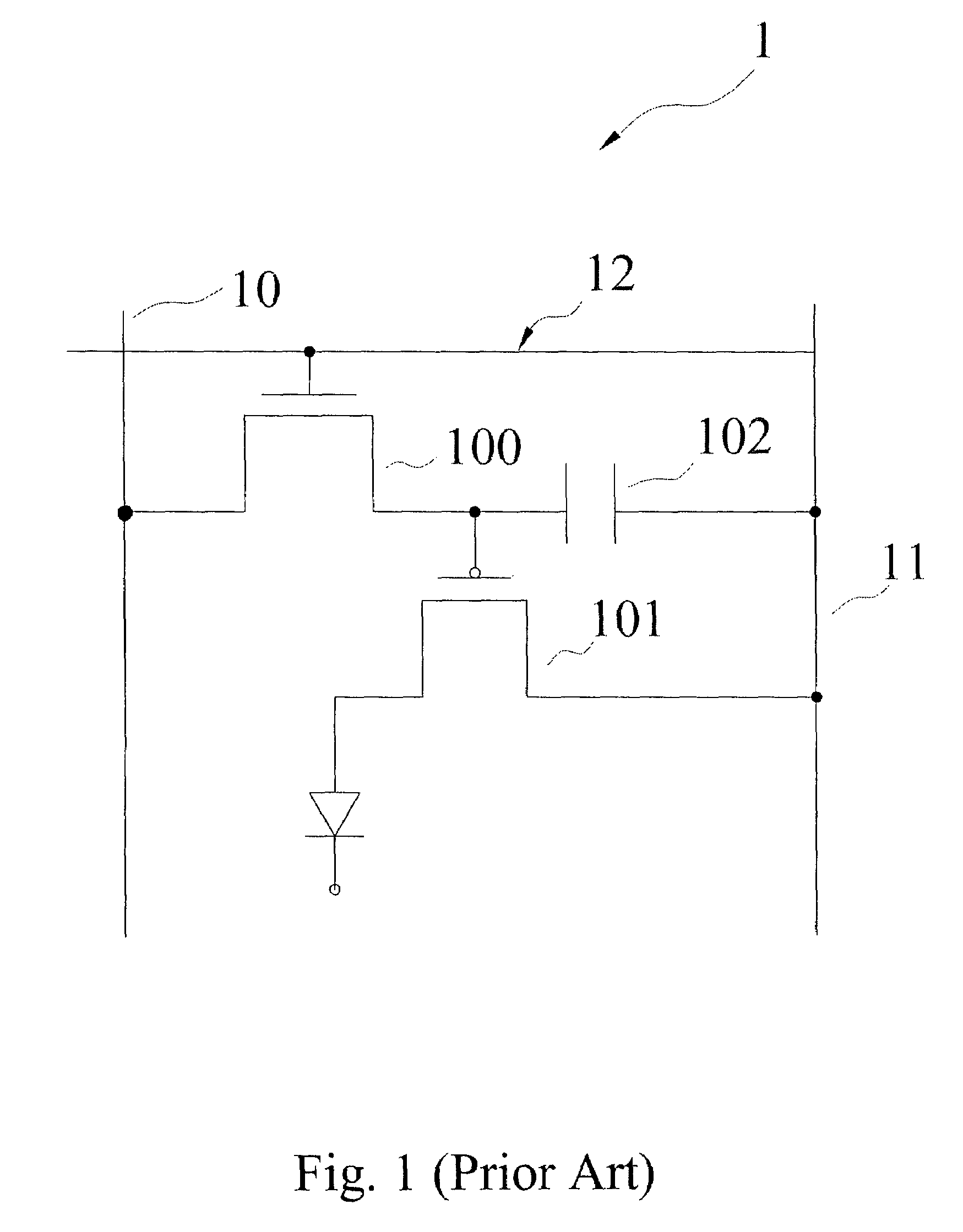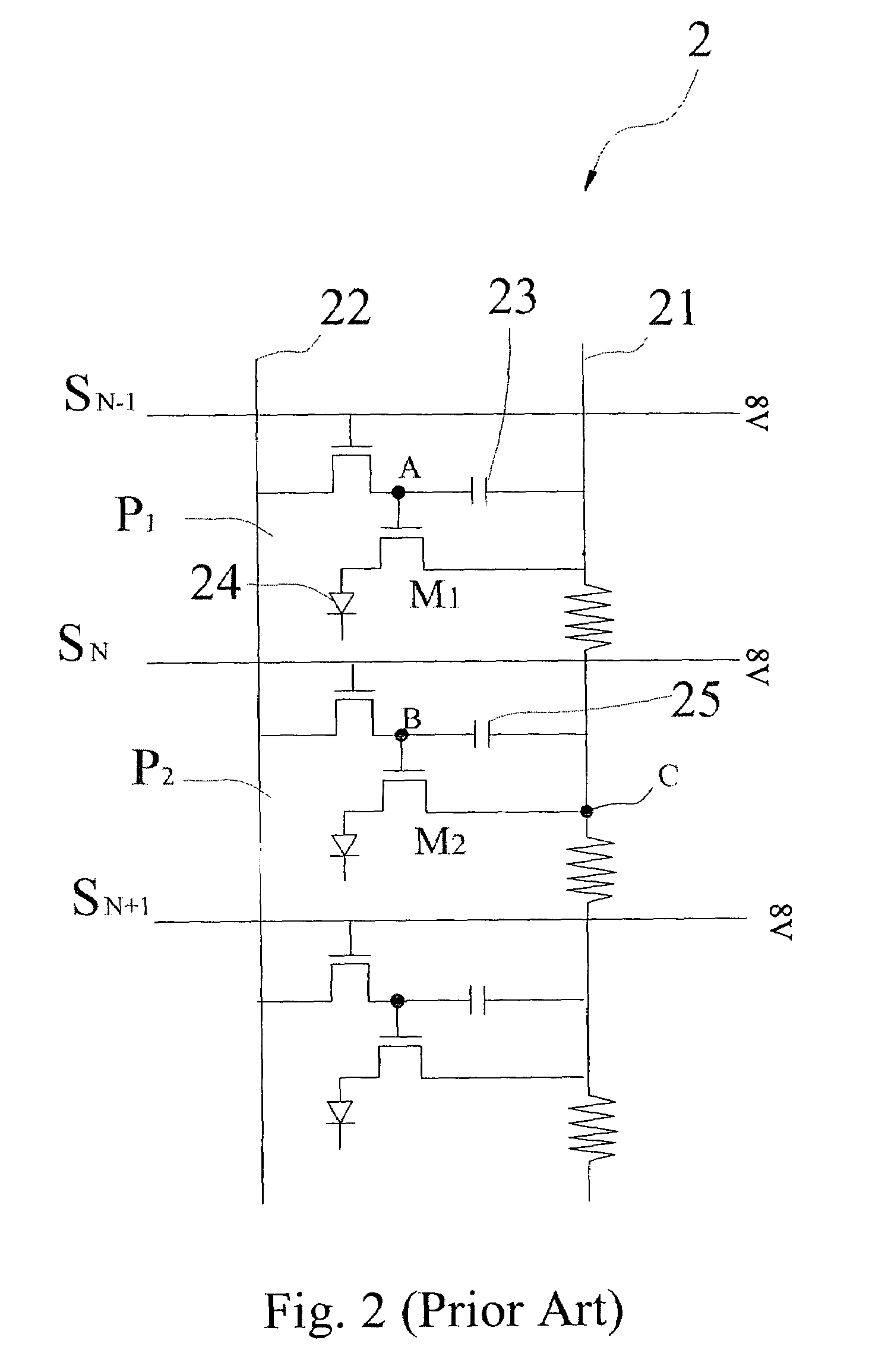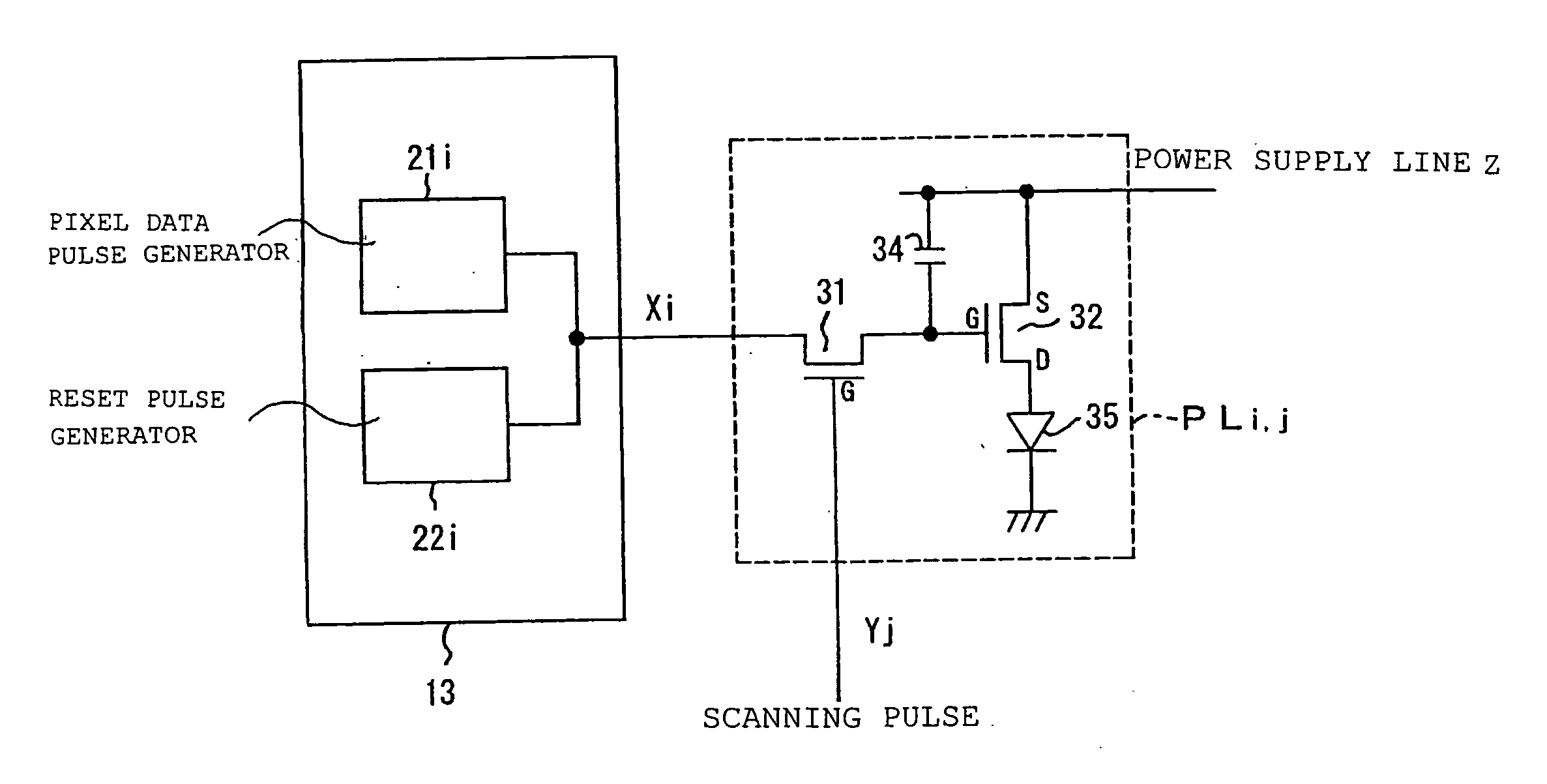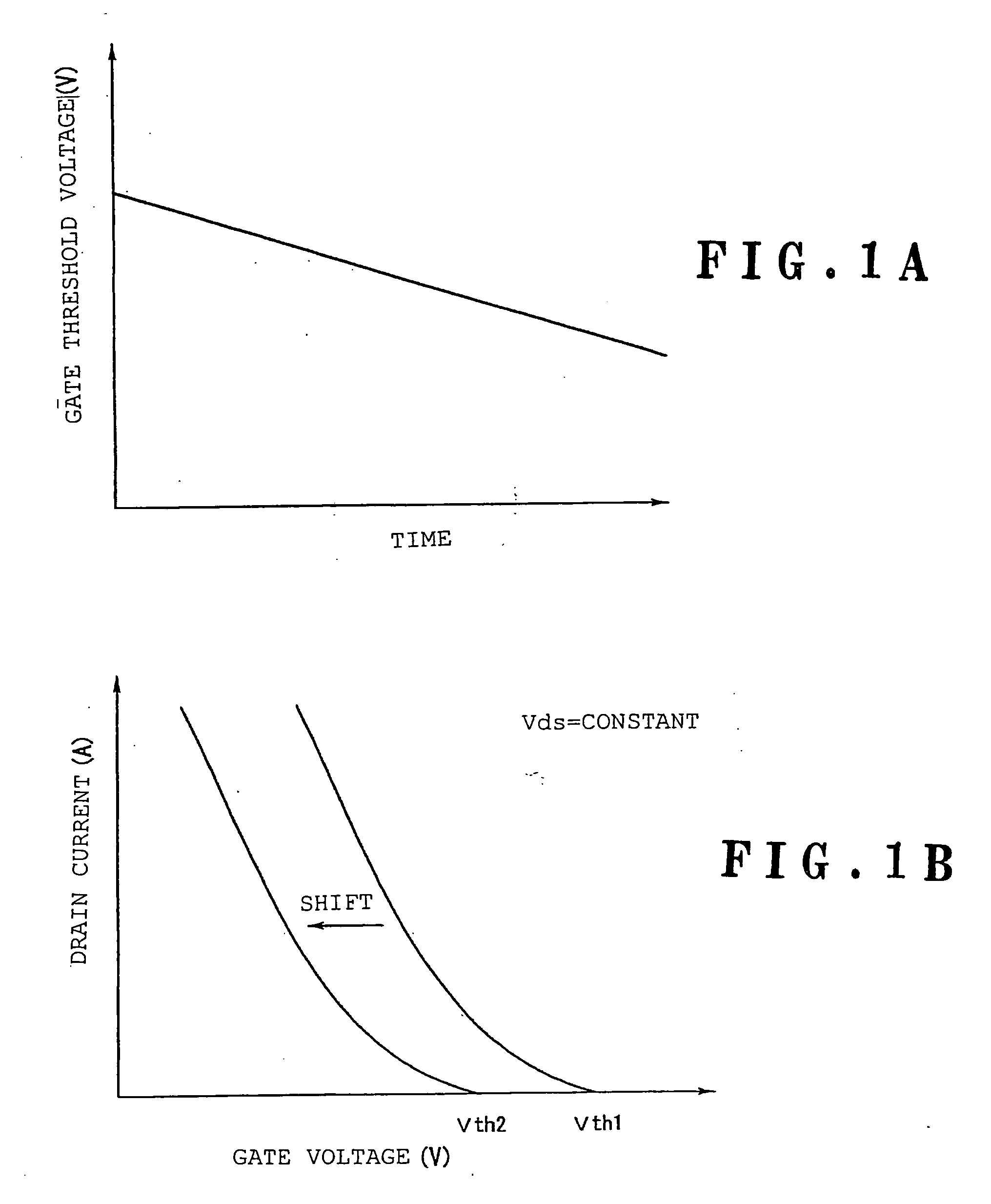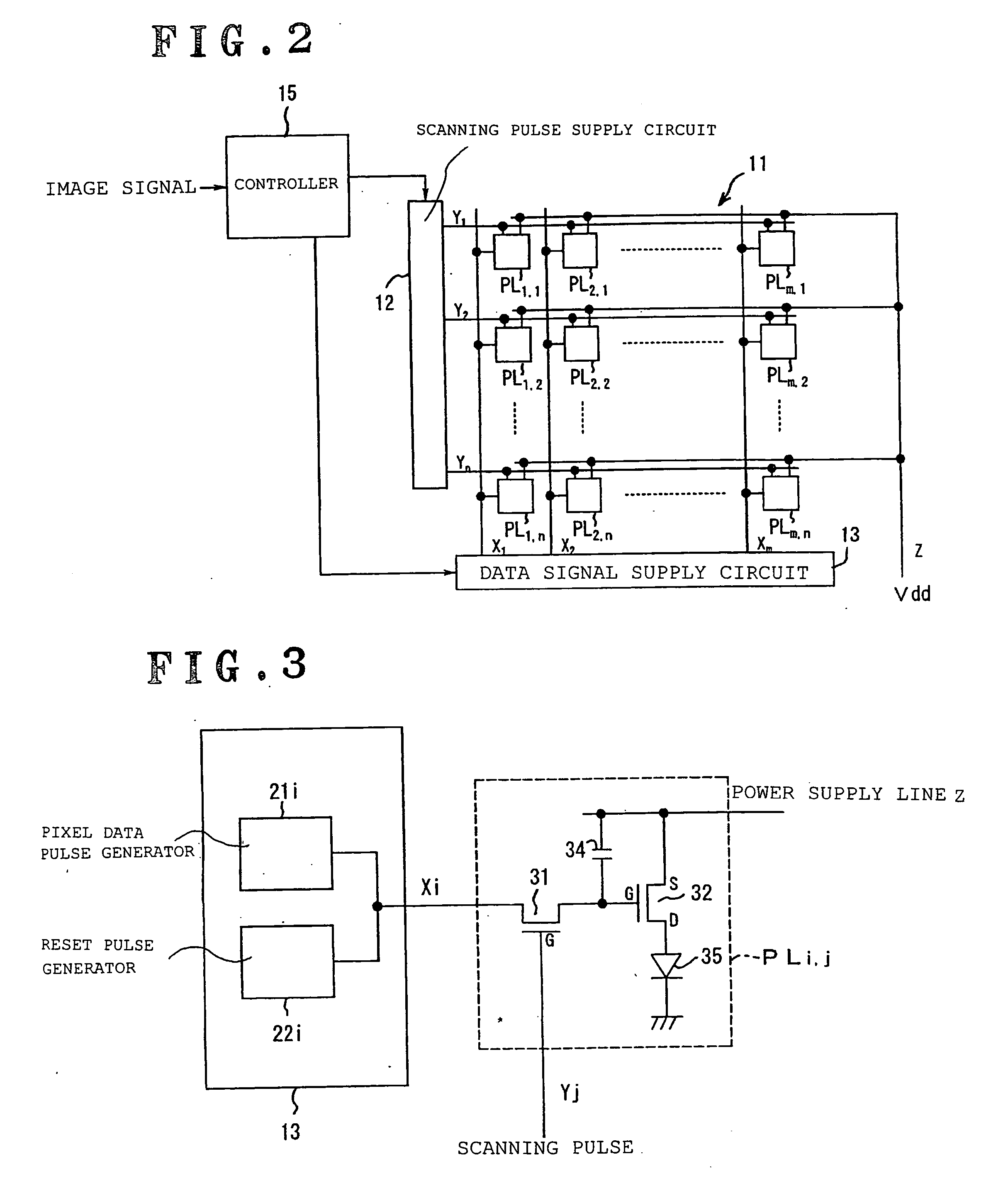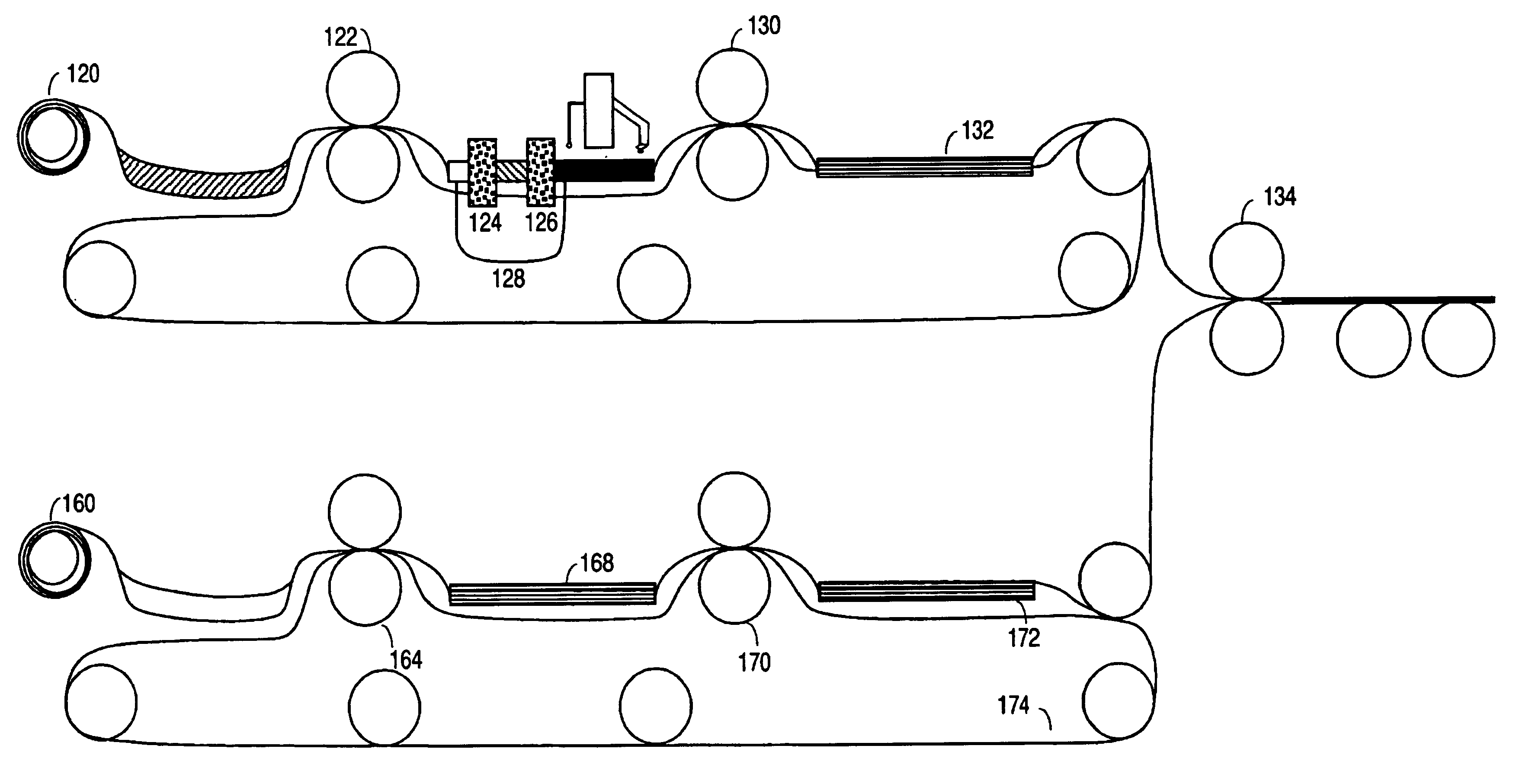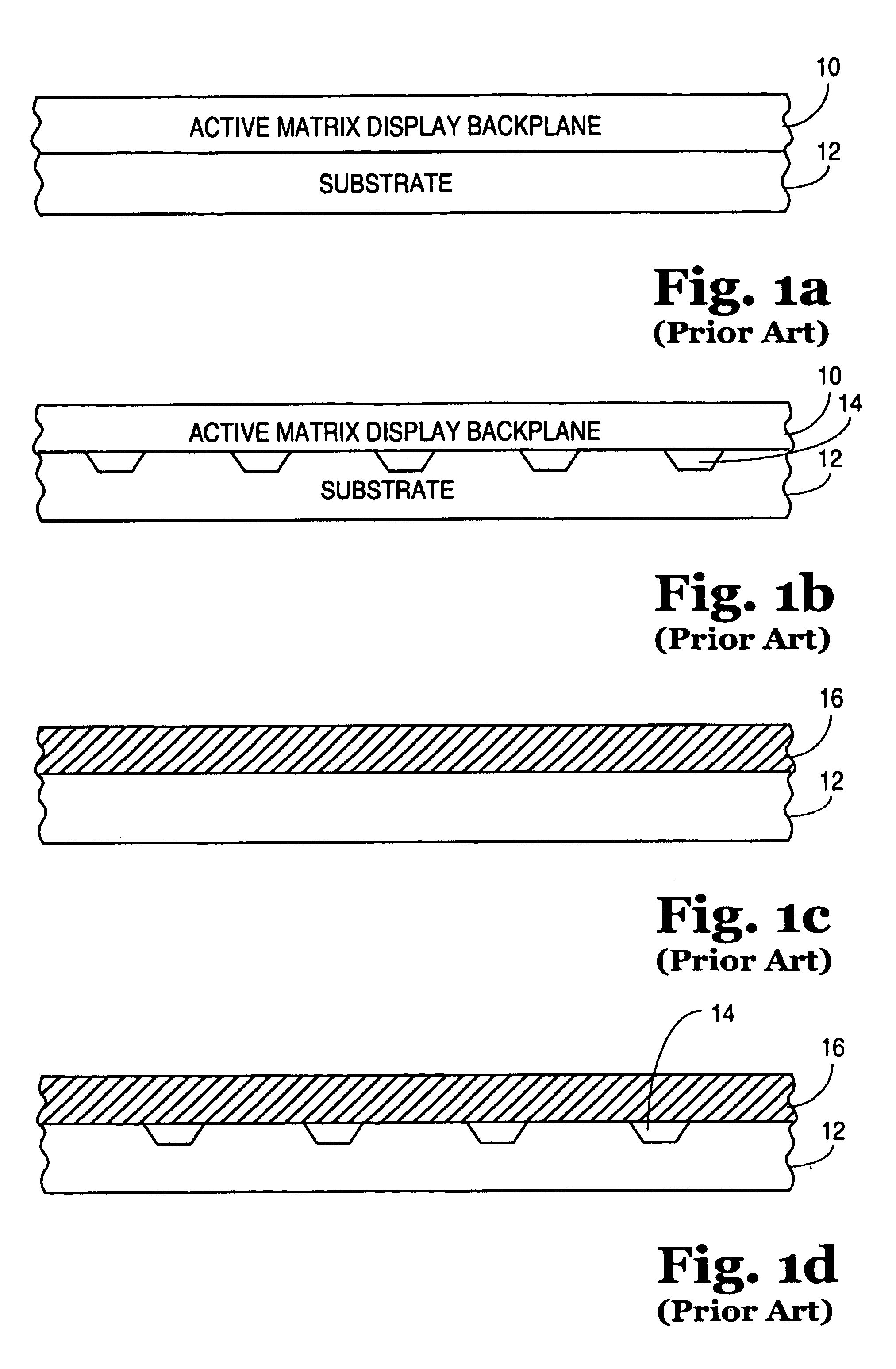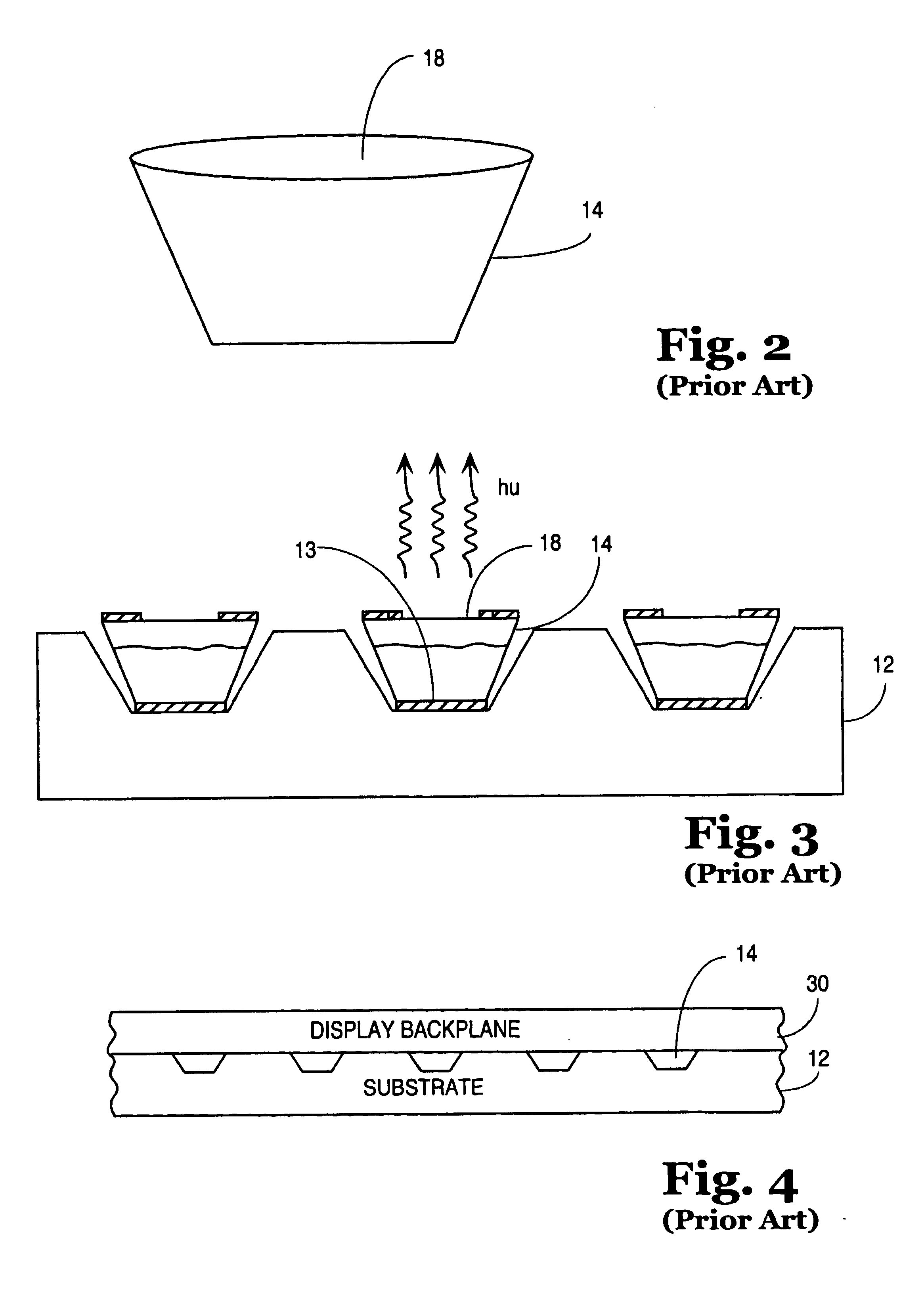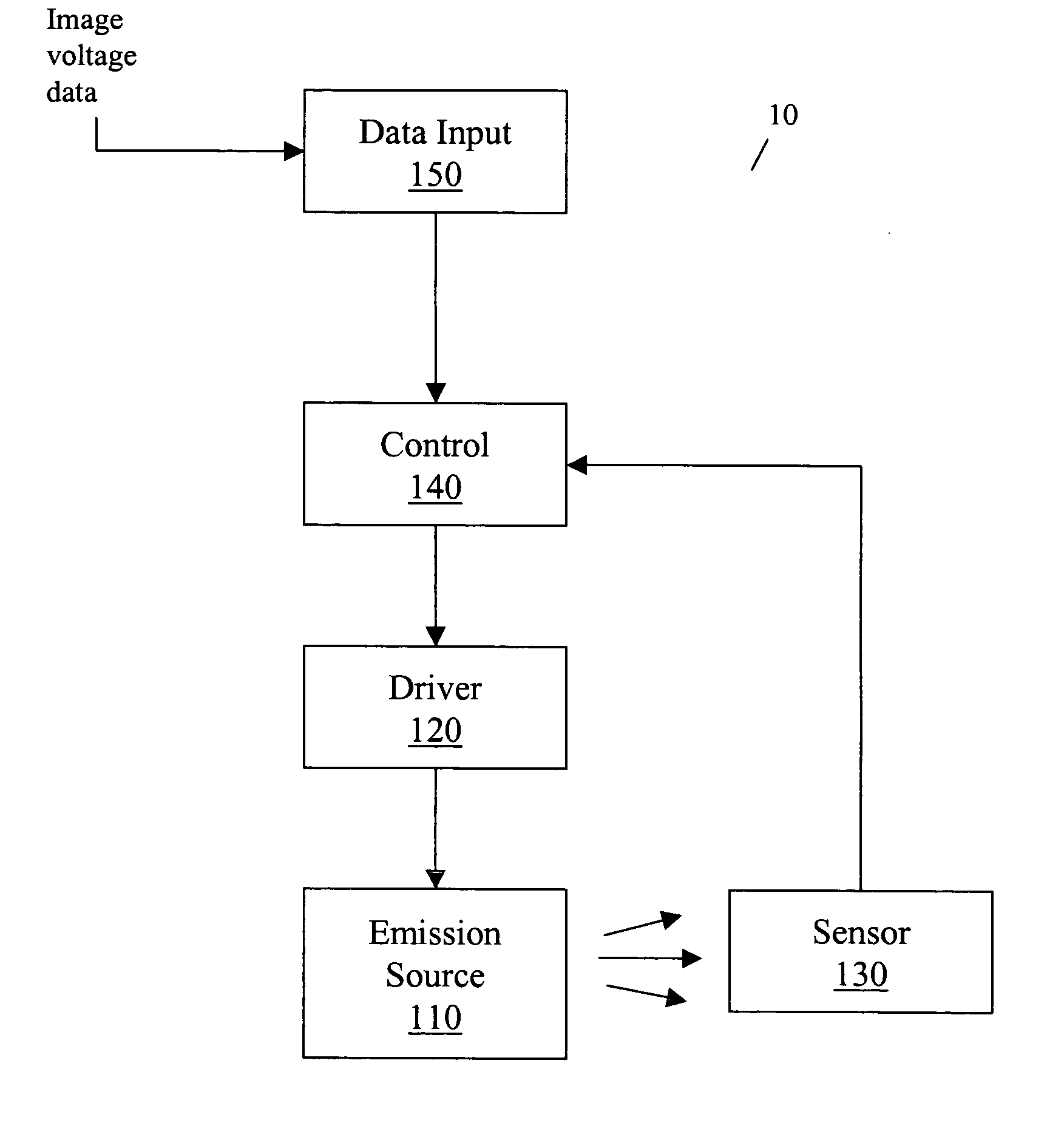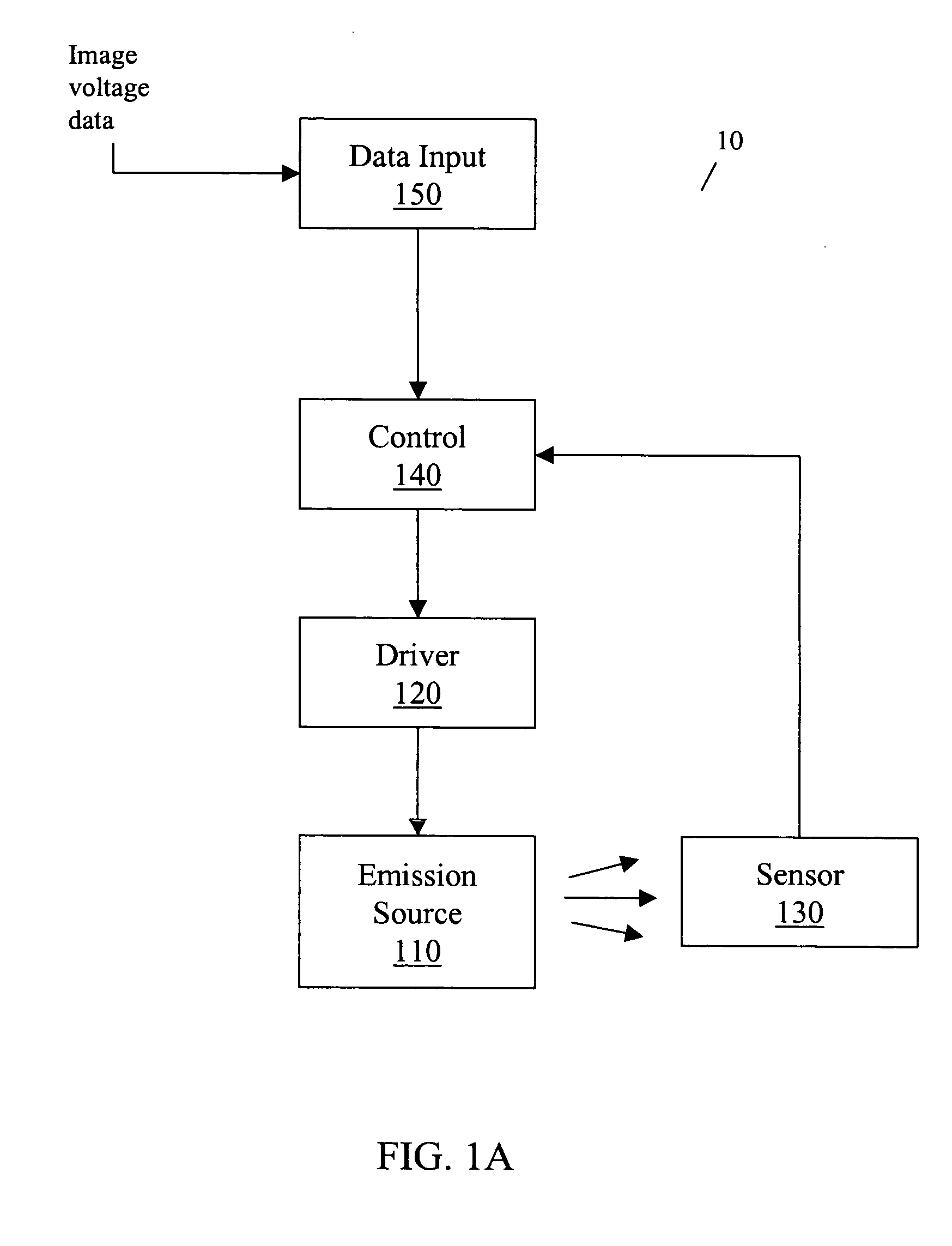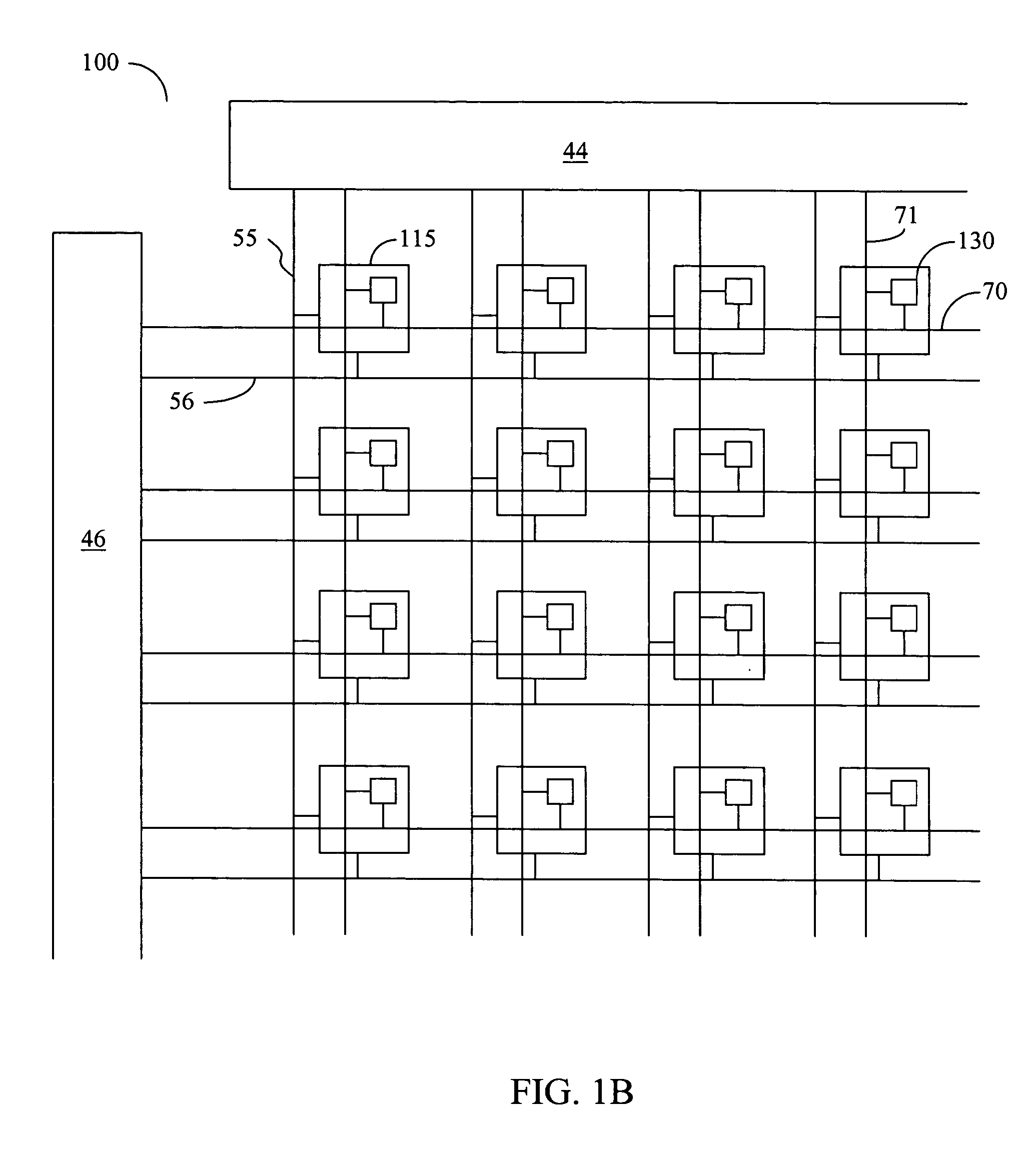Patents
Literature
3881 results about "Active matrix" patented technology
Efficacy Topic
Property
Owner
Technical Advancement
Application Domain
Technology Topic
Technology Field Word
Patent Country/Region
Patent Type
Patent Status
Application Year
Inventor
Active matrix is a type of addressing scheme used in flat panel displays. In this method of switching individual elements (pixels), each pixel is attached to a transistor and capacitor actively maintaining the pixel state while other pixels are being addressed, in contrast with the older passive matrix technology in which each pixel must maintain its state passively, without being driven by circuitry.
Display
An active matrix display comprising a light control device and a field effect transistor for driving the light control device. The active layer of the field effect transistor comprises an amorphous.
Owner:CANON KK +2
Semiconductor Device and Method for Manufacturing the Same
ActiveUS20090134399A1Good step coverageThin thicknessDischarge tube luminescnet screensElectroluminescent light sourcesActive matrixMetal electrodes
A manufacturing method of an active matrix light emitting device in which the active matrix light emitting device can be manufactured in a shorter time with high yield at low cost compared with conventional ones will be provided. It is a feature of the present invention that a layered structure is employed for a metal electrode which is formed in contact with or is electrically connected to a semiconductor layer of each TFT arranged in a pixel area of an active matrix light emitting device. Further, the metal electrode is partially etched and used as a first electrode of a light emitting element. A buffer layer, a layer containing an organic compound, and a second electrode layer are stacked over the first electrode.
Owner:SEMICON ENERGY LAB CO LTD
Method for fabricating pixel structure of active matrix organic light-emitting diode
ActiveUS20090068773A1Improve pixel aperture ratioIncrease the aperture ratioSolid-state devicesSemiconductor/solid-state device manufacturingActive matrixScan line
Owner:IND TECH RES INST
Display
Owner:CANON KK +2
Manufacturing method of active matrix substrate, active matrix substrate and liquid crystal display device
InactiveUSRE38466E1Property for applicationMaintain good propertiesSolid-state devicesSemiconductor/solid-state device manufacturingLiquid-crystal displayActive matrix
A method of manufacturing an active matrix substrate is provided that uses a technique of transferring a thin film device. In forming thin film transistors and pixel electrodes on an original substrate before transfer, an insulator film such as an interlayer insulation film or the like, is previously removed before the pixel electrodes are formed. Further, the original substrate is separated by exfoliation to transfer the device to a transfer material to cause the pixel electrodes to partially appear in the surface or the vicinity of the surface of the device. This portion permits application of a voltage to a liquid crystal through the pixel electrode.
Owner:SAMSUNG ELECTRONICS CO LTD
Organic el display device having an improved image quality
InactiveUS6246180B1Static indicating devicesElectroluminescent light sourcesVoltage converterImaging quality
A drive unit for driving a corresponding one of organic EL elements of an active matrix EL display device includes a blanking switch for blanking the video signal stored in a storage capacitor in each frame period before the start of the next frame period. A drive transistor drives a corresponding EL element based on the correct current supplied for this If the video signal is a current signal, a transistor operating as a current-voltage converter is provided
Owner:GOLD CHARM LTD
Pixel circuit, active matrix apparatus and display apparatus
ActiveUS20050269959A1Low costLuminance of light emission can be fixedStatic indicating devicesSolid-state devicesElectricityActive matrix
A pixel circuit having a function of compensating for characteristic variation of an electro-optical element and threshold voltage variation of a transistor is formed from a reduced number of component elements. The pixel circuit includes an electro-optical element, a holding capacitor, and five N-channel thin film transistors including a sampling transistor, a drive transistor, a switching transistor, and first and second detection transistors. The sampling transistor samples and supplies an input signal from a signal line so as to be held into the holding capacitor. The driving transistor drives the electro-optical element with current in response to the held signal potential. The first and second detection transistors detect a threshold voltage of the drive transistor and supply the detected voltage into the holding capacitor in order to cancel an influence of the threshold voltage in advance.
Owner:SONY CORP
Use of a storage capacitor to enhance the performance of an active matrix driven electronic display
InactiveUS7176880B2Reduce voltageTransistorStatic indicating devicesElectrical conductorActive matrix
A system and method of use of a storage capacitor to improve the appearance and addressing characteristics of an electronically driven display. The capacitor is formed by the overlap of portions of electrodes used to address different pixels, or by the overlap of an addressing line and a conductor. An insulator layer situated between the capacitor electrodes can be the same insulator layer present in an FET transistor used to address the pixel. Methods of use of capacitors to achieve improved display addressing are disclosed.
Owner:E INK CORPORATION
Active matrix display
InactiveUS6359606B1Improve display qualityDischarge tube luminescnet screensElectroluminescent light sourcesTectorial membraneActive matrix
In an active matrix display device, each pixel is provided with a pixel electrode, an organic semiconductor film deposited on the upper layer side of the pixel electrode, and a thin film luminescent element provided with an opposing electrode formed on the upper layer side of the organic semiconductor film. A protective film covering almost the entire surface of a substrate is formed on the upper layer of the opposing electrode. The protective film prevents the entry of moisture or oxygen to inhibit the deterioration of the thin film luminescent element.
Owner:INTELLECTUAL KEYSTONE TECH LLC
Active-matrix-driven display device
InactiveUS20060022305A1Reduce Brightness VariationsReduce power consumptionTransistorStatic indicating devicesCapacitanceControl signal
In a display panel, each pixel has a display element that emits light when fed with electric power, a writing transistor, a driving transistor that drives the display element, a first capacitive element that is provided in series with a line connecting the second electrode of the writing transistor and the control electrode of the driving transistor, and an adjustment transistor that, during a reset period, is turned on to feed a voltage commensurate with the electrode-to-electrode voltage of the display element to the writing-transistor-side electrode of the first capacitive element. A control signal generation circuit is provided that, during the reset period, lets a voltage commensurate with the light emission start electrode-to-electrode voltage of the display element be held in the first capacitive element.
Owner:SANYO ELECTRIC CO LTD
Thin film device transfer method, thin film device, thin film integrated circuit device, active matrix board, liquid crystal display, and electronic apparatus
A thin film device fabrication method in which a thin film device formed on a substrate are transferred to a primary destination-of-transfer part and then the thin film device is transferred to a secondary destination-of-transfer part. A first separation layer (120) made of such a material as amorphous silicon is provided on a substrate (100) which allows passage of laser. A thin film device (140) such as TFTs are formed on the substrate (100). Further, a second separation layer (160) such as a hot-melt adhesive layer is formed on the thin film devices (140), and a primary destination-of-transfer part (180) is mounted thereon. The bonding strength of the first separation layer is weakened by irradiation with light, and the substrate (100) is removed. Thus, the thin film device (140) is transferred to the primary destination-of-transfer part. Then, a secondary destination-of-transfer part (200) is attached onto the bottom of an exposed part of the thin film device (140) via an adhesive layer (190). Thereafter, the bonding strength of the second separation layer is weakened by such means as thermal fusion, and the primary destination-of-transfer part is removed. In this manner, the thin film device (140) can be transferred to the secondary destination-of-transfer part (200) while maintaining layering relationship with respect to the substrate (100).
Owner:SAMSUNG ELECTRONICS CO LTD
Active matrix electro-luminescent display thin film transistor
InactiveUS6239470B1Improve performanceSolve the real problemTransistorSemiconductor/solid-state device detailsCapacitanceActive matrix
A resin material having a small relative dielectric constant is used as a layer insulation film 114. The resin material has a flat surface. A black matrix or masking film for thin film transistors is formed thereon using a metal material. Such a configuration prevents the problem of a capacity generated between the masking film and a thin film transistor.
Owner:SEMICON ENERGY LAB CO LTD
Active-matrix light emitting display and method for obtaining threshold voltage compensation for same
ActiveUS20050067970A1Cathode-ray tube indicatorsInput/output processes for data processingCapacitanceActive matrix
An active matrix display includes a plurality of pixels arranged in an array, a first transistor and a second transistor associated with each pixel, the first and second transistors positioned within the array for controlling current flow through each pixel, a light emitting diode associated with each pixel; and a storage capacitor associated with each pixel, wherein, during a time period for establishment of a threshold voltage on the storage capacitor for the first transistor, a voltage equal to the sum of the threshold voltage and a voltage for compensating for turnoff of the second transistor is established on the storage. capacitor.
Owner:TWITTER INC
Method and apparatus for controlling an active matrix display
ActiveUS7106285B2Cathode-ray tube indicatorsInput/output processes for data processingControl signalActive matrix
A method of controlling an array of pixels in an active matrix display to a predetermined emission level is provided. The pixels are arranged in a plurality of rows and a plurality of columns, each pixel having an active matrix element. The method makes use of a plurality of sensors each having a measurable sensor parameter and at least one pixel driver. Light emission is varied from a plurality of pixels in a first row using the pixel driver and the active matrix elements in the pixels. Light emission is received from the pixels at the sensors and a measured value of the measurable sensor parameter is obtained responsive to the received light emission. For each of the plurality of pixels, a control signal is generated for the pixel to maintain constant emission from the light source at the predetermined emission level.
Owner:SILICONFILE TECH INC
Pixel circuit, active matrix apparatus and display apparatus
Owner:SONY CORP
Method and system for programming and driving active matrix light emitting devcie pixel
Method and system for programming and driving active matrix light emitting device pixel is provided. The pixel is a voltage programmed pixel circuit, and has a light emitting device, a driving transistor and a storage capacitor. The pixel has a programming cycle having a plurality of operating cycles, and a driving cycle. During the programming cycle, the voltage of the connection between the OLED and the driving transistor is controlled so that the desired gate-source voltage of a driving transistor is stored in a storage capacitor.
Owner:IGNIS INNOVATION
Light emitting device
An active matrix light emitting device which is capable of clear color display of multiple gray scales is provided. The light emitting device has a pixel portion, and the pixel portion has a plurality of pixels. Each of the plurality of pixels has an EL element, a first EL driver TFT, a second EL driver TFT, a switching TFT, and an erasure TFT. The first EL driver TFT and the second EL driver TFT are connected in parallel.
Owner:SEMICON ENERGY LAB CO LTD
Active-matrix display, the emitters of which are supplied by voltage-controlled current generators
The display comprises an array of pixel circuits each comprising an emitter 1 in series with a current modulation transistor, and at least one address circuit, which integrates, for each column, a differential amplifier and a passive element preferably a resistive element, which cooperate with the current modulation transistors so as to form, during address phases in which the emitters are switched “out of the circuit”, a voltage-programmable current generator. After the address phases, thanks to a suitable switch, the emitters are switched “into the circuit” and supplied with the preprogrammed current. Such a display allows the image display quality to be inexpensively improved.
Owner:INTERDIGITAL CE PATENT HLDG
Electroluminescent display devices
InactiveUS7554512B2Static indicating devicesMultiple digital computer combinationsElectricityActive matrix
An active matrix electroluminescent display device has a current sampling resistor within each pixel in series with the display element. A feedback signal represents the voltage drop across the current sampling resistor and the pixel drive signals are modified in dependence on the feedback signal to control the current driven through the display element. In this way, threshold compensation is provided, whilst enabling a single voltage-driven drive transistor to be employed.
Owner:INNOLUX CORP
Semiconductor device
InactiveUS6147667ASolid-state devicesSemiconductor/solid-state device manufacturingDriver circuitActive matrix
A systemized active matrix display in which a pixel matrix circuit, a driver circuit and a logic circuit are mounted on the same substrate, is formed. A TFT of the present invention has such characteristics as to be able to operate in a wide driving frequency range of 0.05 to 2 GHz, and by designing a channel length and a film thickness of a gate insulating film of the TFT according to characteristics required by circuits, it is possible to form a high frequency driving circuit and a low frequency driving circuit on the same substrate.
Owner:SEMICON ENERGY LAB CO LTD
Semiconductor thin film, method for manufacturing the same, thin film transistor, and active-matrix-driven display panel
ActiveUS7998372B2Hardly erroneously operatesSmall currentNanotechConductive materialIndiumActive matrix
Disclosed is a semiconductor thin film which can be formed at a relatively low temperature even on a flexible resin substrate. Since the semiconductor thin film is stable to visible light and has high device characteristics such as transistor characteristics, in the case where the semiconductor thin film is used as a switching device for driving a display, even when overlapped with a pixel part, the luminance of a display panel does not deteriorate. Specifically, a transparent semiconductor thin film 40 is produced by forming an amorphous film containing zinc oxide and indium oxide and then oxidizing the film so that the resulting film has a carrier density of 10+17 cm−3 or less, a Hall mobility of 2 cm2 / V·sec or higher, and an energy band gap of 2.4 EV or more.
Owner:IDEMITSU KOSAN CO LTD
Semiconductor device with tapered gate and insulating film
InactiveUS6646287B1Reduce in quantityReduce manufacturing costTransistorSolid-state devicesContact formationActive matrix
In a semiconductor device, typically an active matrix display device, the structure of TFTs arranged in the respective circuits are made suitable in accordance with the function of the circuit, and along with improving the operating characteristics and the reliability of the semiconductor device, the manufacturing cost is reduced and the yield is increased by reducing the number of process steps. A semiconductor device has a semiconductor layer, an insulating film formed contacting the semiconductor layer, and a gate electrode having a tapered portion on the insulating film, in the semiconductor device, the semiconductor layer has a channel forming region, a first impurity region for forming a source region or a drain region and containing a single conductivity type impurity element, and a second impurity region for forming an LDD region contacting the channel forming region, a portion of the second impurity region is formed overlapping a gate electrode, and the concentration of the single conductivity type impurity element contained in the second impurity region becomes larger with distance from the channel forming region.
Owner:SEMICON ENERGY LAB CO LTD
Display Device with Touch Sensor, and Drive Method for the Device
InactiveUS20070262966A1Raise the ratioImprove position detection accuracyInput/output processes for data processingActive matrixDisplay device
A touch-sensored display device 20 according to the present invention includes: a counter substrate 6 disposed on a viewer side of an active matrix substrate 8 via a display medium layer 4, the counter substrate 6 having a counter electrode 5 which opposes pixel electrodes; a display panel driving circuit 14 for supplying to the counter electrode 5 a common voltage which undergoes periodic inversion in polarity; a transparent conductive film 7 for position detection placed so as to oppose the counter electrode 5 via the counter substrate 6; a strobe signal generation circuit 32 for generating a strobe signal which is in synchronization with a polarity inversion period of the common voltage, and a noise-cut current signal generation circuit 30 for generating a noise-cut current signal which is obtained by eliminating based on the strobe signal a predetermined portion from a current flowing from a terminal connected to the transparent conductive film 7 for position detection.
Owner:SHARP KK
Active matrix display
An active matrix display includes a substrate, a video signal line on the substrate, first and second power lines on the substrate, a self-emitting element having two display electrodes facing each other and connected to one of the first and second power lines, a drive transistor connected between the first power line and one of the display electrodes, a storage capacitor having a first electrode connected to a gate electrode of the drive transistor and a second electrode facing the first electrode with interposing an insulating layer, the storage capacitor and the gate electrode of the drive transistor being arranged under the display electrode, and a shield electrode arranged between the display electrode connected to the drive transistor and at least one of the first electrode of the storage capacitor and the gate electrode with interposing an insulating layer, and set at a constant potential.
Owner:JAPAN DISPLAY CENTRAL CO LTD
Active-matrix light emitting display and method for obtaining threshold voltage compensation for same
ActiveUS7038392B2Cathode-ray tube indicatorsInput/output processes for data processingActive matrixEngineering
An active matrix display includes a plurality of pixels arranged in an array, a first transistor and a second transistor associated with each pixel, the first and second transistors positioned within the array for controlling current flow through each pixel, a light emitting diode associated with each pixel; and a storage capacitor associated with each pixel, wherein, during a time period for establishment of a threshold voltage on the storage capacitor for the first transistor, a voltage equal to the sum of the threshold voltage and a voltage for compensating for turnoff of the second transistor is established on the storage capacitor.
Owner:TWITTER INC
Method of improving the stability of active matrix OLED displays driven by amorphous silicon thin-film transistors
InactiveUS7116058B2Improve driving stabilityEliminate unevennessElectrical apparatusCathode-ray tube indicatorsCapacitanceDriver circuit
A method of improving the stability of organic light emitting diode (OLED) display devices driven by amorphous silicon thin-film transistors, in which the driving circuitry within each sub-pixel includes a driving transistor for driving organic light emitting diode (OLED), a scanning transistor and a storage capacitance. An end of the capacitance is connected to the signal resetting line, which a resetting time pulse of high potential and low potential are supplied. Since the resetting signals within the sub-pixels are synchronized, a single voltage of the resetting signal can control the positive and negative stresses for each transistor in the sub-pixels on the panel.
Owner:WINTEX
Pixel circuit for active matrix OLED and driving method
ActiveUS7023408B2Avoid large current generationStatic indicating devicesElectroluminescent light sourcesCapacitanceLow voltage
A pixel circuit for active matrix OLED and driving method is proposed in this invention, which includes five transistors and one capacitance, it's mainly use a first-transistor connected to a control line to let a second transistor connected to the former scan line off when writing a low voltage in, so to avoid large current generation and IR-drop, finally the illumination will be more uniform than prior art.
Owner:IND TECH RES INST
Display apparatus with active matrix display panel, and method for driving same
InactiveUS20070080906A1Suppressing gate stressPrevent display quality degradationStatic indicating devicesActive matrixElectrical polarity
A display apparatus with an active matrix display panel which can suppress gate stress to prevent a degradation of the display quality. Specified at least one pixel section having a light emitting element to driven for light emission in one row is supplied with a data pulse indicative of a first gate voltage of a thin film transistor upon supply of a display scanning pulse. Subsequently, each pixel in the one row is supplied with a reset scanning pulse, and when supplying a reset scanning pulse, the at least one pixel section is supplied with a reset pulse indicative of a second gate voltage of the thin film transistor for making the polarity of agate-to-source voltage or gate-to-drain voltage of the thin film transistor reverse to that during light emission driving.
Owner:PIONEER CORP
Apparatuses and methods for flexible displays
InactiveUS6850312B2Solid-state devicesSemiconductor/solid-state device manufacturingDeterministic methodActive matrix
Apparatuses and methods for forming displays are claimed. One embodiment of the invention relates to forming a flexible active matrix display along a length of flexible substrate. Another embodiment of the invention relates to forming multiple flexible displays along a continuous flexible substrate. Another embodiment of the invention relates to forming a flexible display along a flexible reflective substrate. Another embodiment of the invention relates to using FSA generally with a flexible web process material. Another embodiment of the invention relates to using FSA and a deterministic method such as “pick and place” to place objects onto a rigid substrate or onto a web process material. Another embodiment of the invention relates to using web processing to deposit and / or pattern display material through an in-line process.
Owner:RUIZHANG TECH LTD CO
Stabilized active matrix emissive display
InactiveUS20050248515A1Eliminate needElectrical apparatusStatic indicating devicesActive matrixDisplay device
The embodiments of the present invention provide a flat panel display having a plurality of pixels, each comprising a light-emitting device configured to emit light in accordance with a current flowing through the light-emitting device, a transistor coupled to the light-emitting device and configured to provide the current through the light-emitting device, the current increasing with a ramp voltage applied to a control terminal of the transistor, and a switching device configured to switch off in response to the luminance of the light-emitting device having reached a specified level, thereby disconnecting the ramp voltage from the transistor and locking the brightness at the specified level. The ramp voltage is generated in each pixel instead of in peripheral circuits, thereby reducing the number of conducting lines in the display.
Owner:LEADIS TECH
Features
- R&D
- Intellectual Property
- Life Sciences
- Materials
- Tech Scout
Why Patsnap Eureka
- Unparalleled Data Quality
- Higher Quality Content
- 60% Fewer Hallucinations
Social media
Patsnap Eureka Blog
Learn More Browse by: Latest US Patents, China's latest patents, Technical Efficacy Thesaurus, Application Domain, Technology Topic, Popular Technical Reports.
© 2025 PatSnap. All rights reserved.Legal|Privacy policy|Modern Slavery Act Transparency Statement|Sitemap|About US| Contact US: help@patsnap.com
